#for the narrative it was important that among a cast of characters with parental issues
Explore tagged Tumblr posts
Text
I don’t know why it took me so much time to get what I didn’t like about “Wednesday” the tv series, but now I have the precise word to round up ALL the stuff I dislike about it in one adjective.
“Unimaginative”.
This show lacks originality.
Consider what are the most succesful and beloved part of the show - for example, the visuals are liked, and the dance-scene of Wednesday is of course one of the most popular things. But don’t you think these are liked because they are actually the most original and inventive parts of the show? Aka, they stand out due to truly being unique?
Because look at the rest of the story... A typical, done many-times, “monster school” setting with “clique divisions” for teenagers to be “among their own kind” - a la Harry Potter and Percy Jackson. With the twist that here we are in “I am not like any other girl / I am a dark, broody, cynic character against a cheerful and normal world” (which is even pushed further as even the “monster world” is shown to be cheerful and normal compared to Wednesday).
We have an overdone love triangle between cliche characters - and that’s not just me saying it, everybody pointed out how this thing was just no substance and “by-the-book” formulaic, robbing the characters of depths. We have this sort of typical, overdone “family drama” between a teenager and her parents, tied with the whole “family secrets to undiscover”. We have the very important, but very badly tackled issue of “so-called normal people that are just racist VS excentric unusual people that are just normal”. We have a villain that is not only the most generic and cliche villain (ancient puritan guy wanting to destroy all “non-normals” out of a warped sense of normality, and even contradicting himself by becoming what he hates the most ; plus of course the twist villain seen a mile away).
There are so many cliche elements, and overdone formula, and just... conventional, expected or “usual” stuff in this show - but not done with a real twist, not changed, played with - they are just played straigth, with no actual bold move, with no innovation, with no real effort. Which is sad because it is what makes the very cool concepts tied to the show lost...
When you look carefully enough, almost none of the characters have depths, and two third of the cast have no personality whatsoever and are only “plot-tools” that serve to drive forward the narrative. And when they do have depths, it either ends up confusing as they do not have consistant depths, or they have depths that contradict the weak attempts at world-building - because even worse that characters not having depth, the WORLD ITSELF has no depth. We do not understand, and cannot understand, how this world works, since it only throws superficial, “cool-looking”, “kids-like-this-these-days” things at us, but to the point of blatant plot hole or obvious contradictions. It all seems like they actually didn’t know which direction they wanted to go to - or rather that there were different people with different concepts and ideas for this show, and that they try to unite them, but couldn’t manage to bring a cohesive thing.
This show isn’t bold or innovative in any way - it is a literal “safe show”, but not even a “safe show” done right, it is a “safe show” done bad, to the point of making it all an empty, vapid, pretending, if not pointless form of entertainment that actually wastes the cool concepts, excellent actors and good characters it actually starts with. I know that I am sorry I discovered Jenna Ortega through this show - because she is a good Wednesday Addams, and I would have love to see her and her character in any other iteraton of the Addams Family.
There was also so much concept for the school and its students - but I have said enough about how badly this was all handled.
I do truly adhere to the theory that this show probably wasn’t originally an Addams Family project, only to be rebranded as one. Or rather, I do think it more likely that it might have started out as a true Addams Family project, but midway someone (I don’t know if it is a writer, or director, or producer) hijacked it into becoming their own separate project, originally unrelated but that they saw an opportunity of doing. It would explain the conflicting characterization and backstory, the strange mix of good and bad elements that clearly go off in different directions and atmospheres, the ultimately “empty” feel of this show that is torn in so many different directions, almost as if several different series had been surimpressed.
But if it turns out that no, it was an Addams Family project to begin with and never changed - if it turns out that it is all just due to bad writers that did not have any original ideas and just copied what was “trending among teens” these days - if it turns out that this show was just an excellent concept poorly executed by people without true heart or passion for this (I am speaking of behind-the-camera staff of course, the actors did their best, and sometimes managed to save this show)... Then if it turns out to be that, it is all just very sad.
Note: The fact that this show was clearly conceived with all the expected, “popular”, cliche/stereotypical, “popular-with-kids” elements just picked because they were trendy and without much more thought given in it becomes VERY clear when you realize how this show has been taken over by these farm-content, dead-brain, borderline fetish “video for kids” all over Youtube. You know, the ones with auto-speech narration showing actors doing very weird and bizarre things, and targeted at young children (ultimately causing them brain damage). You couldn’t escape them.
Well, this show is one of their favorite materials to drag children down into their ungodly mess of repetive, formulaic, cliche, confusing and inconsistant scenarios...
7 notes
·
View notes
Text
Beyond Mere Fantasy: How Animation Giants are Crafting Culturally Conscious Epics

Animation Directors Weave Serious Themes into Vivid Storytelling
Modern animation has transcended its reputation as mere child's play. Once primarily considered the domain of cartoons and fantastical creatures, the realm of animated motion pictures is taking on weightier subject matter, merging vivid visuals with thought-provoking themes. At the forefront of this evolution are the latest offerings such as Pixar's Elemental and the sequel to Spider-Man: Into the Spider-Verse. Directors Peter Sohn of Elemental and Joaquim Dos Santos, Kemp Powers, and Justin K. Thompson of the new Spider-Man movie are receiving plaudits for their mature and sophisticated storytelling, striking a vibrant balance between high entertainment and meaningful messages.
Confronting Real-World Issues on the Animated Screen
In Elemental, Sohn endeavors to reflect the rich tapestry of an urban metropolis infused with allegories of immigration and community. Born of parents who emigrated from Korea, Sohn interweaves elements of his own heritage and upbringing in the bustling environment of New York. The film revolves around characters that personify the core elements—fire, water, land, and air—coming together in a city where diversity in all its forms is celebrated. Mirroring reality in a fantastical setting allows Sohn to approach delicate issues such as cultural integration and environmental consciousness with a gentle hand, inviting discussions among viewers of all ages. Pixar's narrative ambition continues to shatter the perceived boundaries of animation's capability to tackle complex societal issues.
'Spider-Man' Sequel Swings into Deeper Narrative Webs
The sequel to Into the Spider-Verse isn't merely swinging by to entertain; it's here to resonate with an ever-growing, diverse audience. The trio at the helm of the sequel recognizes the importance of respecting each character's unique background while casting an interconnected web that binds their fates. Dos Santos, Powers, and Thompson don't shy away from layering their storyline with a myriad of serious themes including identity, responsibility, and sacrifice that speak to both young and more mature audiences. Their earnest approach ensures that the characters have depth and humanity, breaking the mold of one-dimensional superheroes.
Navigating New Aesthetic Heights
Beyond thematic maturity, these animated films also dazzle with groundbreaking visual artistry. The Spider-Man sequel pushes the boundaries of traditional comic book aesthetics, constructing a richly animated multiverse that is both refreshingly innovative and nostalgically familiar. The film's commitment to a diverse visual experience is anticipated to add layers of depth to the storytelling, paralleling its narrative aspirations.
Setting the Bar for Animation
What this indicates is a clear signal that the animation industry acknowledges its vast and varied audience. Animated features such as Elemental and the Spider-Man sequel demonstrate an industry ripe for evolution—embracing the challenge of presenting serious, nuanced themes without abandoning the joy and wonder that animation naturally evokes. With their latest works, these directors are not only contributing to a broader cultural conversation but also raising the standards of animated storytelling. Animation no longer just mimics the complexities of life—it delves into them, creating a space for reflection, learning, and empathy. Trailblazers like Sohn and the Spider-Man directing trio are setting the course for an animated future where entertainment and depth go hand in hand, captivating hearts and minds across the generational spectrum. In redefining the genre, they're shaping a narrative legacy that will resonate for years to come. Read the full article
1 note
·
View note
Text
Why Sex Education is the Greatest Coming-of-Age Series Ever

In a world in which coming-of-age television shows and movies are around every corner, Laurie Nunn's Sex Education stands tall. The hilarious series is a modern masterpiece that has redefined the genre. This British dramedy first premiered on Netflix in 2019. Since its release, the series has captivated audiences worldwide with its unique blend of humor, heart, and unflinching exploration of adolescent sexuality. Compelling characters, progressive themes, and brilliant storytelling proves Sex Education has emerged as the best coming-of-age series of all time. At the heart of Sex Education lies a diverse and deeply complex cast of characters. Each character is thoughtfully crafted and undergoes significant growth throughout the series, making them relatable to viewers of all ages. The protagonist, Otis Milburn, played by Asa Butterfield. Otis is an awkward and intelligent teenager who grapples with his own sexual insecurities. Otis's journey from sexual ignorance to becoming a trusted sex advice guru is a captivating arc. His story mirrors the experiences of many adolescents navigating their own sexual awakening. https://www.youtube.com/watch?v=WldgrH9SvbE Maeve Wiley, portrayed by Emma Mackey, is another standout character. Maeve's troubled background, ambition, and vulnerability make her a relatable figure for viewers. Her friendship with Otis is central to the show's emotional core, and their dynamic reflects the importance of platonic relationships in adolescence. The ensemble cast, including Eric, Aimee, Jackson, and many others, adds depth and authenticity to the narrative. These characters address a wide range of issues, from LGBTQ+ experiences and racial diversity to body image and mental health. Through its diverse character roster, Sex Education invites viewers to empathize with the struggles and triumphs of adolescents from various backgrounds. Sex Education lives up to its title by fearlessly addressing one of the most fundamental aspects of adolescence: sexuality. Laurie Nunn's series tackles this subject matter with nuance, humor, and sensitivity, setting it apart from other coming-of-age shows. The show acknowledges that young people are curious about sex, often confused, and in need of guidance. It doesn't shy away from explicit content. This courage allows to show to use it as a vehicle for meaningful discussions about consent, communication, and self-acceptance. Otis's role as a sex advice counselor for his peers provides a unique lens. It's from this perspective that the show examines sexual issues. It highlights the importance of open communication, consent, and understanding in sexual relationships, empowering both the characters and the viewers to navigate this aspect of life with maturity and empathy. By addressing these topics head-on, Sex Education becomes a valuable resource for fostering healthy discussions about sex among young people and their parents. One of the most significant strengths of Sex Education is its commitment to addressing contemporary social issues. The series seamlessly weaves important themes such as LGBTQ+ acceptance, feminism, gender identity, and mental health into its narrative. These themes are not just surface-level additions but are deeply integrated into the characters' stories, contributing to their growth and development. Eric Effiong, portrayed by Ncuti Gatwa, is a prime example of the show's progressive themes. Eric's journey as a gay teenager navigating his identity, love life, and acceptance from his family and peers is portrayed with authenticity and sensitivity. Sex Education doesn't shy away from depicting the challenges Eric faces, but it also celebrates his resilience and self-discovery, sending a powerful message of hope and acceptance. Furthermore, the show challenges traditional gender roles and stereotypes. It presents female characters who are unapologetically strong and independent, addressing issues like slut-shaming and body image. Maeve Wiley, for instance, defies stereotypes by being a sharp-witted, entrepreneurial, and complex character who refuses to conform to societal expectations. While Sex Education tackles serious and sensitive subjects, it also balances them with a delightful dose of humor. The humor in the series is not only clever but also serves as a mechanism to humanize the characters. This allows Sex Education to make their experiences relatable. The awkwardness of adolescence, whether in the context of dating, friendships, or family dynamics, is portrayed with a perfect blend of wit and authenticity. The show's humor is complemented by its ability to create moments of genuine emotion and connection. These heartfelt moments resonate deeply with viewers, making them feel invested in the characters' lives. Whether it's Otis's relationship with his mother, Jean Milburn, or the evolving friendships among the main characters, Sex Education continually reminds us of the importance of empathy, compassion, and understanding in our own lives. The success of Sex Education would not be possible without the outstanding performances of its cast and the skilled direction of Laurie Nunn. Asa Butterfield's portrayal of Otis is a standout, capturing the character's vulnerability, growth, and humor. Emma Mackey brings depth and authenticity to Maeve's character, making her one of the most beloved figures in the series. Additionally, the supporting cast members deliver exceptional performances, ensuring that each character feels fully realized. Laurie Nunn's direction is marked by its visual creativity and emotional resonance. The show's setting, a mix of retro and modern aesthetics, adds a unique and visually appealing layer to the storytelling. Nunn's ability to create intimate and authentic moments between characters, even in the midst of humor and chaos, is a testament to her talent as a storyteller. Laurie Nunn's Sex Education transcends the typical coming-of-age series to become a modern masterpiece of television. Through its complex and relatable characters, fearless exploration of teenage sexuality, progressive themes, humor, and heartfelt moments, Sex Education captures the essence of adolescence in a way that resonates with viewers of all ages. Its outstanding performances and direction elevate it to a class of its own, making it the best coming-of-age series of all time. Laurie Nunn's creation reminds us that understanding, empathy, and open communication are essential components of the journey through adolescence, and it does so with unparalleled brilliance. Read the full article
0 notes
Text
“...On June 26, ad 4, Augustus adopted Tiberius. Livia’s son, forty-four years old, now became officially the son of her second husband. Henceforth he is called Tiberius Julius Caesar and is clearly the man designated to succeed the emperor. As he had in the past, Augustus made provision for the possibility that Tiberius might not necessarily survive him. Agrippa Postumus had not given any evidence of being temperamentally suited for high office, but Augustus perhaps hoped that in the general way of things an unruly youth could mature into a responsible adult. Hence the emperor adopted Postumus on the same occasion.
Moreover, Tiberius was obliged, before his own adoption, to adopt his nephew Germanicus, who would thereby become Tiberius’ son and would legally have the same relationship to Tiberius as his natural son, Drusus. The marriage of Germanicus and Agrippina followed soon after, probably in the next year. There is no reason why the unconcealed manoeuvring on behalf of Germanicus should have upset Livia unnecessarily, despite the clear implications of Tacitus that it did. Germanicus, after all, was her grandson as much as was Drusus Caesar. The arrangement reinforced rather than weakened the likelihood of succession from her own line, as was to be demonstrated by events.
The marriage would prove extremely fruitful. In time Agrippina bore Germanicus nine children, six of whom survived infancy. The first three were sons, great-grandsons of Livia: Nero, the eldest (not to be confused with his nephew Nero, the future emperor); Drusus (to be distinguished from the two more famous men of the same name: Drusus, son of Livia, and Drusus Caesar, son of Tiberius); and Gaius (destined to become emperor, and known more familiarly as Caligula). She also bore three surviving daughters, Drusilla and Livilla, and, most important, the younger Agrippina, mother of Livia’s great-great-grandson, the emperor Nero. The adoption of Tiberius in ad 4 would have been an occasion of joy and satisfaction for Livia, and would have helped to efface any lingering grief that still afflicted her over Drusus’ death.
If we are to believe Velleius, not only Livia but the whole Roman world reacted jubilantly to the new turn of events. Needless to say, his account should be treated with due caution. There was, he claims, something for everyone. Parents felt heartened about the future of their children, husbands felt secure about their wives, even property owners anticipated profits from their investments! Everyone looked forward to an era of peace and good order. A colourful exaggeration, of course, but there probably was considerable relief among Romans that the succession issue seemed at long last to be settled.
…In the immediate aftermath of the adoptions the ancient authors inevitably tend to focus on Tiberius and the campaigns he conducted in Germany and Illyricum, and they virtually ignore Agrippa Postumus, whose name was to be invoked later by sources hostile to Livia. A few details about Postumus emerge. In ad 5 he received the toga of manhood. The occasion was low-key, without any of the special honours granted Gaius and Lucius on the same occasion. It also seems to have been delayed. Postumus would have reached fourteen in ad 3, and under normal circumstances might reasonably have been expected to take the toga in that year. Something seems to be wrong. Augustus had certainly endured his share of problems with the young people in his own family. The pressures facing the younger relatives of any monarch are self evident, given the sense of importance that precedes achievement, to say nothing of the opportunists attracted to the immature and malleable, and prepared to pander to their self-importance.
As Velleius astutely remarks, magnae fortunae comes adest adulatio (sycophancy is the comrade of high position). These pressures must have been particularly intense in the period of the Augustan settlement, when no established standards had yet evolved for the royal children and grandchildren. Gaius and Lucius, the focus of Augustus’ ambitions and hopes, caused him endless grief by their behaviour in public, clearly egged on by their supporters, and on at least one occasion Augustus felt constrained to clip their wings. Gaius’ brave but distinctly foolhardy behaviour during the siege of Artagira is surely symptomatic of the same conceit.
There is no reason to assume that Postumus would have been immune from the pressures that turned the heads of his siblings. Whatever traits of haughtiness Postumus might have displayed in his early youth, they were not serious enough to have entered the record, and the exact nature of his personal and possibly mental problems is far from clear. The ancient sources speak of his brutish and violent behaviour. Some modern scholars have suggested that he might have been mad, but the language used of him seems to denote little more than an unmanageable temperament and antisocial tendencies.
For whatever reasons, eventually Augustus decided to remove him from the scene. The details of this expulsion are obscure. Suetonius provides the clearest statement, recording that Augustus removed Postumus (abdicavit) because of his wild character and sent him to Surrentum (Sorrento). The historian notes that Postumus grew less and less manageable and so was then sent to Planasia, a low-lying desolate island about sixteen kilometres south of Elba. Tacitus has no doubt about where the ultimate responsibility for Augustus’ actions lay. Postumus had committed no crime.
But Livia had so ensnared her elderly husband (senem Augustum) that he was induced to banish him to Planasia. Tacitus’ technique here is patent. The use of the word senem is meant to suggest that Augustus was by now senile, even though the event occurred eight years before his death. Incapable of making his own rational decisions, he would thus be at the mercy of a scheming woman, just as later Agrippina the Younger reputedly ‘‘captivated her uncle’’ Claudius (pellicit patruum). No reason is given for Livia’s supposed manoeuvre—which as usual, according to Tacitus, was conducted behind the scenes—except the standard charge that her hatred of Postumus was motivated by a stepmother’s loathing (novercalibus odiis).
Yet nothing in the rest of Tacitus’ narrative sustains his assertion, and the historian himself admits that the general view of Romans towards the end of Augustus’ reign was that Postumus was totally unsuited for the succession, because of both his youth and his generally insolent behaviour. Moreover, Augustus had made the strength of Tiberius’ position so patently evident that Livia would hardly have considered Postumus a serious candidate. This seems to be confirmed in a remarkable passage of Tacitus which uncharacteristically reports public reservations about a potential role for Germanicus, supposedly Tiberius’ rival.
After reporting the popular view that Postumus could be ruled out, Tacitus says that people grumbled that with the accession of Tiberius they would have to put up with Livia’s impotentia, and would have to obey two adulescentes (Germanicus and Drusus) who would oppress, then tear the state apart. Tacitus concedes that even the prospect of the reasonable Germanicus and Drusus being involved in state matters caused consternation. This surely offers some gauge of how far below the horizon Postumus was to be found. The precise reason for Postumus’ removal to Sorrento, if it was not simply his personality, is not clear. The initial expulsion may have been provoked by nothing more serious than personal tension between him and his adoptive father.
Whatever the initial reason, it soon became apparent that if Augustus had hoped that sending his adopted son out of Rome would solve the problem, he was mistaken. Dio places Postumus’ formal exile to Planasia in ad 7. If, as Suetonius claims, he was sent first to Sorrento, what might have precipitated the change in the location and the more grave status of his banishment? We have some hints in the sources. Dio suggests that one of the reasons for Augustus’ giving Germanicus preference over Postumus was that the latter spent most of his time fishing, and acquired the sobriquet of Neptune.
Now this could point simply to irresponsibility and indolence, but the picture of Postumus as an ancient Izaak Walton serenely casting his line does not fit well with the very strong tradition of someone wild and reckless. His activities may well have had a political dimension. The choice of the nickname Neptune could allude to the naval victories of his father, Marcus Agrippa. The fishing story might well belong to the period after Postumus’ relegation to Sorrento. This could have proved a risky spot to locate Postumus, because it lay just across the bay from the important naval base at Misenum that his father had established in 31 bc. The innocent fishing expeditions might have covered much more sinister activities.
Augustus may well have concluded eventually that Postumus was too dangerous to be left in the benign surroundings of Sorrento. During Postumus’ second, more serious phase of exile, on the island of Planasia, he was placed under a military guard, a good indication that he was considered genuinely dangerous rather than just a source of irritation and embarrassment. This final stage of banishment was a formal one, for Augustus confirmed the punishment by a senatorial decree and spoke in the Senate on the occasion about his adopted son’s depraved character. Formal banishment enacted by a decree of the Senate would be intended to make a serious political statement and should have buried completely any thoughts that Postumus might have been considered a serious candidate in the succession.
We cannot rule out the possibility that Postumus became involved, perhaps as a pawn, in some serious political intrigue, if not to oust Augustus then at the very least to ensure that he would be followed not by a son of Livia but by someone from the line of Julia. If Postumus was being encouraged to think of a possible role in the succession, it might reasonably be asked who was doing the urging. Although there is no explicit statement on the question in the sources, many scholars have accepted the notion that there existed a ‘‘Julian party,’’ responsible for much of the ‘‘anti-Claudian’’ propaganda directed against Livia and Tiberius that is found in Tacitus in particular and possibly derived from the memoirs of Agrippina.
…Whatever the intrigues in Rome, Livia’s son was able to keep himself aloof and to play the role that suited him best, that of soldier. Tiberius conducted a brilliant series of campaigns in Pannonia for which a triumph was voted in ad 9. (This was postponed when Tiberius was despatched to Germany in the aftermath of the disastrous defeat of Quinctilius Varus, in which three legions were lost.) When the Pannonian triumph was voted, Augustus made his intentions crystal clear. Various suggestions were put forward for honorific titles, such as Pannonicus, Invictus, and Pius.
The emperor, however, vetoed them all, declaring that Tiberius would have to be satisfied with the title that he would receive when he himself died. That title, of course, was Augustus. It also appears that a law was later passed to make his imperium equal to that of Augustus throughout the empire, and in early 13 his tribunician power was renewed. His son Drusus Caesar received his first accelerated promotion, designated to proceed directly to the consulship in ad 15, skipping the praetorship that should have preceded this higher office.
The virtual impregnability of Tiberius’ position should be borne in mind in any attempt to understand the final months of Augustus’ life. In the closing chapter of her husband’s principate, Livia reemerges in the record to play a central and, according to one tradition, decidedly sinister role. This is perhaps the most convoluted period of her career, where rumour and reality seem to diverge most widely. To place the events in a comprehensible context, it is necessary to note one later detail out of its chronological sequence. As we shall see, after Augustus’ death there was a rumour reported in some of the sources that Livia had murdered her husband.
In the best forensic tradition, a motive would have to be unearthed to make the charge plausible, especially since sceptics could hardly have failed to notice that Augustus had never enjoyed robust health and was already in his seventy-sixth year. Death from natural causes could hardly be considered remarkable under such circumstances. The requisite motive would indeed be produced, and the kernel of the intricate thesis that evolved is found in a brief summary of Augustus’ career by Pliny the Elder. Among the travails that afflicted the emperor, Pliny lists the abdicatio of Postumus after his adoption, Augustus’ regret after the relegation, the suspicion that a certain Fabius betrayed his secrets, and the intrigues of Livia and Tiberius.
Pliny’s summary observations are clearly based on a more detailed source, which suggested that Augustus felt some remorse about Postumus. This simple and not improbable notion is developed by other sources into a far more complex scenario that creates an apparently plausible motive, because it could be claimed that Livia would have wanted to remove her husband before he could act on his change of heart. This reconstruction of the events is clearly reminiscent of the closing days of the reign of Claudius, when the emperor supposedly sought a rapprochement with his son Britannicus, to the disadvantage of his stepson Nero, and thereby inspired his wife Agrippina to despatch him with the poisoned mushroom.
But it is important to bear in mind that as Pliny reports the events he limits himself to the claim that Augustus regretted Postumus’ exile, without further elaboration, and although Livia and her son supposedly engaged in intrigues of some unspecified nature, Pliny assigns no criminal action to either of them. Pliny’s ‘‘skeleton account’’ is to some degree validated by Plutarch. In his essay on ‘‘Talkativeness,’’ Plutarch, in a very garbled passage, relates that a friend of Augustus named ‘‘Fulvius’’ heard the emperor lamenting the woes that had befallen his house—the deaths of Gaius and Lucius and the exile of ‘‘Postumius’’ on some false charge—which had obliged him to pass on the succession to Tiberius. He now regretted what had happened and intended (bouleuomenos) to recall his surviving grandson from exile.
According to Plutarch’s account, Fulvius passed this information on to his wife, and she in turn passed it on to Livia, who took Augustus to task for his careless talk. The emperor made his displeasure known to Fulvius, and he and his wife in consequence committed suicide. This last detail was perhaps inspired by the famous story of Arria, who achieved immortal fame in ad 42 when she died with her husband Caecina Paetus, who had been implicated in a conspiracy against Claudius. Plutarch’s confused version of events does not inspire confidence, and in any case, although he gives Livia a more specific role than does Pliny, he follows Pliny in not attributing to Augustus any action, only supposed intentions.
Dio’s account is a much contracted one, but derived from a source that has added a very important wrinkle to the story and has Augustus taking action on his change of heart. Dio says that Livia was suspected of Augustus’ death. She was afraid, people say (hos phasi), because Augustus had secretly sailed to Planasia to see Postumus and seemed to be on the brink of seeking a reconciliation. This bald and surely implausible story, involving a round trip of some five hundred kilometres, is given its fullest treatment in Tacitus, clearly drawing on the same source as Dio.
He says that people thought that Livia had brought about Augustus’ final illness, because a rumour entered into circulation that the emperor had gone to Planasia to visit Postumus, accompanied by a small group of intimates, including Paullus Fabius Maximus. Fabius, clearly Plutarch’s ‘‘Fulvius,’’ was a literary figure of some renown, a close friend of Ovid and Horace. He was also an intimate of Augustus, consul in 11 bc, governor of Asia, and legatus in Spain (3–2 bc). He would thus be a plausible participant in this mysterious expedition. Tacitus reports that the tears and signs of affection were enough to raise the hopes of Postumus that there was a prospect of his being recalled. (It is striking that Tacitus is ambiguous about the meeting’s purpose and is too good a historian to bring himself to claim that Augustus had gone there to commit himself to Postumus’ rehabilitation.)
Fabius Maximus supposedly told the story to his wife, Marcia, and she in turn passed it to Livia. The text of the manuscript is corrupt at this point, but Tacitus seems to say that this indiscretion came to the knowledge of Augustus (reading the text as gnarum id Caesari). The subsequent death of Fabius, Tacitus says, may or may not have been suicide (the implication is that Augustus ordered it, as Plutarch suggests). Marcia was heard at the funeral reproaching herself as the cause of her husband’s downfall (this presumably is how the story got out).
After this detailed account Tacitus undercuts his own case when he goes on to say that Augustus died shortly afterwards, utcumque se ea res habuit. The force of this phrase is essentially ‘‘whatever the truth of the matter.’’ It hardly inspires conviction. The story of the adventurous journey to Planasia and the tearful reconciliation has generally been greeted with scepticism by modern scholars. Jameson is an exception. She uses the Arval record to argue that Augustus did take the trip, noting that on May 14 there was a meeting of the brethren for the cooption of Drusus Caesar, the son of Tiberius, into their order. Fabius Maximus and Augustus were absent from the ceremony, and submitted their votes, in favour of the co-option, by absentee ballot. But is there anything remarkable in their absence?
Clearly, the election of Tiberius’ son was not in reality a particularly important occasion, for Tiberius himself failed to attend. Moreover, Syme notes that no fewer than five other arvals were absent from this meeting, and that there could be a host of explanations for Augustus’ absence. Also, if the co-option was seen as an important family event, then it would surely have been the very worst time for Augustus to try to slip away unnoticed. The emperor was by this time in declining health, so weak that he even held audiences in the palace lying on a couch. In ad 12 he was so frail that he stopped his morning receptions for senators and asked their indulgence for his not joining them at public banquets.
Yet we are supposed to assume that he made the arduous journey to Planasia, and that he did so without Livia realizing what he was up to. It is also important to observe that both Tacitus and Dio drew on a source claiming that Augustus was on the verge of making amends with Postumus. An actual reconciliation seems to be ruled out by the later sequence of events. Certainly he did nothing whatsoever on his return to strengthen Postumus’ position or to weaken that of Tiberius. Finally, one might ask whether Augustus could ever have seriously considered recalling Postumus. He had put him under armed guard. There were plots to rescue him. His supporters published damaging letters about the emperor. It all seems implausible. Syme suggests that the details of the journey might have been added soon after Augustus’ death, a ‘‘specimen of that corroborative detail which is all too apparent (and useful) in historical fictions.’’ Syme bases his argument in part on aesthetic considerations. The episode as it appears in Tacitus is introduced in an inartistic fashion and appears to have been grafted on as an afterthought, introducing two names, those of Fabius Maximus and his wife, Marcia, that will not be mentioned again in the Annals. Moreover, neither Pliny nor Plutarch mentions Planasia.
…The plot described by Suetonius might then have been a last desperate effort to rescue her. In any case it seems to have come to nothing. In addition to the supposed political intrigues in the period immediately before Augustus’ death, there was no shortage of signs that the gods, too, were feeling distinctly uneasy, ranging from the usual comets and fires in the sky to more opaque portents, like a madman sitting on the chair dedicated to Julius Caesar and placing a crown on his own head, or an owl hooting on the roof of the Senate house. But Augustus seems to have had no premonition that he had little time left when he set out from Rome in August 14.
At that time Tiberius was obliged to leave the city for further service abroad, and he departed for Illyricum with a mandate to reorganise the province. Livia and Augustus joined him for the first part of the journey. This very public gesture is an affirmation of the emperor’s faith in Tiberius—a very odd signal to send if only a few months earlier he had become reconciled to Postumus and had changed his mind about who would succeed him. The party went as far as Astura, and from there followed the unusual course of taking a ship by night to catch the favourable breeze. On the sea journey Augustus contracted an illness, which began with diarrhoea.
They skirted the coast of Campania, spent four days in Augustus’ villa at Capri to allow him to relax and recuperate, then sailed into the Gulf of Puteoli, where they were given an extravagant welcome from the passengers and crew of a ship that had just sailed in from Alexandria. They passed over to Naples, although Augustus was still weak and his diarrhoea was recurring. He managed to muster up the strength to watch a gymnastic performance. Then they continued their journey. At Beneventum the company broke up. Tiberius headed east. As Augustus began the return journey with Livia from Beneventum, his illness took a turn for the worse. Perhaps he had a sense that his end was near, as he made for an old family estate, in nearby Nola, where his father, Octavius, had died.
Augustus was not to leave Nola alive. His condition quickly grew worse, and on August 19, 14, at the ninth hour, in Suetonius’ precise report, he died. According to Tacitus, as Augustus grew more sick, some people started to suspect (suspectabant) Livia of dirty deeds (scelus). Dio is more specific, but is still cautious about the charge. He notes that Augustus used to gather figs from the tree with his own hands. She, hos phasi (as they say), cunningly smeared some of them with poison, ate the uncontaminated ones herself and offered the special ones to her husband. As can be seen in his handling of other events, Dio does seem to relish rumours of poisoning.
He relates, for instance, that Vespasian died of fever in ad 79, but adds that some said that he was poisoned at a banquet. It was similarly said that Domitian murdered Titus in ad 81, although the written accounts agree that he died of natural causes. In the case of Augustus it may be possible to discern the origins of the rumour. Suetonius confirms that the emperor was fond of green figs from the second harvest (along with hand-made moist cheese, small fish, and coarse bread). Given Livia’s interest in the cultivation of figs (she even had one named after her), she may well have had an orchard at Nola to which she would have given special attention during her stay.
Dio in fact seems to have had little personal faith in the fig rumour, for he goes on to speak of Augustus’ death as ‘‘from this or from some other cause.’’ By its nature the fig story is unprovable yet impossible to refute. It falls in the grand tradition of such deaths, the best-known being the supposed despatch of Claudius by a poisoned mushroom. If Livia murdered Augustus, then her timing was oddly awry, for she had to go to considerable trouble to recall Tiberius, who was by then en route to Illyricum. Why not do the deed when he was still on the scene?
It is perhaps worth bearing in mind that Livia had an interest in curative recipes. It is possible that she would have inflicted one or more of her own concoctions on her husband. In the unlikely event that he was poisoned, alternative medicine might be a more plausible culprit than the murderer’s toxin. From Beneventum, Tiberius headed for the east coast of Italy, where he took a boat to Illyricum. He had barely crossed over to the Dalmatian coast when an urgent letter from his mother caught up with him, recalling him to Nola. There are different versions of what happened next. Tacitus describes Augustus in his final hours holding a heavy conversation with his entourage about the qualifications of potential successors. Dio and Suetonius allow him a lighter agenda.
They recount that he first asked for a mirror, combed his hair and straightened his sagging jaws. Then he invited the friends in. He gave them his final instructions, ending with his famous line of finding Rome a city of clay and leaving it a city of marble. In conclusion, he asked how they would rate his performance in the grand comedy of life. He seems to have taken a high score for granted, because just like a comic actor, he asked them to give him applause for a role well played. (The curious coincidence of the comic actors brought in during Claudius’ last hours should be noted.)
He then dismissed his friends and spoke to some visitors from Rome, asking about the health of Tiberius’ granddaughter Julia, who was ill. The most serious discrepancy arises over the part that Tiberius might have played during the emperor’s final hours. Dio preserves one tradition, which he says he found in most authorities, including the better ones, that the emperor died while his adopted son was still in Dalmatia, and that Livia for political reasons was determined to keep the death secret until he got back. Tacitus reflects a similar tradition, reporting uncertainty about whether Tiberius found Augustus dead or alive when he reached Nola. The house and the adjoining streets had been sealed off by Livia with guards, and optimistic bulletins were issued, until she was ready to release the news at a time dictated by her own needs.
The story is reminiscent of Agrippina’s arrangements after the death of Claudius. She was similarly accused of keeping the death secret and posting guards as Claudius lay dying. The suspicions about Livia do not appear in the other extant accounts. Velleius reports that Tiberius rushed back and arrived earlier than expected, which perked up Augustus for a time. But before too long he began to fail, and died in Tiberius’ arms, asking him to carry on with their joint work.
Suetonius is even more emphatic about Tiberius’ role. He says that Augustus detained Tiberius for a whole day in private conversation, which was the last serious business that he transacted. His final moments were spent with Livia. His mind wandered as he died—he thought that forty men were carrying him away—but at the last instant he kissed his wife, with an affectionate farewell, Livia nostri coniugii memor vive, ac vale (Livia, be mindful of our marriage, and good-bye), then slipped into the quiet death that he had always hoped for.
That Livia might have kept the news of Augustus’ death secret for a time is certainly plausible—there are all sorts of sound reasons why the announcement of a politically sensitive death might be postponed, although the similar delay after Claudius’ death is disturbingly coincidental. She also may well have put pickets around the house, but no sinister connotation need be placed on the action. The final hours of Augustus would doubtless have attracted the concerned and the curious, who in such situations follow a herd instinct to keep crowded vigils. After Agrippina the Younger had been shipwrecked near Baiae in ad 59, crowds of well-wishers streamed up to her house, carrying torches.
The same would surely have happened in Nola, and some sort of control might have become necessary to give the dying emperor some peace. The house certainly became a place of pilgrimage afterwards, and was converted into some sort of shrine. The romantic account of Augustus expiring in Tiberius’ arms may be highly coloured, and Suetonius’ claim that Augustus and Tiberius spent a whole day together sounds exaggerated, given that Augustus’ health was fading so fast.
But it is difficult to see how that whole sequence of events could simply have been invented if it did not have at least a basis of truth. In any case, rumours surrounding the events at Augustus’ deathbed were totally eclipsed by dramatic developments across the water. As an immediate consequence of the emperor’s death, Postumus also lost his life: primum facinus novi principatus fuit Postumi Agrippae caedes (the first misdeed of the new principate was the slaying of Agrippa Postumus), as Tacitus words it.
The events of this first and possibly murkiest episode of Tiberius’ reign have been much debated, and it is probably now impossible to disentangle fact from rumour and innuendo, since there is considerable ambiguity in the ancient accounts of the incident. The general outline of the events is not particularly controversial. The officer commanding the guard at Planasia executed Postumus after he had received written instructions (codicilli) to carry out the deed. Postumus had no weapons other than his powerful physique, and he put up a valiant but ultimately futile struggle. A desperate attempt by a loyal slave, Clemens, to save him was frustrated when the would-be rescuer took a slow freight ship to Planasia and arrived too late.
After the execution, the officer then reported to Tiberius, presumably still at Nola, that the action had been carried out. He did so, as Tacitus describes it, ut mos militiae (in the military manner), presumably in the sense of a soldier reporting to his commander that his orders have been discharged. Tiberius denied vehemently that he had given any such orders. According to Tacitus, he claimed that Augustus had sent the order, to be put into force immediately after his death, and insisted that the officer would have to give an account to the Senate. Tacitus at this point adds a new wrinkle to the story, and gives a role to a figure not mentioned in any of the other sources in the context of this incident.
The codicilli, he claims, had been sent to the tribune by Augustus’ confidant Sallustius Crispus. This man was the great-nephew and adopted son of the historian Sallust. Although his family connections had opened up the opportunities for a brilliant senatorial career, Sallustius chose to fashion himself after Maecenas and seek real influence rather than the empty prominence of the Senate. He rose to the top through his energy and determination, which he managed to conceal from his contemporaries by pretending a casual or even apathetic attitude to life.
He acquired considerable wealth, owning property in Rome, and among other landed estates he could list a copper mine in the Alps producing high-grade ore. More importantly, at least until his later years, he had the ear of both Augustus and Tiberius, as a man who bore the imperatorum secreta (secrets of the emperors). When Sallustius learned that Tiberius wanted the whole matter brought before the Senate, he grew alarmed, afraid that he personally could end up being charged. He interceded with Livia, alerting her to the danger of making public the arcana domus (the inner secrets of the house), with all that would entail—details of the advice of friends, or of the special services carried out by the soldiers—and urged her to curb her son. Beyond this general framework the details are highly obscure, and, it seems, totally speculative.
Tacitus says that Tiberius avoided raising the issue of Postumus’ death in the Senate, and Suetonius observes that he simply let the matter fade away. There would thus have been no official source of information. Yet fairly detailed narratives have been passed down, which could have come only from eyewitness accounts. In particular one has to wonder how the supposed secret dealings between Livia and Sallustius could ever have become known. This uncertainty over the source and reliability of the information clearly makes it impossible to determine who was ultimately responsible for Postumus’ death.
Suetonius summarises the problem nicely. He states that it was not known whether Augustus had left the written instructions, on the verge of his own death, to ensure a smooth succession, or whether Livia had dictated them (dictasset) in the name of Augustus, and, if the latter, whether Tiberius had known about them. Dio categorically insists that Tiberius was directly responsible but says that he encouraged the speculation, so that some blamed Augustus, some Livia, and some even said that the centurion had acted on his own initiative.
Tacitus found Tiberius’ claim that Augustus had left instructions for the execution hard to believe, and describes this defence as a posture (simulabat), suggesting that the more likely scenario was that Tiberius and Livia hastily brought about the death, Tiberius driven by fear and she by novercalibus odiis (stepmotherly hatred). Velleius may have been aware of these speculations, for he is very cagey about Postumus’ death. He insists that ‘‘he suffered an ultimate fate’’ (habuit exitum) in a way that was appropriate to his ‘‘madness’’ ( furor). Velleius may well have been deliberately ambiguous to avoid becoming enmeshed in a contentious and sensitive issue that might reflect badly on Tiberius.
Scholars have generally been inclined to exonerate Livia, and only Gardthausen has held that Livia was totally responsible, without even Tiberius’ complicity. Syme accuses Tacitus of supporting an imputation against Livia ‘‘which he surely knew to be false.’’ The implication of Livia has been challenged by Charlesworth in particular. He sees it as emanating from the same tradition that had her poisoning Augustus. Certainly Pliny’s brief summary imputes no criminal action against her. She seems on principle to have refrained from taking independent executive action. (The picket she set up around Augustus’ house would be the only known counterexample.)
At most, it is possible that she knew of such an order, but it seems highly unlikely that she initiated it. Even if a meeting did actually take place between Sallustius and Livia, as Tacitus alleges, this need not mean that anything sinister had necessarily been underfoot. Sallustius may have wished simply to appeal to the wisdom and experience of Livia to counter the political naïveté of a son who had spent his career on military campaigns and had not yet become adept in the complexities of political intrigue. The suppression of information about the activities of the soldiers could just as easily have been meant to refer to Augustus’ instructions as to Livia’s, in a system where secrecy for the sake of secrecy was considered a vital element in the fabric of efficient government.
If Livia had somehow been involved with Sallustius in carrying out Augustus’ instructions, there would have had to be secret and dangerous communication between Rome and Nola, unless Sallustius was also with Augustus at the end (and Tacitus would surely have mentioned his presence). Tiberius seems largely exonerated by his own conduct. If he had been guilty, he would hardly have wanted an investigation by the Senate, and could simply have claimed that the execution was carried out on Augustus’ orders or even have reported officially that Postumus had died from natural causes. We can surely eliminate Dio’s barely tenable suggestion that the guard might have executed Postumus on its own initiative, and the hardly more convincing notion that Sallustius Crispus similarly might have acted on his own initiative.
On balance, the most plausible suspect is Augustus, although plausibility is far different from conviction. Augustus might well have issued standing orders to the tribune to execute Postumus the moment news of his own death arrived. Sallustius could well have sent the announcement of the emperor’s death in Tiberius’ name (with or without his knowledge), which could account for the centurion’s coming to Rome to make a report to Tiberius.
When he needed to, Augustus could behave quite ruthlessly against those who threatened him. He put to death Caesarion, the supposed son of Julius Caesar and Cleopatra, for purely political motives. He also could be harsh towards his own family. He swore that he would never recall the elder Julia from exile, refused to recognise the child of the younger Julia, and would not allow either Julia burial in his mausoleum. It was he who had set the armed guard over Postumus. Moreover, Augustus did make meticulous preparations for his own death.
He left behind three or four libelli, with instructions for his funeral, the text of the Res Gestae, a summary of the Roman troops, fleets, provinces, client-kingdoms, direct and indirect taxes—including those in arrears— the funds in the public and in the imperial treasuries, and the imperial accounts. There was also a book of instructions for Tiberius, the Senate, and the people. Augustus went into considerable detail, with such particulars as the number of slaves it would be wise to free and the number of new citizens who should be enrolled.
He was clearly a man determined not to leave any issues hanging in the balance, and the future of Postumus would have been an issue of prime importance. Postumus’ death was the final blow for Julia the Elder. From this point on, she simply gave up and went into a slow decline, her despair aggravated by her destitution. She received no help from Tiberius, although he had earlier tried to win leniency for her from her father.
According to Suetonius, Tiberius, once emperor, deprived her of her allowance, using the heartless argument that Augustus had not provided for it in his will. As we have seen, Livia might well have helped the exiled Julia at one point by giving her one of her slaves, and she certainly helped Julia’s daughter when she was sent away from Rome. But she does not seem to have tried to intercede on this occasion. Julia died in late ad 14 from weakness and malnutrition. The new reign had got off to a bloody start.”
- Anthony A. Barrett, “The Public Figure.” in Livia: First Lady of Imperial Rome
#livia drusilla#postumus#octavian#tiberius#roman#ancient#history#anthony a. barrett#livia first lady of imperial rome
35 notes
·
View notes
Text
WHY I LOVE THE SCARABIA CM AND YOU SHOULD TOO
Listen, I don’t even know why you’d actually need to look for a reason to love and cherish this beautiful piece of animation, but to each their own. Regardless, you’re in the right place, because I’m about to gush and cry over this CM just to convince you to show it the same level of love that I feel for it. It’ll be difficult, but don’t worry, I’ll be there with you the entire time. So, let’s start with the beginning.
What makes this CM different from the others? Well, let’s look at the most obvious aspect: it’s narrated by two people, instead of just the Overblot victim like in the case of the Heartslaybyul, Savanaclaw and Octavinelle. There we had only Riddle, Leona and Azul speak because, obviously, as the Prefects and shadows of the villains they would be the most important characters. You could call that antagonist privileges if you want, but there’s a reason a show with a big cast doesn’t go in depth with every single one of their characters. Not only would it be infeasible, but also useless. Narratives need a point of focus, otherwise they end up disjointed and incomprehensible.
So why didn’t this CM just have Jamil narrate? He’s the antagonist of chapter 4, after all. Shouldn’t he get his own moment in the spotlight, separate from Kalim? Well, yes and no. For you see, the thing about Scarabia is that unlike other dorms the relationship between the Prefect and vice dorm leader is much more complicated. By which I mean that no other vice dorm leader is an indentured servant to the family of their dorm’s Prefect. Trey is Riddle’s childhood friend, Ruggie sticks with Leona because it gives him a better chance for survival, the Leech twins stay with Azul out of curiosity, Rook admires Vil, Ortho is Idia’s little brother (?) and Lilia has served as Malleus’ parental figure.
(Also, yes, I’m counting Ruggie and Ortho as vice dorm leaders since that’s basically their role anyways.)
None of them are bound to their Prefect. Trey has a life outside of Riddle, Ruggie will drop Leona like a sack of potatoes if the latter gets too much to deal with, the Leech twins EXPLICITLY say that they will turn on Azul if they get bored, Rook actually points out Vil’s flaws to his face, Ortho doesn’t let his brother get away with everything and Lilia’s position is more of a trusted family friend, than an actual guard/babysitter. The point I’m trying to make is that all these people have choices when it comes to their relationships with their respective Prefects. They stay by their side out of their own will and not because someone is forcing them to be there.
The same doesn’t apply to Jamil. He can’t just decide to leave Kalim’s side one day, because he was getting sick of looking after him. And that’s because he didn’t have a choice in being by his side in the first place. That decision was made for him by his parents. Because that’s how indentured servitude works: when you’re in the service of a lord, especially if you’re a poor peasant, your period of time decided upon entering the contract tends to extend to future generations as well since you’re not given any money to save. Most peasants that found themselves in such positions often would marry and start a family while still in the service of their lord and should they die, their family, unable to provide for themselves because their whole life was spent doing unpaid labour, will also enter the same contract. This process would go on until either slavery, which this most certainly is, was banned or the lord decided to set you free. The former was much preferable to the latter, because in a feudal system to be set free by your lord often marked you as an undesirable servant. You would be hard pressed to find a lord that would ‘hire’ you after finding out your former ‘employee’ decided to ‘fire’ you. So it would be very rare for indentured servants to actually manage to free themselves from that position.
This is precisely where Jamil’s frustration arises from as well. As a capable individual, he’s acutely aware of the limitations his status imposes on him. He’s a servant of the Asim family from birth, much like his parents and grandparents were before him. This is not something he chose for himself, but rather something that was imposed upon him. Herein lies the central issue that defines Jamil’s character: lack of choice. Much more than any character, Jamil’s life is governed by the limitations that arise due to his social position. We see that ever since his childhood he was forced to always take into consideration Kalim’s abilities and model his performance as not to eclipse him in any way. If Kalim placed second place in a dancing competition, Jamil must not be among the top three. If Kalim’s grades slipped, his own grades must as well. If Kalim lost two times in a row at mancala, Jamil must make sure he loses the next three games. Yet, paradoxically enough he mustn’t fall behind too much either, for that would make him a useless servant. And as I pointed out before, inept servants are not considered desirable by those in power.
It is in essence a balancing act that Jamil must make sure he adheres to strictly, as not to bring shame to the Asim family to whom he is, in theory, loyal. In relation to Kalim, Jamil must make sure he performs poorly, but in relation to others he must make sure he performs well. It’s that precise position between exceptional and ordinary that he must achieve, and according to Azul, Jamil is excelling at that.
Azul: You usually never make yourself stand out—A wallflower, so to speak.
You make sure not to stand out academically, too. Whether it’s with class standing, or with practical training. But, at the same time…
You never get failing scores. (4-37)
Yet the question we must ask is why? Why must Jamil follow these demands?
Well, for one it’s the issue of the indentured servant that we have discussed before. Jamil is bound to the Asims and going against them will bring repercussions not only on himself, but on his family as well. In the modern age in which Twisted Wonderland seems to be set in, this would not be much of an issue, we would guess. However, while that might be true, we must consider it not only from a logical perspective, but a psychological one as well. The human brain is fascinating in the sense in which it is able to transform information into patterns. And nowhere is this most apparent than in the impregnation of cultural norms into the mind. We tend to think of some things as innately ‘normal’ and ‘ordinary’ and everything that goes against those beliefs as ‘perverse’ and ‘immoral’. For example, up until a few decades ago, the idea of women as second-class citizens was seen as a perfectly reasonable notion. Those that did not agree with it were considered troublemakers and agitators, and if there’s anything the human individual loves more conformity, it’s ensuring that it’s enacted upon the population at large. The nail that sticks out gets the hammer, as the saying goes.
But what does this have to do with Jamil? Well, the fact is that his role, as Kalim’s servant, comes with certain social expectations.
Jamil: Kalim’s parents were always better than my parents. That’s why… Kalim should be better than me, too. That’s why, I could never surpass Kalim when it comes to studying, exercise, and even playing— (4-36)
The role of a servant is that of support. The Master leads while they provide the conditions and the means to do that. That is precisely the position that the Viper family is supposed to take in relation to the Asim family. For a servant to surpass his master, it leads to a deeply problematic realization: that one’s status is divorced from one’s capacity. Medieval rule was often characterized by monarchs assigning themselves as God’s anointed on Earth. Their right to the throne was not ensured by their capacity or disposition or ideals, but simply by their nature. They were meant to rule, because of the social class and family they were born into. Nothing less, nothing more. It was instinctively understood that there was a great differentiation between them and the common people and that was translated in their position as those to be considered ‘elevated’. They did not mingle with the common folk, because that was beneath them.
And unfortunately, that is a cultural inheritance that is not easily done away with. For though we might claim we left behind the days of feudalism and vassals, there is still a great divide between social classes. It merely took a different form. Lords of the castle turned into politicians, celebrities and glamorous multimillionaires. A rose by any other name would smell as sweet, as Shakespeare would put it. Call it what you will, but the end result is that social divide still exists. And we can see that is the case in Twisted Wonderland as well.
Though the game tends to gloss over it in certain aspects, by having Leona’s reception by the main student body be as that of a lazy Prefect, and Malleus’s position is often eclipsed by his elusive attitude, it is constantly made clear that Kalim is someone with an important social background. We might have to be reminded that Leona is the second prince of the Afterglow Savannah, or that Malleus is the next king of the Valley of Thorns, but we aren’t offered the same discretion with Kalim’s character. He is almost always introduced as Kalim, the heir of a multimillionaire family. It is thus impossible to separate him from this title, and by extension, Jamil as well. Whether he likes it or not, as the servant of the Asims, Jamil is tethered to Kalim by being a part of his social image. No true Master can exist without servants, and no servants can be had without a Master. The two are reliant on each other, much like Kalim and Jamil are reliant on the other to define their position in life.
Kalim is the son of a wealthy family because he has Jamil to prove his special status. Jamil is a servant of the Asim family because he has someone to serve. But whether he wants to be part of this system and have his identity be defined by this connection is out of his hands. And that’s the truly unbearable notion that Jamil has to deal with in his chapter: no matter what he does he is never in control of his own life. It’s always something that is decided for him.
This, in itself, is not coincidental I would say. You see, besides being interesting social commentary, it is also an unexpected look into the underlying themes of Disney’s Aladdin. If we were asked to describe what the movie is about, I think it’s safe to say most of us would cite “poor street-rat learns a valuable lesson about not pretending to be someone else and marries the princess” as the answer. And we would not be wrong. It’s obvious that “Be Yourself” is one of the most important lessons Disney wanted to teach to young children and this in itself is not a bad thing. But while these might be understood as genuine life advice at a young age, as adults we often tend to look more closely into the themes and motifs of the movies that shaped our childhoods. And thus I would argue that Aladdin is more than just a story about interclass romance, but rather a look into how the social class system functions as a whole. Aladdin, the main hero, is a street urchin with no money to his name. Jasmine, the heroine, is the daughter of one of the most powerful men in the land. Their romance and subsequent marriage is interpreted as a victory over a flawed and classist system, because they managed to surpass the limitations imposed upon them by society and ‘be themselves’. And though this is a heartwarming message to see performed on screen, it’s important to remember that there are more than just the protagonists in the story. Alongside them we have three more characters we must pay close attention to: the Sultan, Jafar and the Genie.
To do a short summary:
The Sultan: Jasmine’s father and the most powerful man in the country, but rather bumbling and childishly naive. As is typical with Disney parents who are still alive by the start of the movie, he is a figure that possesses authority merely in name. Though kind and generally well disposed, he lacks any real power when it comes to the plot of the movie being tricked by both Jafar and Aladdin, as Prince Ali, and ultimately having to rely on the latter to be saved from the former. The Sultan is the quintessential look at a spoiled monarch whose rule is being facilitated by someone more competent than him, and this informs most of his character as a result. He himself might be a doting and benevolent figure, yet his reign is a prosperous one by accident not by his own making.
The Genie: The spirit who resides in the lamp that Aladdin finds in the Cave of Wonders and who becomes his ally in his quest to marry Jasmine. Perhaps one of the most memorable characters in the movie, thanks to the late William Robbins’ performance, Genie's entire quest in the movie is to achieve freedom by helping out his Master. The parallels between him and the indentured servant position are made abundantly clear by the fact that he is bound to Aladdin until the latter agrees to set him free. Genie’s role in the story is one that is important, but his position is one that mirrors Jafar: they are in the service of someone who is less than them, whether it be competence or magical ability. However, while Jafar detests his position and the Sultan, Genie becomes a father figure to the protagonist. The fact that the two exchange places (Jafar is turned into a Genie and imprisoned, Genie being set free and retaining all his powers) stems directly from how they relate to their social class. Jafar is self-serving and ambitious and Genie is altruistic and self-sacrificial. Genie thinks of the happiness of his Master, though he is still displeased by the concept itself, and for that he is rewarded, proving that putting the well-being of others above your interests is the way to happiness after all. That is, if you’re a Disney hero.
Jafar: The Grand Vizier and the second most powerful man in the land, but is a scheming backstabber that plans to take the throne for himself. As one of the most easily recognizable Disney villains, Jafar makes a strong impression through not only his design, but through his philosophy as well. He’s in spite of his high rank, still pretty much a servant, having to ensure that the rule of the Sultan is enacted accordingly. Yet, as an antagonist he makes certain that whatever he does is in his own interest as well. To say that he is ambitious would be an understatement, but what is it that he wants exactly? There is no clear answer, but the closest we can get to is that Jafar wants power.
But wait, you might say. Didn’t Aladdin also want that? Why is only Jafar the villain, if they were both after the same thing?
That is a good question! And the answer to it is yes and no. Though indeed, both Jafar and Aladdin wanted power it was for different purposes. Aladdin wanted it for the sake of overcoming his social limitations and thus becoming a worthy candidate for Jasmine, while Jafar wanted power for power’s sake. The lesson that Aladdin learns is that he shouldn’t have attempted to do that, because it would have never worked out in the way he intended it to. Though Jasmine can bring herself down to his level, he cannot bring himself up to hers since it would disrupt the social system. One cannot rise up to a higher social standing through power alone, they need recognition as well. Which is why marrying Jasmine becomes an important plot point. Jafar, who achieved power through his scheming, still lacks the recognition, which can only be granted through marriage to a royal or someone of higher social standing. He fails to achieve it, because his rise in social ranks did not have a ‘noble’ purpose like Aladdin’s but it merely satisfied his own agenda and needs.
Jafar’s status as a villain is thus due to the fact that in Western media ‘Ambition Is Evil’ is one of the most prevalent tropes. Think of the Becky Sharps, the Slytherins, the Lucifers, the Littlefingers that populate our literature, their evil nature is more often than not tied to their necessity to rise above others.
To reign is worth ambition though in hell;
Better to reign in hell than serve in heaven. (Paradise Lost)
Power corrupts, and ambition corrupts absolutely. Disney characters thus often learn that it is better not to be swayed by power from their role in society for the sake of power, or they will pay the heavy price for doing so. That is why Jafar fails and Genie succeeds, because they related differently to their role in their Master’s lives.
And that is a theme that Twisted Wonderland also touches upon in Jamil’s story. Twisted from Jafar itself it was inevitable that his story would deal with such a topic. However, what deeply impressed me was how self-aware the narrative had been in regards to it.
Ruggie: I feel bad for you. By helping out Kalim you have burned your hands considerably. (R Card School Uniform)
Jamil: I want to avoid standing out. I can’t be satisfied with this. I cannot be too good, nor fall behind, and neither should I get satisfactory grades or fail. This is the best shortcut to success. (SR Card Lab Coat)
Jamil: I am a sworn servant to the house of Asim and thus have a duty to protect the master. (SR Card Ceremony Robes)
Azul: You are always welcome in Octavinelle should you find yourself freed from Kalim. (5-10)
The matter of Jamil’s role as Kalim’s caretaker is one that has been brought up at several points throughout the game. This is usually done with the express purpose of reinforcing his status as his servant, but also to affirm that it is indeed this very position that is preventing him from achieving his full potential.
Azul: If you look at your grades, there are no visible gaps in your classroom lectures, practical skills and physical training. Even I have a weak point when it comes to flying… For you to not even have such an instability is frankly amazing. It is like you can tailor yourself to suit your needs. (SR Card Lab Coat)
Just as Azul remarks Jamil holds himself back on account of his need to perfectly perform a certain persona: the reliable valet. It is a character we often see in media disguised as the Hypercompetent Sidekick or Servile Snarker, who is by his very nature much more accomplished than the master, but must out of financial necessity submit himself to someone else. Or in Jamil’s case, out of filial obligation. And this is where the comparison with Jafar becomes important because while Jamil does embody Jafar’s ambition, it is not treated in the same manner as in the movie. Jamil’s motives for betraying Kamil are similar to the villain: he wants to impose himself upon others and overcome his social position. Having been raised in servitude since young he has been forced to ‘tailor himself’ to the demands and expectations placed upon him. However, because this position has been imposed upon him and it wasn’t of his own volition, Jamil comes to resemble the genie much more than he does Jafar. Which is completely intentional, I believe. But we’ll get to that soon enough.
Taking this into consideration it is interesting to note how the resolution of Jamil’s arc differs from Jafar’s in terms of narrative. The end of Aladdin has us witness the defeat of Jafar at the hands of Aladdin, his imprisonment in the lamp and the release of the genie from his bonds of servitude. It is, of course, a typical Disney happy ending: the villain was defeated by his own hubris, while the heroes prevailed through self-sacrifice and cleverness. The main character has learned the necessary moral lesson (cynically phrased as: do not aspire to overcome your social class through hard work, but wait for recognition from your superiors) and all the characters that aided them during their journey get rewarded as well. It’s the culmination of the Disney formula that selflessness and altruism are the values that separate the heroes from villains, and by extension good from evil. Evil only seeks its own interests, while good works in the interests of others. So what about Jamil?
The end of the Scarabia arc is quite ‘Disney’ to a certain degree: the villain has been exposed, the heroes send to the other end of the ‘world’, they get their second wind, defeat him and live happily ever after. Well, not really. You see, what happens before the heroes go to defeat the antagonist is that Kalim breaks down crying due to Jamil’s betrayal and Azul remarks the following thing:
Azul: Kalim’s gentle disposition towards others is completely different from Jamil and I… No… Taking into account everything, he probably built a grudge over the years. You have been causing trouble for Jamil since you were little, after all. However, you are not in the wrong. You were born a cut above the others. You were loved by everyone around you and we were raised under such a good environment.
You were simply unaware of the greed you’ve been showing. (4-34)
Jamil’s actions aren’t excused, because they are indeed those of a villain: plotting, backstabbing and double-crossing the heroes for his own gains. Yet, they are not simply attributed to his ‘evil’ nature, but rather explained by the environment in which he was raised and the morals that were instilled in him. Jamil is not evil, but rather merely desperate enough to resort to evil means. And that is a profusely important distinction. Though we might commit malicious acts that does not mean that we are malicious by nature, much as committing benevolent acts does not make one irreproachable. And Twisted Wonderland understands this notion: not in the sense that Jamil was right in what he did, but rather than we can understand why he felt like he was pushed to such extremes.
Jamil’s story is one of the more complex ones, in my opinion. It speaks about an issue much deeper and much more insidious than any that have been explored so far in the game. The result is that unlike the other three previous Overblot victims, Jamil has no clear-cut solution to his problem. Even after the incident he is still in the service of the Asim family. Even if Kalim asserts that they are equals at school, he still will remain a servant everywhere else. No matter what he does he is bound to the Asim’s and more specifically to Kalim.
I feel like this would be the note on which I should safely conclude this very long introduction, as we move further and into the real meat of this post: the analysis itself. Thus, without further ado, let’s see why this CM is such a treat from a symbolical and storytelling perspective.

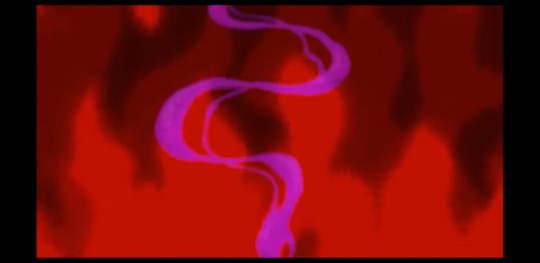
The opening of Aladdin (1992) is perhaps one of my favorites due to the fact that it seeks out to reference its source material: One Thousand and One Nights. By that I mean that it utilizes a technique known as the ‘frame story’: a story which contains within it another story. In the novel the framing device is Scheherezade, the vizier’s daughter who upon learning that she will marry Sultan Shahryar and be promptly killed at dawn, devised a plan to subvert her fate. She would each night begin a tale that would leave the Sultan so enchanted that he postponed her beheading until the next day so she might finish her tale. However, upon finishing the previous story Scheherezade would continue with another one and so on and so on until she eventually managed to avoid death for one thousand and one nights. Hence the name of the collection.
Aladdin uses a similar device in the character of the Merchant who appears at the start of the movie and introduces us, the viewers, to the world of Agrabah which is a place “where they cut off your ear if they don’t like your face” according to the original lyrics of the song. But it also includes a shot at the end of the movie which has the Genie lift up the ‘wallpaper’ and speak directly to the audience. These scenes, though easy to disregard, do reinforce the fact that the movie we’re about to see is not taking place as it happens, but rather a second-hand account of it. Much like Scheherezade attempts to avoid her decapitation, so does the Merchant at the start of the movie attempt to convince us to give the story a try, become immersed and then abruptly reminded of the fictionality of what we have just witnessed. And I don’t mean in the sense that it is a movie, but rather in the sense that even within the logic of the movie, this whole set of events has a certain fictionality to it. The fact that initial plans had the Genie and the Merchant be the same character only strengthens this notion.
But the Scarabia CM doesn’t start with the Merchant now, does it? No, it does not. But rather it starts with the very first image of the movie itself: purple smoke against a red flaming background. Except that there is no red flaming background this time, but a calming blue shot of the dunes with what appears to be the Scarabia dorm building in the background, or even Agrabah itself. There is no smoke either but sparkling dust that emanates from a lamp half-buried into the sand. The images are clearly meant to evoke the general aesthetic of Aladdin (1992), but they can also be interpreted symbolically.
The imagery of smoke is often one of ascension, of leaving the earthly shackles and rising higher towards the spiritual world. But it is also a rather solemn symbol as well, given that it can also be associated with the burning of corpses. Its presence in the movie is explained by the fact that this is after all a story about liberation: most obviously the Genie’s, but also the other characters. Everybody wants to be free in some form or another. The colour symbolism is also interesting to remark upon as according to Richard Vander Wende, the production designer of the original film, certain colours have different meanings within the movie. Red symbolizes heat and evil, while blue is a calm colour associated with water. The red background thus carries negative connotations, but it is eclipsed by the presence of the smoke in the foreground, that is a combination of red and blue. If we were to interpret this visual choice we could claim that the movie is trying to let us know that the story we are about to watch is one in which morally-grey protagonists overcome the forces of evil. For, even though Aladdin is our main character, he is not a pure hero by Disney standards as he is after all a thief and the lesson he has to learn is that he should not attempt to scam his way into a better social position.
But the Scarabia CM uses a blue background instead, so this is certainly not the same message it might try to send. Rather, due to the positioning of Scarabia/Agrabah in the background, I believe that it is indeed a story about rising above, but not above the forces of evil as much as above social norms accepted as standards. The Scarabia storyline is very much centered around the notion of social positions and how they function within a system of indentured servitude, as is obvious through the way in which Jamil attempts to overcome the position of servant through schemes and planning. We most certainly encounter the thread of evil within his character, but though his methods are unsavory, his end is, I would say, understandable: freedom.
Jamil: For me, and my family... I'll do anything for our sake!!! (4-31)
Jamil: I’m done playing servant!! I WILL BE FREE—!! (4-32)
The choice of a blue background might thus allude not necessarily to goodness as in the moral concept itself, but rather to the comfort of social norms. There is a certain stability to be had in a system that declares that all those born into wealthy families shall remain wealthy, and all those born into servant families should remain servants. To quote Aladdin: “It’s barbaric, but hey, it’s home.” (Arabian Nights) In such a system that relies on absolute conventions regarding social classes, someone like Jamil is a threat, because he questions and subverts the limitations imposed upon him. He is smarter and more capable than Kalim, yes, but because he must ensure that he does not draw negative attention upon himself, he is forced to adhere to a lifestyle that is not representative to whom he truly is. The similar shape of Scarabia and Agrabah only serves to highlight that regardless of his environment, as long as he remains a servant through his bond to the Asims, he shall never be able to change his destiny.
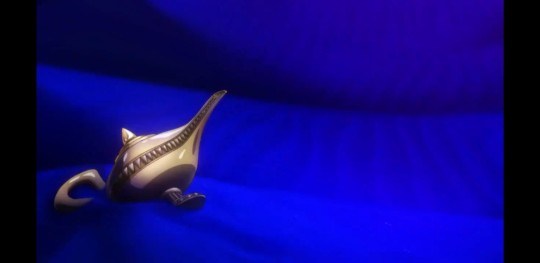
The lamp is the most important object in Aladdin (1992) as it is the MacGuffin that is coveted by Jafar and the prison of the all powerful entity that is Genie. The lamp in the movie has thus two connotations: power and imprisonment. The juxtaposition between the two creates an interesting image of how power changes according to one’s position in society. Though Genie’s powers are indeed great it seems that he is incapable of wishing himself free, which is I think a good analogy to the position of indentured servitude in which only a lord’s permission would be capable of restoring an individual’s freedom, even though they would be in theory capable of physically leaving their place of servitude. Their choice not to is not only a reflection of the possible corporal punishment they would endure if captured, but also due to the social contract that forced them to remain in that position. As servants they would remain branded forever as second-class citizens at best or dangerous felons at worst. Not a fate one would ever wish upon themselves in those days.
It is clear that besides Jafar, Jamil also bears quite a lot of similarities to Genie.
It’s like being the genie of the lamp, calling me anytime and anywhere. (Jamil Chat 1)
As I mentioned above, Disney draws an interesting parallel between Jafar and Genie when it comes to relating towards their ‘superiors’: Jafar despises the Sultan and wishes to disposes of him, while Genie forms a parental bond with Aladdin and even reluctantly agrees to remaining bound to the lamp if it means his ward’s happiness. The fact that they exchange positions at the end (Jafar being imprisoned in the lamp, Genie being freed) is the result of the moral choices they make. Genie’s altruism is what allows him to be freed, while Jafar’s ambition is what traps him as thus is the rule of Western philosophy: the needs of the others are superior to our own.
But ignoring Jamil’s OB for now, we realize that he does not truly commit to either one of those positions. He is resentful of his enslavement at the hands of the Asims, but I believe he does not genuinely wish harm upon Kalim himself, but rather towards the system as a whole, which is represented by him. This is an idea we’ll return to eventually, but it is important to mention it in advance, because it paints a better picture of what Jamil’s true intentions were during his attempt to take over Scarabia. It was not power for power’s sake as in the case of Jafar, but rather him trying to assert control over an aspect of his life, which in this case would be his position within the dorm. Jamil isn’t truly interested in the position of Prefect as is, but in what it symbolizes: freedom. As Aladdin shows power is not synonymous to freedom, but rather something adjacent to it. Even a most powerful creature like Genie is bound to the whims and wishes of a mere mortal, much like Jamil is bound to those of Kalim. To overthrow him as Prefect would mean to assert himself as independent of social bonds by having no one be superior to him anymore. Yet, because he does it through immoral means he fails and thus keeps in line with the moral of the movie: you cannot advance socially without the approval of your superiors.

The moon is one of the most referenced symbols in literature due to the fact that it innately appeals to writers and poets alike. It is fundamentally female in nature, due to its connection to the Roman Diana and the Greek Artemis, and associated as a result either with the concept lunacy, to which it lent its name, as well as with witchcraft, solitude, power and change. The moon’s circular shape as observed from Earth is also associated with the notion of eternity and cyclicity, which is perhaps the symbol that is of most interest to us when it comes to Western interpretation, as in Japanese culture the moon can represent a person’s core, unaffected by others. It is more succinctly put a representation of the Self, that which is considered quintessential to one’s identity. And it is this imagery which the CM tends to gravitate towards I would argue.

The moon is a particularly prominent symbol in Aladdin (1992) as it symbolizes the notion of change and new beginnings. Aladdin and Jasmine’s flight during the song sequence “A Whole New World” uses the moon as a backdrop and confers upon it a romantic aura of serenity and calmness, which is referenced towards the end of the movie wherein they fly towards it upon their success at convincing Jasmine’s father to allow their marriage. The moon in this regard is symbolic of unity and fortune, synonymous with true love’s conquest over everything else. But there is also a comedic twist to it as seen in the very last scene of the movie wherein Genie’s face is projected upon it. It is thus primarily a positive symbol associated with goodness.
The CM however is closer in meaning to the notion of the moon as the human core observed in solitude. Unlike the moon in Aladdin, whose shadows are barely perceptible and thus looks more natural, the moon here is overtly engulfed by darkness, with the sole space of light providing a sharp contrast in tone. It is not a symbol of unity, but rather of division creating barriers and boundaries between the characters who are positioned at opposite ends of the circle. Kalim, as a superior in terms of social and financial power, is situated upon the side that shines brighter to symbolize his role as the face of the dorm. He is the Prefect, the one that represents his dorm and the ideals that it is founded upon. Yet, upon further inspection we notice that the word ‘Scarabia’ appears on Jamil’s side, which is not only the dark part, but also takes more space. It is an unequal division but so is much of their life: Jamil remains in Kalim’s shadow, though it is only due to the former’s help that the latter manages to shine as a Prefect. This is confirmed by the positioning of their dorm’s name on Jamil’s side, as he is in fact the one that more overtly exhibits the ideals of careful planning that the Sorcerer of the Hot Lands is known for.
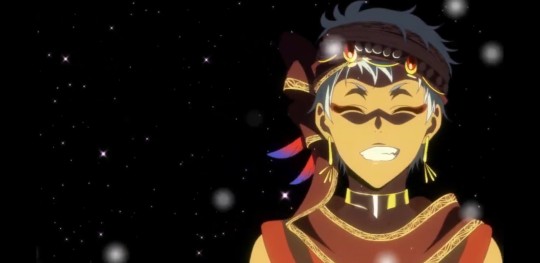
Kalim’s face change is interesting if we consider the notion of the moon representing the human core on which one’s identity is formed, because it confirms that he is indeed as cheerful as he appears to be. His cheerful disposition though likened to the image of the sun, lacks the usual masculine and aggressive features associated with it in Western culture, as he tends towards more feminine ideals of pacifism and serenity, which are associated with the moon. Moreover, as it has been pointed out to me, if one is to consider the Japanese cultural context we would be able to observe that the feminine characteristics of the sun are in perfect accordance with the female interpretation of the star in the form of Amaterasu. His body language is relaxed and openly friendly and there’s nothing about him that truly stands out in terms of contradictions.
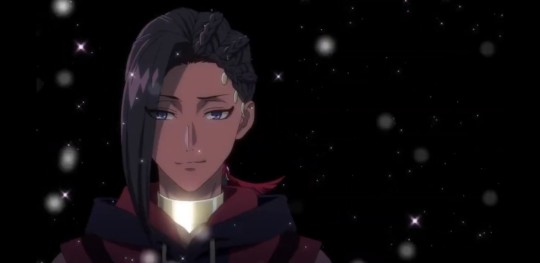
Jamil on the other hand presents an entirely different picture. His stance is guarded, that much is certain, and his expression is to be considered at best wooden. Unlike Kalim’s dynamic movement, he remains static and unchanging, sporting merely a look of resigned indulgence towards Kalim, and it seems to a certain extent as if he asserts control over his own reaction towards it. In other words, it is not in the slightest bit natural. Moreover, what does attract our attention is not his expression as in the case of Kalim, but rather the shine of the metal of his choker.
Unlike Kalim which is bathed in light in warmth, Jamil is surrounded by dark and shadows, with the sole point of light being the metal around his neck. This is different from Kalim whose accessories do not stand out in the same vein. The reason is that on a fundamental level they represent entirely different notions. In Kalim’s case it is a representation of his wealth and power, with the lack of focus on them hinting perhaps to the fact that he is at ease with his position as the heir of a multimillionaire family. It does not stand out because that is his right by birth and thus just a natural part of himself. Jamil’s core, on the other hand, reveals that his identity is very much forged by the Viper’s bond to the Asims.
Jamil: I’ve been looking after Kalim ever since we were kids. That’s the Viper family’s duty. (Jamil R School Uniform Lines)
In Kalim’s case the accessories are just that: accessories. But in Jamil’s case they are a mark of servitude. They stand out among the darkness because this is how he perceives his own persona: dominated by the image of the loyal servant who is socially inferior to his master. Even the metal itself seems to have a silver tint, rather than gold, symbolizing that even though he and Kalim should be equal (both sporting gold chokers) reality is very much different, since he is forced to be subservient even though it goes against his instincts.
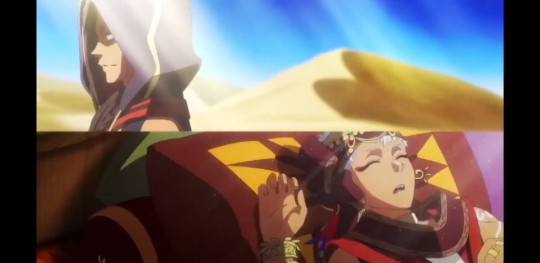
It is interesting to note that in Aladdin (1992) the notion of space and how it relates to characters plays a significant part. Agrabah, the setting of the movie, is a place of social division in which those of lower status live in poverty, financial distress and crowded spaces, whereas those of a higher status enjoy the luxury and the vast space provided by the palace. Compare the streets of Agrabah during “One Jump Ahead” which are constantly filled with people, objects and animals and project an image of recurring chaos, to the quiet serenity of the palace where the Sultan and Jasmine live. The contrast is staggering. But more than that it is indicative how much social class can make a difference.
It is also interesting to note that with the exception of the Sultan, all characters have at some point transversed these two spaces: Jafar and Aladdin move between the city, the palace and the desert, Jasmine sneaks into the city in order to experience real life and the Genie has access to a fourth space in the form of the lamp. However, the Sultan always remains within the palace walls. The reason for that is rather obvious: it is the seat of power and to leave it would be to admit to inferiority in regards to his position. Unlike the other characters that long for something more, the Sultan is content in his role as representative of financial and social power. He does not need to switch locations, because his static nature is what allows the other characters to progress in their journey.
The CM builts on this premise as well, by showing us the very different worldviews that Kalim and Jamil experience. Fulfilling the role of Sultan, Kalim is surrounded by luxury and comfort, as he rests in his room at the dorm. The colours are warm and calming, as the light very gently illuminates the room in order to cause an impression of coziness, which fits perfectly with his own character. Kalim’s personality is at its core a ‘refreshing’ one, orientated towards creating harmony and a content attitude. All his life was spent among servants that catered to his every whim and desire, so his sense of independence was greatly stifled. If we may put in blunt terms, he’s sleeping through life, relying entirely on his social position due not necessarily to laziness, but rather naivety. Because he never had to leave the palace walls, he never had to develop any sense of autonomy and thus has managed to remain faithful to his social role. He does not experience a sensation of contradiction between who he is and who he is regarded as because he lives in accordance to the characteristics deemed appropriate for him as a member of the elite.
The same cannot be said for Jamil. Juxtaposed with Kalim’s scene we see Jamil walking through the desert as the harsh light shines upon him. There is no comfort to be found in this particular shot. Whereas Kalim is sleeping peacefully and at ease, unaware of the difficulties of life, Jamil is wide awake. Unlike the former, the latter’s life is dictated by restrictions and hardships, all which he has to endure without showing displeasure as befitting his social role. He does not have the privilege of laying around not only due to the demands that are made of him, but also due to his innate desire for change. The desert can thus very easily symbolize the unfairness which he has to endure as a servant, but it can also symbolize his ambition and the effort he is willing to spend on making sure he can change his social status. Unlike Kalim, who rests in the palace, Jamil seeks to escape its confines even if it means enduring hardship. For you see, though the palace is indeed a place of stability, it is also a prison.

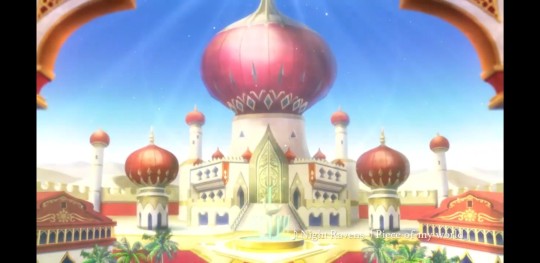
The similarities between Agrabah’s palace and the Scarabia dorm building are most certainly intentional. They’re places of unimaginable wealth that function as status symbols for the people that control them. Agrabah is, as we mentioned before, heavily divided, but it is paradoxically the slums that offer more freedom than the palace itself. Looking back at the movie we notice that the biggest symbol we can associate with Jasmine is the bird in the cage yearning to be free. The notion, moreover, is also supported by imagery such as setting the birds free after a talk with her father and, as it had also been pointed out by other critics, that the canopy of her bed is designed to resemble a birdcage. As a princess Jasmine is bound by social roles and conventions to adhere to the expectations placed upon her, and her journey in the movie is to assert herself as an autonomous person before her father by insisting that she be allowed to make her own choices. The problem however lies with the word ‘allow’ itself which once again contradicts her ideals. The notion of allowing someone to do what they want situates the power in the hands of the person who is recognized as the social superior. In the case of Jasmine, it is her father, the Sultan. In the case of Jamil, it is the Asims.
The Scarabia dorm as a symbol of the prison is an obvious one due to the fact that it served as such for Grim and Yuu during episode 4. But that is what we might refer to as physical confinement, which at its core is not compatible with the message of the CM and even of the movie. Because the CM does not focus on Grim and Yuu, but on Jamil and Kalim, so this is not a case of a physical prison, but rather a mental one I would argue.
In several respects, the prison must be an exhaustive disciplinary apparatus: it must assume responsibility for all aspects of the everyday individual, his physical training, his aptitude to work, his conduct, his moral attitude, his state of mind; the prison, much more a than the school, the or the army, which always involved workshop certain specialization, is 'omni-disciplinary'. Moreover, the prison has neither exterior nor gap; it cannot be interrupted, except when its task is totally completed; its action on the individual must be uninterrupted: an unceasing discipline. Lastly, it gives almost total power over the prisoners; it has its internal mechanisms of repression and punishment: a despotic discipline. It carries to their greatest intensity all the procedures to be found in the other disciplinary mechanisms. (Foucault 235-236)
Foucault’s Discipline and Punishment: The Birth of the Prison is an interesting look into the social and theoretical mechanisms employed by prisons in order to ‘reform’ convicts. The end goal of these institutions is to reintegrate the individual into society and to achieve such a thing it is not necessary just to punish and torment them, but to discipline them. By this Foucault understood as allowing one’s life to be entirely dictated by “a disciplinary apparatus” decided by those within power. It’s main aim was to restructure one into a “docile body” beneficial for the economical and political necessities of that specific age, which in many cases referred to the idea of one being content to pursue the interests of the state and those that governed it.
I bring this up because I can see the same ideas reflected in Jamil’s character arc as well. Foucault mentions that the prison is a space in which discipline is uninterrupted and unceasing. In other words it is a space which constantly reinforces the ideals that are considered desirable, and we can see that Scarabia unintentionally functions the same way. It is a space in which Jamil is cast as inferior to Kalim once again, trapped into the position of Vice Prefect, despite the fact that he embodies the ideals of the dorm more than he does. Though this is a different place, his routine has remained unchanged: he must still cater to Kalim’s wishes and perform the role of the servant, despite the fact that in theory the two of them should be equal now.
Scarabia Student B: Our family standing and status shouldn’t matter inside the school! We’re all equal here, right? (4-18)
Under normal circumstances, Night Raven College is supposed to be a neutral space in terms of social standing. Leona and Malleus are recognized as princes, but are not given any particular attention in terms of political and social superiority, and rather scrutinized due to their peculiar attitudes and personalities. They are, in theory, equal to the other students at the academy and the same should apply to the relationship between Kalim and Jamil as well. But things are not so.
During episode 4 we find an interesting detail about Scarabia: it seems that the building had been renovated once Kalim was accepted into the dorm. This is not usually a detail that would require any particular attention, but it reveals something about the environment in which Jamil resides: it is representative of the Asims. The ostentatiousness and extravagance are the result of their direct influence and thus molded by their own desires. By remodeling the building they have reforged it into an image of their social position and installed a member of its own family as leader. Its neutrality has been compromised and so has Jamil’s attempted escape. Attending Night Raven College is not merely a case of attending one of the best magic schools in the world, but also one of asserting one’s independence. Jamil was given the chance to finally break free from the system that has had him ensnared for all his life, only to have his hopes be dashed by being reminded that in the end the influence of his masters is much greater than he could have anticipated. Thus, Scarabia was turned into a space of imprisonment which perfectly replicates the dynamics of the Asim household and thus denies Jamil any possible form of freedom. Much like Genie and Jafar at the end of the movie, he is unable to escape his prison without the approval of his superiors.
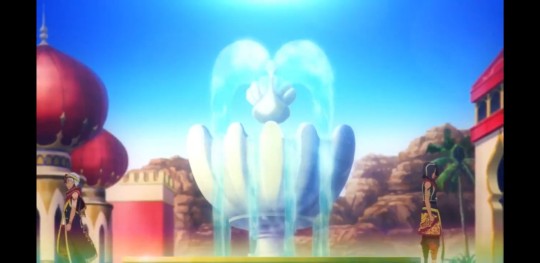
Jamil is aware, however, that he is not and will most likely not ever be able to receive such freedom from the Asims. And consciously he knows he cannot attempt to break free on his own either.
Jamil: My family, the Viper Household, has been serving the Asim Family since olden times. A retainer drawing his sword against his master is unforgivable. Even more so, if Kalim’s father found out about it, my family will end up being punished. I’m sorry, but I cannot put my family in danger just because of a selfish request. (4-18)
Jamil’s sense of filial duty is one of the driving forces behind his character. It’s not only that he himself wants to be free, but wants his family to be released from their bonds as well. Because the system in which he has been raised permits a master to punish an entire family for the disobedience of one member it becomes understandable why Jamil is such a guarded person. It is not merely his own person that is at stake, but the lives of those he cares about also. It is a thought that has weighed heavily upon his head since young childhood most likely, once he became aware of how exactly the social system set in place works. To go against it would not be an act of brave rebellion, but that of sentencing others to punishment to fulfill his own ambitions. Which for a character twisted from Jafar seems contradictory. Yet we must remember that he has certain traits of Genie as well. Unlike him whose loyalty lies to his Master, Aladdin, Jamil’s loyalty lies to his family. He’s only willing to endure things as they are now due to the fact that rebelling would mean having them suffer the consequences. And Jamil is aware of that.
Yet, it is also necessary to ask the following question: Why does he end up rebelling in the end?
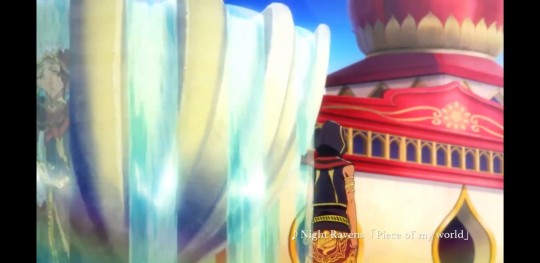
The most obvious answer: accumulated frustration.
As I stated before, Jamil does not hate Kalim. However, it is also obvious that his Overblot had very much to do with the fact that he had become increasingly irked by the latter’s attitude to life. His critique of Kalim’s character, though harsh, was entirely accurate. Kalim is indeed spoiled and naive to an almost ridiculous degree, even though it is not entirely due to his own fault. Moreover, it is not necessarily these particular traits that Jamil takes issue with, but rather his predilection towards inaction. To briefly reference a previously discussed shot: though Kalim is content in his passivity, Jamil cannot abide by the current system. He desires change, but he knows he is in no position to enact it and is thus frustrated that the one who would be able to perform this task is oblivious to the struggles of those around him. Jamil does not hate Kalim as a person, but rather that which he represents: the power of the system itself. As the CM shows Kalim is able to move forwards, uncaring of limits and boundaries, but uninterested in change (initially) while Jamil, though he desires to advance, is stuck in one spot.
The brief image of Kalim reflected in the surface of running water captures this concept perfectly. Jamil is not looking at Kalim as he is, but rather as perceives him to be: an unclear image. Water has the same reflective properties of mirrors, but due to their unstable state they cannot portray accurate images. Jamil attributes maliciousness to Kalim’s denseness as not only a means of explaining his actions, but as a way to excuse his own eventual betrayal of him. If Jamil considers Kalim as a representative of the system, he feels justified in his actions and thus more willing to go through with them, since he can project his frustrations upon a material, solid person rather than an abstract entity. Kalim is in a sense a scapegoat for Jamil’s anger.
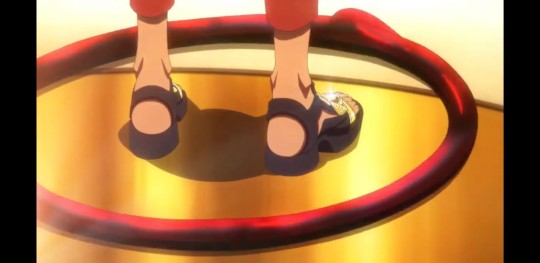
The snake is laden with multiple meanings being both a manifestation of evil (Satan taking the form of a serpent to trick Eve into sinning) as well as a symbol of rebirth and transformation. In keeping with the colour motif of the movie the serpent staff that Jafar carries with him has eyes which glow red when he’s using it to hypnotize the Sultan to indicate his evil influence upon him. In the CM we have the image of a red snake coiling around Jamil’s feet which is the physical manifestation of all his feelings of dissatisfaction regarding his position as a servant finally bursting apart. But before he is overtaken by those negative feelings we notice interestingly enough that the snake takes the form of an ouroboros: a snake which eats its own tail. A symbol of eternity.
Jamil: I’ve been raised as a retainer to serve his family, so I really can’t understand. A master is a master and a servant will be a servant. Most probably for as long as we’re alive. (4-26)
When discussing Jamil’s character we must admit to a certain cyclicity. Not one he engages in, but rather one in which he is stuck. He is the son of a family that has served the Asims for generations, creating a chain of servants and masters that is currently supposed to be replicated by him and Kalim. His sense of autonomy is constantly denied due to the intervention of forces beyond his control. Moreover, in chapter 4 itself his plans get constantly ruined by either Grim or the Octavinelle Trio, creating a sense that the universe itself has aligned itself in opposition to him.
But there is more to it still. Jamil is a highly ambitious person, who desires to establish himself through his talent and skill, thus giving him the perfect reason to despise a system that requires some individuals to be subservient to others for arbitrary reasons. However, by his own admission he cannot envision a life outside the system either. This is in essence the insidiousness of such phenomena: they entrap not only the person physically but psychologically as well. Once one’s identity is dependent upon a certain ideology and philosophy of life it is extremely difficult to extract themselves from that mindset. Much like Foucault said, once the mind is disciplined and the individual turns into a ‘docile body’ they become reliant on that particular system in order to form a coherent identity.
Though Kalim can step outside the bounds and limits imposed upon him, by virtue of his social position, Jamil is only allowed to operate within those boundaries. It is precisely why he stops advancing further once he reaches the end of the round court. Though physically he should be able to overcome such obstacles, mentally he is unable to not. Not as long as he remains under the governance of the Asim family, at the very least. It is obvious however that he cannot simply rise against them, and this realization is what causes him to hit the limit in terms of patience. He finally realizes that he has been robbed of his independence even before he was born.
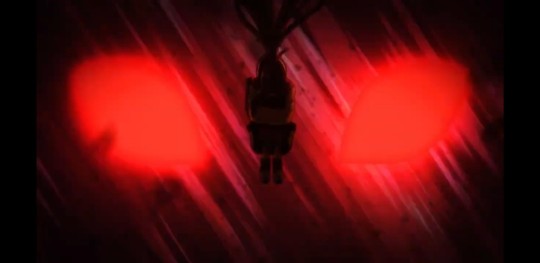
Jamil: But if I have, it’s better you don’t know what I really think of you. If everything goes to plan… I’ll finally be free. (Scarabia CM)
Sight is an important theme to Jamil’s character as he, much more than any other character perhaps, actively attempts to manipulate the perception of others about him. He is not what he appears as Azul remarks in many of their interactions, and that is because to Jamil allowing himself to be genuine would come with a price: revealing his true feelings regarding his social position. And that, as previously stated, is not something he can afford.
Eyes are often called the ‘windows of the soul’ in the sense that they reflect a person’s true intentions and thoughts. Moreover, the notion of sight is one that literary authors often like to explore in their works. Out of all the senses, sight seems to be considered the most unreliable, since it often fails to discern that which exists in obscurity. The notion is explored in Aladdin (1992) too to a certain degree. Everybody sees only what they desire to see, and because the images they form are so contradictory that it creates misunderstandings and unnecessary conflict. Jafar’s power of hypnotism is even more interesting in this context since by definition it allows him to influence a person’s perception of reality and thus a part of their identity and how they relate to their environment.
The end of the CM hints towards this notion as well, as we see that the Overblot first manifests itself is his eyes, obscuring his sight from the reality around him. He’s chosen to throw himself into the negative emotions that have finally overtaken him, and as a result given him the power to recreate reality to his discretion. We see the parallel with Genie and Jafar in his Unique Magic as well, since though he possesses one of the most potent powers, he’s still considered an inferior. Jamil’s Overblot is thus one formed by the depressing realization that for as long as he exists within the system, he’ll be forced to endure the continuous cycle of subservience forced upon him since before his birth. His transformation moreover is the result of a desperate yearning for freedom which has driven him to extreme actions. The appearance of the red eyes behind him symbolize more than the eyes of the serpent staff. They are a stark reminder that he is consumed entirely by the realization of his own powerlessness and over-dependence upon the Asims, even if it’s against his desire.
To note is also the fact that out of all the Overblot victims, Jamil’s expression is the only one that is peaceful. If we take a look at the Heartslaybyul, Savanaclaw and Octavinelle CMs all of the Prefects display either rage or shock during their transformations. It is clear that this process is a horrific one, which explains their reactions, yet strangely enough Jamil seems serene and accepting as if he has come to terms with this course of action. Unlike the Overblot victims before him, his transformation is liberating to a certain degree, because it allows him to finally achieve his goal: get rid of Kalim and instate himself as leader of the dorm. Not because he covets the position itself, but rather because through it he manages to finally become free and unburdened by his social position. In a way, the dark appeal of Overbloting is just that: unlimited power, and for a character like Jamil, who very much lacks this, it is especially hypnotic.
Out of all the Overblots so far, I consider Jamil’s the most tragic because in the end there seems to be no obvious escape for him, perhaps except in the case of Kalim setting him free. But this is still an event that will happen in a few years at best. It does not answer his current need for autonomy. Yet, despite this we see in chapter 5 that there is indeed some improvement. Though he has refused Kalim’s offer of being friends, he nevertheless has begun acting more like his equal within school grounds and their relationship overall seems less hostile on his end. The fact that much of the action of chapter 5 takes place in Ramshackle Dorm is also an important thing to note as it manages to create a neutral space, untainted by the Asim’s interference. In Vil’s system of meritocracy Jamil is finally able to act as himself and stop performing a role for others, thus he is finally able to assert a degree of autonomy over his own person, which he was not capable of doing before.
Coming now to the ends of this post I think it goes without saying that in terms of narrative cinematography the Scarabia CM is currently unmatched. Though short it manages to give a perfect summary of the themes explored in episode 4, the relationship between Kalim and Jamil and a brief but insightful look into the latter’s psychology and reasons for Overbloting.
So, there’s really nothing else to do but thank Yana for giving us such a wonderful CM for what I consider the best dorm and best boys in the whole game.
Additional Links
Indentured Servitude: https://www.youtube.com/watch?v=Qt--B1Y-u6Y
https://www.youtube.com/watch?v=Ti7Kbd6gSIo
Twisted Wonderland, Episode 4: https://kanadesmusingsblog.wordpress.com/2020/06/01/masterpost-twisted-wonderland-episode-4-translations/
Jamil Chats, Personal Stories: https://twisted-wonderland.fandom.com/wiki/Jamil_Viper/Personal_Story
https://twisted-wonderland.fandom.com/wiki/Jamil_Viper/Chat
Scarabia CM:
https://www.youtube.com/watch?v=EVSx_BvTlmQ
Aladdin (1992) commentary: https://filmschoolrejects.com/38-things-we-learned-from-the-aladdin-commentary-fd9f1d8573b3/
--------------
The peeps over in the Twisted Writings discord know this has been brewing for a while, but I’ve finally managed to sit down, write and edit this monster. It bears witness to the fact that I adore Scarabia more it is healthy (lol).
Also wanted to thank fellow Scarabia stan buddy @chillableu for proofreading and brainroting with me about these boys. You’ve been such a great help and I’m so thankful to you! ❤️ ❤️ ❤️
All the translation sources have been linked in the last section of the commentary.
#twisted wonderland#jamil viper#kalim al asim#scarabia#meta#twist#twisute#twist meta#twisute meta#overblot#vil schoenheit#rook hunt#leona kingscholar#ruggie bucchi#lilia vanrouge#malleus draconia#riddle rosehearts#trey clover#twisted wonderland mc#twist mc#grim#episode 4#idia shroud#ortho shroud#azul ashengrotto#jade leech#scarabia cm#cm analysis#cm meta
260 notes
·
View notes
Text
leave c!phil out of bullshit 2k21 -- a not so tiny post by a new enthusiast
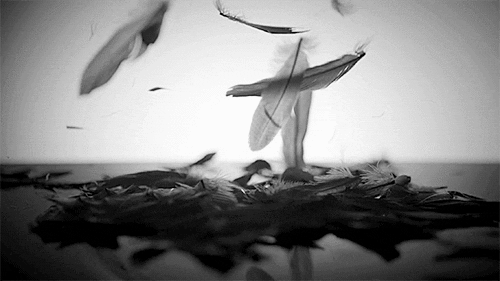
As someone who finds both common fanon and actual canon to be quite fun, I really think the general DSMP fandom would benefit greatly from a few things in general: the greatest, in my opinion, is learning to accept that popular fanon won’t usually be the canon you receive. Another, of course, is that POVs are golden, but with these two things being flimsy in being accepted, they are the major flaws that cause about 90% of the absolute messy takes that gain traction, oftentimes poisoning a canon character's ability to exist in the story.
My biggest beef regarding this comes from how y’all treat c!Phil, so here I am, being annoying on main side!
TL;DR... Just because someone acted like like a guidance to others, doesn’t always mean that they'll want to be the father figure role for everyone that breathes. Similarly, pinning down a character on a single trope is wack, so don't be surprised if they grow away from it.
Baby’s first little dsmp rambling below!
(Warning: it's long as hell)
The Dream SMP plotline is not written out like most popular media. With so many moving parts in the form of daily streams and the wonderful tool of live improvisation, it makes perfect sense that such a giant cast would not always be on the same page. Adding onto that, it also makes more sense that a vast majority of the cast will be placed into supporting roles, as the story needs to have characters that serve as narrative anchors and others that function as the links in a chain, all weathering the storm that is the plot.
Screentime, of course, plays a major factor into canon exposure -- in terms of the Dream SMP, POV matters equally, if not more, too.
It’s a pretty neat way of showing things, but in the end, the fanbase has a lovely (read: godawful /lh) way of analysing characters, particularly when it relates to how they interact with others from their fave character’s POV. The tendency to analyse things from a single character's POV is fine, but not when attempting to critique the greater whole of a conflict. Both sides, no matter how wrong they may seem to be, matter.
Adding onto the fact that everything is live, there are things that will spiral out of control, casual words being skewed and thus having the potential of a single line seemingly contradicting the entire ‘story’ that the fanbase has made. If it directly affects a fave's POV in particular, one is more likely to take offense, as bias immediately bars one from trying to see the other person's side of things.
POV is important.
Which brings me to c!Phil, and how critics tend to ignore his perspective to prop up another character, or justify the tearing down of another.
Improvisation is both a blessing and a curse; the fanbase, however, loves to test out the latter. With it, the fanbase starts crafting tales to justify it...And so begins the mess that is c!Phil discourse.
Say it with me, folks: c!Phil is not supposed to be your fave’s fluffy father figure... unless you’re c!Wilbur!!!
😃☝🏾Dadza is good...👉🏾😎👉🏾 But fandom wants the excessive, idealized version.
-- birb 2k21
Family dynamics are generally loved for their potential for comfort, particularly those of a found family nature. Fandom in general tends to lean into them wholeheartedly, with most major bases having at least one prominent group present; SBI, of course, is no different. From fanart to popular fanfiction, it's arguably the biggest group dynamic alongside the Dream Team, and for that, a precedence was set.
c!Phil, if he ever joined, would fix everything! All of the ‘kids’ would turn to their new mentor and everything would turn out fine! This all knowing, morally just character will chuckle at their antics and wacky hijinks will follow! Fun times, right? /s
The hope for it, however, has long since been shattered, and frankly, good for him!
To go a little ooc, cc!Phil has stated multiple times that, while he was friendly with a lot of the cast as c!Phil, his only paternal link (at least biologically) lies with c!Wilbur. Simple, right? It should be -- there are multiple clips of him saying this -- but fans choose to ignore it in their critiques, generally citing favouritism or downright neglect for the character’s flaws. From 'favoring' Techno (who, in canon, holds the highest link in friendship outside of c!Wilbur's familal link) to 'neglecting' to visit Tommy (who he barely knew, and also assumed, like many others, that he was fine), these critiques weigh heavily on the scale that judges Phil’s so called father figure trope.
The story, however, has only leaned into (and persisted with) that for c!Wilbur alone, and adding onto it, there is an established acknowledgement from both ccs. That confirmation should hold the most weight, especially since both Phil and Wilbur seem alright with it. Even so, that familial has yet to be explored much for both characters, particularly regarding c!Phil, who has his debut (at least narratively) in a scene that feels opposite to the classic fatherly role.
c!Wilbur denounced accepting that helping hand to fall entirely into his explosive end, setting a precedence unlike most fatherly types arriving to save their kid. Usually, fandom narrative would love a close save, father and son uniting to heal and build up what was broken, but c!Phil’s entrance inks his story in failure. Angsty, right? We love angst!
And yet, as the story ticks on, the bad takes pile up.
Why? Well, I’l used to think that it is a “funny haha” type thing; a way to grieve for a character that was lost, as Alivebur was genuinely a great character. However, with the plot slowly progressing c!Phil’s story to evolve away from the ‘mentor the kids’ trope , I should have seen a storm on the horizon.
It should have been seen from the moment he stabbed c!Wilbur in the chest, but optimism is one hell of a smokescreen.
Built up fanon, however, is probably the greatest fog to ever exist.
There are lines before the button room confrontation that paint a picture of Wilbur seeking out the approval of his father (who seemed distant, at least from his POV), as well as hints to the SBI dynamic, but with the countless dismissals/retcons from CCs involved, as well as little to no consistent canon acknowledgement of this team dad role...Why base an entire hate piece of c!Phil just because popular fanon isn’t real?
Why, for the sake of building up a well rounded character, would one place the title of a communal parental figure on a grieving father who has little attachment to the community involved, especially when most of them are too busy delving into their own issues?
Furthermore, why go for Mr. Philza Minecraft: Angel of Death, CEO of KEKW, Functioning Immortal????
It’s madness, luv, and frankly, antis cannot let c!Phil process any of his grief (or flesh out his character) without his contributions being fatherly. His role has been idealized to the point where he is not a character on his own, but an accessory to the happiness of other characters. That is not how the world works, and in a conflict riddled server like the dsmp, arguing that it should be like that is counterproductive.
c!Phil had his own shit to deal with, and as he slowly uncovers how fucked up the server actually was, he merely adapts to it. He learns to play the game by his own rules, and people become mad that he’s succeeding in his own way. It's as simple as that, particularly when referencing his initial exposure to the world he now inhabits.
c!Phil is a man who used to hear of his son’s success from the letters he received, words spinning tales of won revolutions and newfound friendships. To a father, those letters are more than enough to assume that all is well, and with it, he had no reason to check on his son, who was already old enough to be carving his path alone. For him to arrive and see just how broken his son actually was, and then, in front of faces he only vaguely knows, kill said son... There's a lot to take in.
He shouldn't have had to care about L'Manberg in those moments, not when he had his son in his arms, dead by his own goddamn weapon; his son who, to his knowledge, was doing pretty well up until he caught wind of his plot. Yet, he does.
He gives them the benefIt of the doubt, even ignoring the one person he has shown to have deep history with (c!Techno) to assist the nation in defeating the withers and rebuilding what was lost.
c!Phil stays in a nation that has seemingly brought his son right into his demise, holding in that grief to help people who he assumes have the chance to rebuild, to reform. For a moment, he trusts that the system can turn into something positive, offering to hunker down and do what he can to help. That’s the start of a fatherly type role for most -- with many expectations rising from fans to ‘fix’ all these traumatized characters.
In another plot, perhaps critics could have gotten the tropes they want from c!Phil, but to blame the character for reacting negatively to a world he barely knew, right after seeing it ruin his son and target a friend...Maybe the need for a "father figure" only stems from making their faves happy.
Characters that don't directly support your fave are not inherently awful characters. Critique based on that alone is...flimsy, really, but honestly, you can use to to show how they process things.
Which brings me to the events leading up to Doomsday, and with it, the steady rise of c!Phil’s defining traits.
Say it with me, folks: c!Phil is one of the most loyal members on the server, but loyalty doesn’t mean he's blindly following along!
😃☝🏾Butcher Army take this L👉🏾😎👉🏾 Found it in the L’Mancrater
-- birb 2k21
The butcher army arc, while nestled among the mainline story of Tommy’s exile (which I will not even mention, because those dadza takes about visiting may deserve a post on their own), allows for c!Phil to see into the minds of those who had once been with (or even against) his son’s plans. Sure, he may be witnessing them after the eve of their newfound traumas, but this is an important observation to make when comparing how easy it was to denounce his affiliation to them and side with c!Technoblade.
Unlike the new Administration, slowly dipping deeper and deeper into their own form of power hunger, c!Technoblade’s base desires had never wavered. His trust in others, however, had, still nursing the sting of a betrayal, but with no conflict in sight. He is reforming, finding comfort in his solitude, and still maintaining contact with those he trusts.
Techno's Compass, for one, is a major example of their mutual trust. Despite being on opposing territories, they are civil enough to trust each other, just like old friends.
Thus, when you take two old friends who are more than used to conflict -- one grieving and one betrayed, but both seeking neutrality -- it shouldn’t have surprised the antis that c!Phil would place c!Techno’s whereabouts (and life, mind you) over some government he barely knew.
And yet, above all else, c!Phil starts off as a neutral party for everyone's sake, forgoing potential conquest for peace.
To c!Phil and c!Techno, it’s like fighting back to back, knowing that one can always trust the other to fend off those just waiting to take advantage of your blindspot, while also quelling the need to imagine your partner turning around and doing the same. That sort of friendship is forged through many, many hardships.
They betray what little trust he had built in them. That’s on them.
c!Phil is aware how untrusting c!Techno is, and while c!Techno feels safe enough to give his all for c!Phil, he never exploits it to get ahead, which is something L'Manbergians felt okay with doing.
They take a book out of the playbook used on c!Techno, for c!Techno.
They went after yet another person who was close to him, using their power and influence to hold an execution under the guise of seeking justice. If c!Wilbur, at least pre-corruption arc, sent letters to his father, one would at least expect some of his old ideals of freedom and fairness to leak through into his friends, right? To see those c!Phil assumed would hold similar ideals immediately skew towards a darker, brutal side, particularly in threatening others to get what they wanted...Well, shit hit the fan.
c!Phil does not have that strong relationship with any former L’Manbergians, and despite there being potential for such, it didn't work out that way; instead, however, those characters manage to mistake his kindness for weakness. They take his preferred neutrality as a way to exploit him, to gain in such a way that he lost agency...
No more Mister Nice Dadza, and honestly, he’s justified in that notion.
They’ve lost his trust, time too short to have gained that strong link like c!Techno’s or c!Wilbur’s, and with it, came the inevitable association with Doomsday.
c!Phil knew c!Techno’s intentions from the beginning -- which had only wavered into dormancy because he had grown tired of fighting, understanding that the cycle he wishes to break is not worth his efforts -- so the agreement in participating is effortless.
c!Dream was there too, of course, but in their mutual quest for eradication, it’s made canon that c!Techno and c!Phil hid away most of their arsenal, despite seeming overprepared. They have no loyalty to c!Dream; they’re smart enough to play along, however. He was a means to an end.
There’s no lies present in their relationship; c!Phil needed someone who didn’t try and pull wool over his eyes, and c!Techno let him see.
c!Techno needed someone who wouldn't stab him in the back, and c!Phil stayed true as his hidden sword.
Which is why, as the two joined forces, ideals aligning and power synergized, they didn’t think twice about nuking the nation to bedrock. Mutually agreeing that the system needs to die, they did what they could, and they succeeded.
How cool of them, tbh LMAO.
New L’Manberg tugged too hard at the sleeping tiger’s tail; they shouldn’t have expected it to roll over.
Their openness to each other was known.
There was no need for underhanded plays, for hidden betrayals, for undisclosed words.
Their loyalties were strong.
They were in sync.
In conclusion (maybe, maybe not...this shit is long holy heck)
😃☝🏾 I may hate this analysis in 30 minutes👉🏾😎👉🏾 Or I may make a part 2. Fuck it!
-- birb 2k21
And that’s what makes c!Phil an interesting character: He tends to be critiqued in reference to chatacters who have very well wronged him, have no affiliation to him or get associated to him through popular fanon. There's a lot to cover that I haven't (from Ghostbur to the whole Tommy 'dilemna') but overall I'm digging what I have now and if I ever get more energy, I'll continue!
c!Phil enthusiasts, I hope I did you proud LMAO. It's my first forray into this side of tumblr 👉🏾👈🏾 I'm a lurker.
c!Phil antis, you can either act respectful or go argue with a wall. I got experience dealing with antis on Tumblr; I am immune to BS.
Anyway, I hope you all enjoyed. Signing off!
- BIRB.
#dream smp#dsmp#philza#ph1lza#this one's for the c!phil enthusiasts hello hi ily all#I have spent the entire afternoon writing this while the power is out lmaoo#fandom leave my mans philza minecraft alone challenge#god i don't even know how long this is I'm so sorry#i let a little bit of my c!techno enthusiasm shine through too
31 notes
·
View notes
Text
Chihayafuru | Why read it?
This is a comprehensive, non-spoilers review I made of the series on Goodreads recently, and I thought I would leave it here for potential readers as well. As the series will come to a close within the next year or two, there’s no better time to pick up Chihayafuru than now. The following review covers: a basic summary of the series, a brief explanation of karuta, highlighted aspects of the narrative, and common misconceptions. Enjoy!
Chihayafuru primarily follows three childhood friends—Chihaya, Arata, and Taichi—and their journey through karuta, a Japanese sport inspired by one hundred classical poems found in the famed Hyakunin Isshu. The trio bonds over karuta as children before they're inevitably separated due to a number of circumstances, until their paths cross once again in high school. Their efforts to rise to the top of the sport's hierarchy in Japan parallel to their personal relationships with each other, as well as their insecurities, hopes, and fears for the future as they grow up. REP: visually disabled SC. TW’s: verbal parental abuse.
Karuta (or more specifically, kyogi karuta) is a Japanese card game. The poems of the Hyakunin Isshu are transcribed onto two sets of one hundred cards each—the yomifuda, or reading cards, have a full poem transcribed onto them, while the torifuda, or grabbing cards, have only the second half of a poem transcribed onto them. Each player has a territory with twenty five cards, and the object of the game is to grab the correct torifuda as soon as the corresponding yomifuda is read. There are also a few more complex rules, but ultimately, whoever clears all of the cards in their territory first wins. Karuta is a game that tests memorization, agility, hearing ability, strategy, stamina, etc.
The following are aspects of the series that I think really make it stand out!
The expansive cast. Karuta is an all-ages competitive sport. People from all walks of life compete against each other, so there's a broad range of characters introduced across the course of the series: old doctors, married women, high school teachers, elementary students. It makes the personal experiences and learning points of the various characters all the richer. The appearances of background characters are also consistently recurring, which makes the fact that the cast is so expansive even more enjoyable, because no one is truly forgotten or cast aside.
The emphasis on teachers. An experience Chihayafuru especially explores in depth is that of teachers, both literal and figurative. They are constantly brought into focus: as competitors capable of displaying as much persistence as their juniors, as mentors who do their best to nurture the younger generation, and as people of a past era fighting to hold onto what grasp of the present that they have left. Their insight is invaluable to the younger characters that the series primarily focuses on, and they can hardly be called backseat players.
The exploration into parent-child dynamics. Although the angle from which Chihayafuru explores parents and their influence on their children is a little different, it's also a just as valuable portrayed experience that I adore. There are parents who give their everything for their children, parents who don’t understand their children’s ambitions but support them as best they can, parents who demean those ambitions and create everlasting insecurities, parents who use their children’s ambitions for their own gain, etc. I think in that sense, there’s at least one parent-child dynamic that every reader could potentially relate to and find catharsis in reading about as these relationships grow and change.
The series' refusal to treat karuta as insular. A lot of sports manga have a tendency to focus almost exclusively on the sport in question, with no thought given to the characters' real-life problems, their families, or their future after high school. Chihayafuru, rather than making karuta the object of its story, instead makes it the narrative medium by which the characters' life stories are told. It's a series about people and their problems more than it is a series about the sport, which is what best sets it apart. The characters are constantly faced with the reality that they will have to confront their future and the need for a career at some point, because karuta isn’t a sport that pays nor one necessarily super-famous in Japan.
The use of poetry to parallel the events of the narrative. On the surface, karuta is just another card game; but what makes Chihayafuru special is that the poems being read at different parts of the story actually further contextualize what is happening. Although the course of the story can be understood without looking up what each mentioned poem means, there’s no denying that looking up the meanings adds so much more to the experience. It's one of the best Easter eggs the series has to offer, and it also lends further understanding to why players must cherish the cards for what they mean in order to truly love the sport. (Also, if you are into classical poetry and/or the use of nature-associated metaphors to illustrate life, this will definitely appeal to you!)
The analysis of the human psyche. There are several types of relationships and personal problems Chihayafuru explores. In particular, the friendship between Chihaya, Arata, and Taichi is complex. Their love triangle is deeply entrenched within each of their individual relationships with karuta and their individual insecurities, which is what makes it stand out to me as one of the best of its kind. Each of these characters undergoes expansive development as an individual, and yet the three of them are also inextricable of each other in terms of that development and their goals. There’s extensive exploration into what it means to truly love a sport, whether natural talent or hard work is more valuable, how ambition and success achieved at the cost of loneliness is to our own detriment, and whether the expectations of an older generation will define all that we are capable of becoming.
The exploration of playing as an individual versus as a team member. Karuta is a sport that can be played in teams (up through the end of grade school) or individually. Both aspects of play offer different insight into the nature of sports in general, about the characters' personal goals or desires, and about their complex relationships with the support systems that surround them, or lack thereof. There’s a huge emphasis put on the fact that ultimately, while experiences garnered while playing alone are valuable, karuta cannot exist on the backs of isolated individuals alone. Human camaraderie is necessary in order for the sport to thrive. One of my favorite quotes from the series is regarding this complex theme: Team matches are solo matches. Solo matches are team matches.
The women! Among its equally (or more) famous peers, Chihayafuru is perhaps the series that emphasizes on uplifting of women and women's friendships the most (an advantage lent to it by the all-ages, all-genders nature of the sport). There's a vast cast of female characters, and Chihaya and Shinobu in particular are protagonists whose strength is never undermined by the fact of them being women or the object of someone's affections. The women of the series are strong, air-headed, determined, lazy, ambitious, lost. There’s a vast array of experiences illustrated by them, and they’re allowed to embrace their womanhood while also refusing to be limited by it.
Here are some misconceptions about the series that I have seen encountered by both dedicated and casual readers (or viewers):
It's a series with little emotional payoff. As I mentioned before, Chihayafuru is most prominently a series about people and their problems. The personal journeys the characters undergo span hundreds of chapters. I've noticed before that some people give up on the series as a result, because their favorite character isn't where they want them to be within whatever span of chapters, but I want to encourage potential readers to not give into this inclination! This is a series where you need to be in it for the long haul, because the emphasis is that these emotional problems characters face are not ones that they can solve within the span of a few months. Sometimes, they take years (aside from the first volume covering a flashback sequence, the main narrative takes place over the course of three years).
Perception of the love triangle. A lot of people tend to zero in on the love triangle and make it their focus of reading, and especially for readers who attach themselves to Taichi, this often leads to disappointment in where the narrative leads (as he is a character who struggles immensely on his journey towards growth and self fulfillment). It's important to remember that each member of the childhood trio is their own individual! Issues tied to the love triangle are certainly important, but readers often miss out on crucial emotional development for characters because they're too focused on who they think Chihaya should end up with, when that's not even remotely the point. The narrative almost always emphasizes that at the heart of it all, Chihaya, Arata, and Taichi will always have each other. What matters more than the outcome of the love triangle is whether their friendship will ultimately heal and thrive, and whether they will grow as individuals who can support each other rather than act like crutches for each other.
This is not a series about sports! This may be a confusing thing to say, and it may not even be something that other Chihayafuru fans would agree with me on. But again, I'll reiterate: Chihayafuru is most prominently a series about people and their problems. Some matches can span several chapters, while others barely last a few panels. The focus is not so much on the sport as it is on what the sport or match is doing emotionally for the individual. In that sense, it's a bit different from its contemporaries, where almost every important match is covered in detail, from one move to the next. Although there are plenty of moments where karuta matches are covered in detail, don’t be surprised if there are moments where they proceed too fast, and think to yourself why showing the whole match may not have been necessary!
These are the main points that I could come up with, but if you have any questions, feel free to send me an ask on my blog. I hope any part of this can convince you to read Chihayafuru, as it’s a wonderful story that offers a lot of layers to dissect to its audience. There’s always something new to discover with it, and that’s what makes it special.
#chihayafuru#ayase chihaya#mashima taichi#wataya arata#wakamiya shinobu#meta#i'm just tagging them all so it gets spread gjfkgjfkdhl#but uhhh. i hope this is comprehensive#also if you disagree with anything pls send me an ask!#rather than reblog onto it with an essay or something gjfkjhlgdf#since this is a recommendation post i want to keep it clean#and as accessible to others as possible
41 notes
·
View notes
Photo

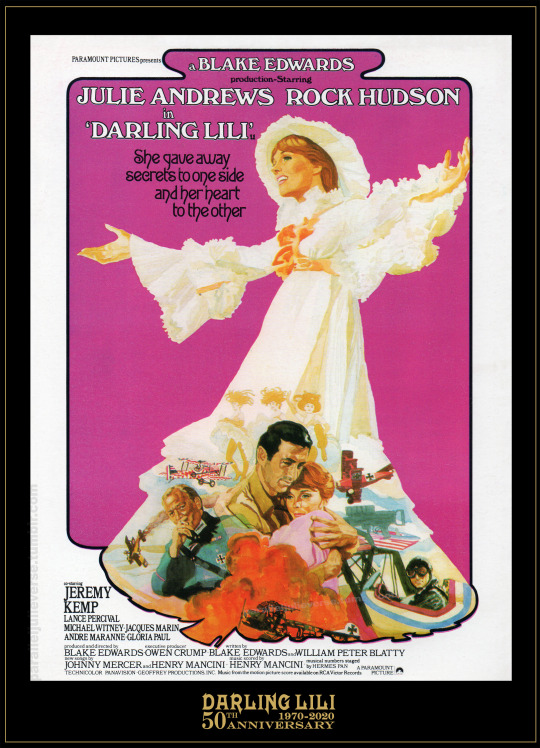
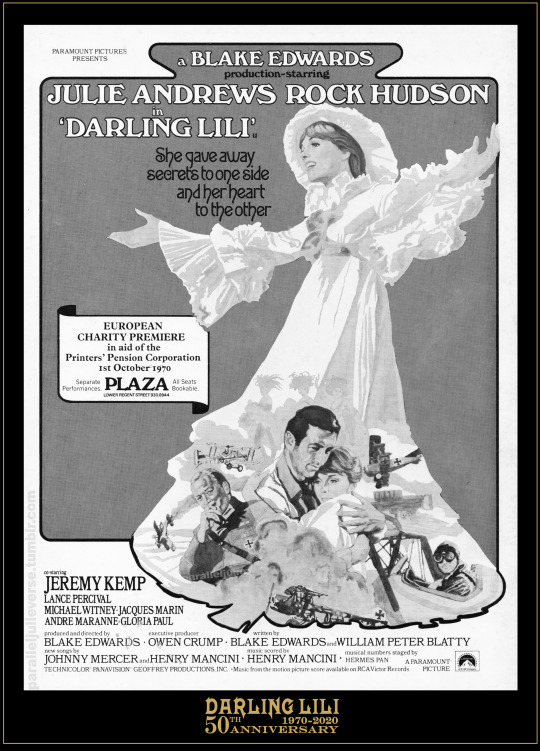


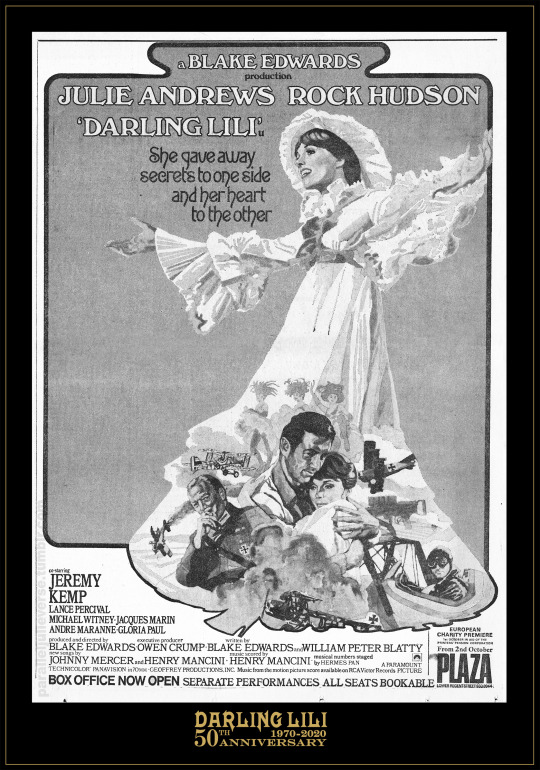

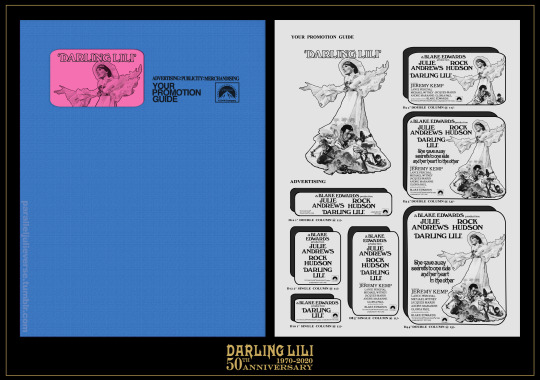
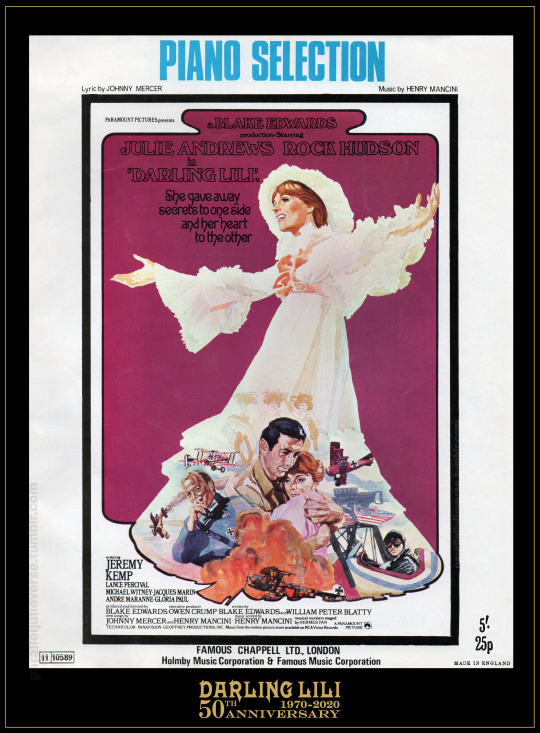
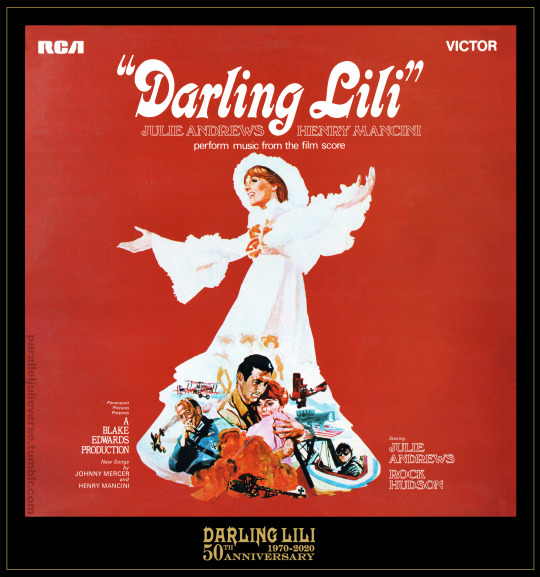
LILI IN LONDON: Darling Lili Makes Her European Bow
Fifty years ago this week, Darling Lili had its official European Premiere at the Plaza Cinema in London on 1 October, 1970. It wasn’t the film’s first international release -- that honour fell to Japan, where Darling Lili opened at the Cinerama Theatre Tokyo on 4 July, barely two weeks after the film’s US opening. However, the London premiere was a significant occasion in the film’s wider global rollout. It was, after all, Julie Andrews’ hometown and there was considerable hope local audiences would give the film a warmer reception than had been the case in North America.
Accordingly, the UK branch of Paramount Pictures afforded Darling Lili a high profile release. They exhibited the film as a full roadshow attraction, complete with widescreen 70mm print, overture and exit music, and a 24-page souvenir programme (Klar 1970). In keeping with the era’s norms of variegated international film marketing, completely new promotional artwork was commissioned for the UK release. Featuring a central image of Julie/Lili bursting into song with her arms outstretched -- a clear nod to The Sound of Music -- with a cloudburst of narrative scenes from the film fanning across the bottom of her billowing skirt, it was an arresting design that served as a ready-made marketing logo for the campaign that could be emblazoned across the full range of advertising and merchandising (Paramount 1970).
The gala premiere took place on Thursday, 1 October -- Julie’s 35th birthday, incidentally — at the Plaza Cinema in Lower Regent Street, just off Piccadilly Circus. Popularly dubbed the “Home of Paramount Pictures”, the Plaza had long been the London venue of choice for the studio’s biggest film premieres (Eyles, 26-28). Though not an official Royal Performance, the European Premiere of Darling Lili was a major society charity event with proceeds going to the Printer’s Pension Corporation, one of the oldest royally-sponsored occupational charities in the UK. Tickets were available from £1 to £5 in the stalls and £10 to £20 in the Circle with the event raising over £6000 for the charity (”Darling Lili Aids”, 12).
Official patrons of the Printer’s Pension Corporation, Lord and Lady Hartwell presided over the evening, welcoming a line of society notables and assorted local celebrities including Sue Lloyd, Judy Geeson, Clodagh Rogers and Julie Ege (“Darling Lili Has”, 32). Neither Julie nor Blake was able to make the premiere, though Julie’s parents were in attendance as honorary guests. Representing the cast, Lance Percival, who plays the comic support role of T.C. Carstairs in the film, “arrived at the Plaza in a vintage white Rolls Royce driven by a female chauffeur” (ibid.). Press reports noted that the “premiere drew large numbers of films fans to the theatre” and “the capacity audience...repeatedly applauded during the presentation of the film” (ibid.)
Following the premiere, Darling Lili opened the next day on 2 October to the general public. In a way that paralleled the experience at New York’s Radio City Music Hall, the decision to stage the film as a special event prestige picture worked well. Lili ran in roadshow release at the Plaza for over three months till 6 January 1971. It then continued to play in general release at various venues throughout London such as the ABC Cinema-Edgeware Rd well into late-1971.
Critical responses to Darling Lili in the London press ran the gamut. The film garnered several positive notices. Patrick Gibbs of the Daily Telegraph rated it “a very amiable and romantic comedy-thriller” (P14). The film “offers many pleasures,” declared the Daily Mail, with “Miss Andrews singing, dancing, delighting...with some very pretty songs...and amusing performances” (Cable, 9). The critic for the Evening Post opined:
“It is fashionable to sneer at Julie Andrews’ films as being sickly-sweet and 20 years out of date--but I can only say I enjoyed this one...Darling Lili is an enjoyable, emotional, light-hearted love story with a strong comedy element” (Watson, 7).
Other reviewers were less enthusiastic. The critic for the Daily Mirror was unsure “what kind of film Darling Lili was supposed to be”:
“Taken as a spy send-up, it’s harmless enough and drags only occasionally, but the comedy doesn’t always blend with the drama. The ending...is a cloyingly sentimental cop-out and a shade nauseating” (Richards, 19).
More than a few UK commentators baulked at the film’s irreverent treatment of World War 1--perhaps unsurprisingly given the enormous significance of the “Great War” to British history and national mythology. The critic for The Tablet, for example, called the film “a monstrous betrayal of the period.” Its “trivialisation of the issues is outrageous...I have no doubt it will be popular, but it shouldn’t be.” Still, he conceded, the film’s “photography...is very pretty and Miss Andrews’s voice is as pure as ever” (Burke, 959).
Critical concessions to “our Julie” were a notable feature of many London reviews. The all-important Times review declared:
“I wish I could like Darling Lili more. I love musicals and remain unrepentantly devoted to Julie Andrews, but this lavish new vehicle for her talents is the most upsetting sort of misfire--the sort which could so easily have been put right, with a little more thought (or a little less worry), a little more confidence in hitting the right tone and sticking to it...a disappointing waste of all the talent and money so evidently lavished on it” (Taylor, 13)
It was a sentiment echoed in The Illustrated London News:
“Miss Andrews sings well, acts decently, and even does a strip number that reveals a new side to her talent as well as a gorgeous, long-concealed, pair of legs. But, alas, not even she can save this ponderous film with its strange blend of old-and-new songs, its heavyweight prankishness, and its inordinate length” (Billington, 31).
Or again the review in The People:
“Julie has charm, grace, plus a good singing voice and Henry Mancini’s music is haunting. But the character she portrays...is hardly endearing. The story...is improbable too, even for a musical. But there are some smashing flying sequences and I like Julie’s style--so I wish it well” (Nunn, 7).
While Darling Lili opened with a splash and did decent enough business in London, it faced very different prospects elsewhere in the UK where the film became something of an inadvertent hostage in an ongoing industrial dispute. At issue was an attempt by US distributors to loosen the stranglehold and perceived old-fashioned exhibition practices of the two big regional UK chains: ABC and Odeon (“Elvin Raps”, 196; “Compromise Ends”, 24). Unable to agree on new terms, the distributors withheld several big features, including Lili, from release to these chains. As a result, Lili’s broader UK rollout was held up for months and, in some cases, years. The film didn’t get a Midlands release, for example, till April 1971 when it opened for a fixed season at the Regal Cinema in Leamington, “an independent theatre whose booking agents were able to come to terms with the distributors” (“Regal Breaks,” 2). The film then popped up intermittently at other independent theatres across the UK: Margate in September, Liverpool in October, and Belfast in January 1972.
Many major provincial markets missed out on the film completely. In a disgruntled letter to the local newspaper in early-1972, one Birmingham fan wondered if “there is a particular antipathy to musicals in our city. We have yet to see Darling Lili (Julie Andrews) and On a Clear Day You Can See Forever (Barbra Streisand), both of which have been shown in London” (Krober, 6). In a similar vein, a Reading filmgoer complained that his local ABC cinema was screening endless reissues while many new films “have yet to play in Reading..that are certainly worth a showing” such as “Julie Andrews and Rock Hudson in Darling Lili” (Suter, 10).
The UK distribution dispute was eventually resolved and Darling Lili managed to make its way out to a broader range of provincial centres including Birmingham, where it opened at the Odeon in April 1973. But by this stage the film was hardly new and whatever marketing impetus was there from the London campaign had well and truly evaporated. It was an unfortunate fizzling out for what could have otherwise been an effective national release for the film. Still, UK filmgoers who missed Darling Lili in theatres didn’t have to wait too long to catch it on the small screen. It made its British television debut as the ‘Film of the Week’ on BBC-1 on 2 April 1976 (“Film of the Week”, 22).
Sources:
Billington, Michael. “Cinema: An Ode to Lost Innocence.” The Illustrated London News. 3 October 1970: 31.
Burke, J.A.V. “Darling Lili.” The Tablet. 3 October 1970: 959.
Cable, Michael. “The Sweet English Rose is Among the Guns.” Daily Mail. 30 September 1970: 9.
“Compromise Ends US Majors’ Fight Vs. UK Circuits Over Sunday Rentals.” Variety, 13 October 1971: 24.
“‘Darling Lili’ Aids Printers’ Charity.” The Daily Telegraph. 2 October 1970: 12.
“‘Darling Lili’ Has Glittering London Bow.” The Calgary-Herald. 10 October 1970: 32.
“Elvin Raps ‘Oldfashioned Methods’ of UK Pic Biz, Hits Chains’ Bookings.” Variety. 29 April 1970: 196.
Eyles, Allen. London's West End Cinemas. Swindon : English Heritage, 2014.
“Film of the Week: ‘Darling Lili’.” Radio Times, 1 April 1976: 22.
Gibbs, Patrick. “Films: Spying With a Song.” Daily Telegraph. 2 October 1970: P14.
Harmsworth, Madeleine. “New Film.” Sunday Mirror. 4 October 1970: 29.
Klar, Arthur. Darling Lili [Souvenir Book], London: National Publishers, Inc, 1970.
Krober, Kenneth S. “Letters to the Editor: Antipathy To Musicals.” Birmingham Daily Post, 7 February 1972: 6.
Mallett, Richard. “Cinema.” Punch. No. 6787, 7 October 1970: 510.
Nunn, Ray. “But Will Lili Keep ‘Em Singing?” The People. 4 October 1970: 7.
Paramount Pictures (UK). Your Promotion Guide: Darling Lili [Advertising Campaign Manual], Chiswick, 1970.
“Picture.” Daily Telegraph. 2 October 1970: P17.
“Regal Breaks Stranglehold.” Birmingham Daily Post. 27 April 1971: 2.
Richards, Dick. “I Spy a Send-Up.” Daily Mirror. 1 October 1970: 19.
Suter, Les. “Letters to the Editor: Old Films.” Reading Evening Post. 15 June 1972: 10.
Taylor, John Russell. “Purple Passages in Paris.” The Times. 2 October 1970: 13.
Watson, Albert. “At the Cinema: Yes, I Enjoyed Julie Andrews!” Evening Post. 10 October 1970: 7.
Copyright © Brett Farmer 2020
#Darling Lili#julie andrews#european premiere#film premiere#london#plaza theatre#paramount#blake edwards#rock hudson#film history#classic film#old hollywood
10 notes
·
View notes
Text
16 Movies You Can Enjoy At Home During Lockdwown
16 Movies Or Series You Can Watch At Your Home During This COVID19 Lockdown
Whether videos of ping-pongs taken to the zoo or cats play games with their owners, the internet in these coronavirus holiday weeks can be an endless entertainment outlet as you ace social distancing.
Better Call Saul, Netflix
youtube
This current one's a moderate burner made by Vince Gilligan and Peter Gould, and is a side project from the previous' massively effective Breaking Bad.
A great part of the cast of Breaking Bad, spare the two lead characters, show up in this show. The hero of this wrongdoing dramatization is Jimmy McGill played by Bob Odenkirk.
The show serves as an independent forerunner to Breaking Bad and outlines the moderate plummet of the adorable and road brilliant McGill into the universe of wrongdoing.
McGill is an independent man who earned his law degree while working in the sorting room, who at that point turns into a seriously paid legal counselor who works out of the back of a nail salon.
Despite the fringe criminal ways McGill completes things, the cards he has been managed nearly cause one to identify with his obscure character.
Hunters, Amazon Prime Video
youtube
Motivated by accounts of genuine 'Nazi trackers', the polarizing show follows a diverse gathering of individuals who have decided to unite as one to search out war crooks stowing away (generally) in America under new personalities.
The show stars Al Pacino as Meyer Offerman, a Jewish altruist and Holocaust survivor who serves as the pioneer of the gathering secretively chasing Nazis in New York.
While genuine trackers, similar to Simon Wiesenthal, took their discoveries to the police or the media, the show's characters volunteer to vindicate the Jews who endured because of Nazis.
Also, it is this demeanor that makes their most youthful enlist, Jonah Heidelbaum (Logan Lerman) who assumes his late grandma's position in the gathering, questions everything that he has faith in.
With components of a retaliation dream and sarcastic comic book-narrating, the show has issues yet there's some heavenly acting in here.
Curb Your Enthusiasm, Disney Hotstar
youtube
Changing the least complex stuff into heavenly workmanship takes an uncommon ability. What's more, Larry David, author, and co-maker of Seinfeld, who plays a fictionalized variant of himself in Curb Your Enthusiasm, is a past ace.
To vent his wrath at flimsy tables and tepid espresso, he opens up a 'show disdain toward store', a café directly close to the café with the shaky tables and tepid espresso.
Without either, obviously. The tenth and freshest period of this arrangement is as applicable to the occasions as could be expected under the circumstances, tossing in references to Harvey Weinstein and the #MeToo development.
There's additionally a scene where David circumvents town wearing a MAGA (Make America Great Again) cap after finding that the adornment promoted by Donald Trump has exactly the intended effect in warding individuals off (social separating before coronavirus).
Afsos, Amazon Prime Video
youtube
This miniseries follows Nakul, an essayist so ineffective that he endeavors to end it all sequentially. He stays safe, yet the equivalent can't be said for the individuals who spare him.
On the off chance that this plot wasn't sufficiently strange to warrant a watch, Nakul chooses to enroll the assistance of 'changed' contract-executioners who presently 'help' individuals needing to kick the bucket.
While Nakul, played by Gulshan Devaiah, holds the story together, Heeba Shah as the fatal professional killer Upadhyay is a treat to look for her vacant promise to what she calls 'craftsmanship'.
Toss in a lot of researchers chasing for an everlasting status mixture, and a sadhu following Nakul because he has all the earmarks of being unfading, and you have a story ready with unexpected developments.
Coordinated by Anubhuti Kashyap, Afsos has a lot of things amiss with it, yet its chilled demeanor to horrible subjects like mortality and casualty makes it watchable.
Kidding, Disney Hotstar
youtube
This Jim Carrey starrer is currently gushing on the web and it is suggested in any event, for the individuals who have recently been put off via Carrey's over the top acting in droll works, for example, Ace Ventura.
Carrey is viewed as Jeff Pickles, a cherished TV moderator who is venerated by kids and grown-ups the same, on account of his long-running manikin appear.
Mr. Pickles is a fantasy-like individual who shows kids important life exercises. In any case, when he loses one of his twins, his melancholy leaves him distressed and all he needs to do is recognize that misfortune on the show and show his watchers (basically kids) about death, something the producers of his manikin show emphatically restrict.
The impactful arrangement is a story of how Pickles manages the passing of a youngster, at the same time attempting to secure the multimillion-dollar brand domain that is based on his 'glad' picture.
Self Made, Netflix
youtube
This restricted arrangement sees Octavia Spencer as the chronicled figure of Sarah Breedlove, generally archived as America's first African-American specialist who proceeded to turn into a tycoon in the mid-1900s.
The independent business visionary and humanitarian made a realm out of making makeup and hair care items for dark ladies.
Spencer, commended for her job in the Academy Award-winning film The Help, convincingly plays Breedlove, directly from her long stretches of being a single parent who began by being a washerwoman to help her girl to build a business called the Madam C J Walker Manufacturing Company.
Coordinated by Kasi Lemmons, the story has been fictionalized somewhat to rethink the battles of a lady conceived on a cotton ranch to an in the past oppressed family, yet the vibe great arrangement is to a great extent dependent on evident occasions.
Am Not Okay With This, Netflix
youtube
This story about growing up figures out how to viably radiate a feeling of relaxed fear.
The show begins by revealing to us that the hero, Sydney Novak (Sophia Lillis), is managing each adolescent issue ever young person has ever had.
But, when she gets extremely furious, the object of her annoyance feels like they've been hit by a concealed scoop.
Among the most inconspicuous of these anger instigated periods is the point at which Novak's closest companion's beau, whom the hero loathes, begins seeping from his nose out of nowhere.
Things just deteriorate from that point and Novak has no clue why her wrath can "get things going".
In light of a comic book by Charles Forman, Novak helps us a little to remember Carrie, the hero of Stephen King's eponymous novel, just as Eleven from Stranger Things since both these little youngsters additionally have supernatural forces, yet the likenesses end there.
Pushpavalli, Amazon Prime Video
youtube
Season two of this dramatization sees humorist Sumukhi Suresh return as Pushpavalli, a young lady whose exceptionally flawed endeavors at charming a suitor, Nikhil (played by Manish Anand), left watchers alarmed.
A Tamilian from Bhopal who follows Nikhil to Bengaluru, the in any case clever Pushpavalli keeps on keeping crowds snared with her shamelessly tangled endeavors to snare the man she had always wanted.
In the wake of hijacking his pooch, paying off a chaiwallah to do her offering and getting her leg broken, Pushpavalli proceeds to discover inventive methods for escaping predicament, so imagine a scenario in which that requires getting connected with to another person, or releasing a reptile among clueless kids.
Extraordinary notice must be made of Bengaluru-based on-screen character Shraddha in this all-around scripted show as Vasu, the nightie-wearing, hockey stick-using proprietor who runs Pushpavalli's paying visitor settlement. Vasu's character alone merits a show to itself.
Guilty, Netflix
youtube
Enlivened by how those blamed for lewd behavior have gradually advanced go into society, this Karan Johar creation means to revive discussions around the #MeToo development.
Coordinated by Ruchi Narain, the film stars Kiara Advani as Nanki, whose sweetheart Vijay 'V J' Pratap Singh (Gurfateh Singh Pirzada) is blamed for assaulting his school batchmate.
A government official's child and an artist, V J is the most dateable person nearby, while the lady who blames him, Tanu (Akansha Ranjan Kapoor), is somebody despised profoundly for being uproarious, consideration chasing and uncaring.
The film gives the advantage of the uncertainty to the two gatherings, making crowds question if Tanu is imagining everything for exposure (something she is prepared to do), just as throwing questions on V J's Teflon notoriety.
As the specialists examine, Nanki embarks to discover reality for herself, at the same time doing combating her very own evil presence.
Mentalhood, ALT Balaji and zee5
youtube
Karisma Kapoor makes her Web debut as Meira, a mother of three, in this account of how defective guardians attempt to bring up their children as most ideal as.
A previous Miss Kanpur, Meira has as of late moved to Mumbai to raise a 'cutting edge family' with Sanjay Suri who stars as her obsessive worker spouse.
The arrangement likewise includes a reliable star cast that incorporates Sandhya Mridul, Tillotama Shome, Shilpa Shukla, Shruti Seth and Dino Morea.
Made by Ekta Kapoor and coordinated by Karishma Kohli, the show diagrams Meira's development into a blogger who composes on everything from nourishment to sex jobs with expectations of making a child-rearing aide.
The show seems to be being motivated by the Reese Witherspoon and Nicole Kidman-starred American dramatization Big Little Lies and, in contrast to the American arrangement, this sermonizing arrangement is probably going to be delighted in additional by watchers who have youngsters.
Life of Speed, Netflix
This new on-the-square narrative portrays the tale of Juan Manuel Fangio, an Argentinian race vehicle driver who pretty much overwhelmed the primary decade of Formula One by winning the World Drivers' Championship multiple times during the 1950s.
This record stayed unbeaten till Michael Schumacher went along (as a major aspect of four distinctive hustling groups).
Coordinated by Francisco Macri, this verifiable narrative plans to comprehend the brain of the hustling legend while looking at the lives of race vehicle drivers who routinely change their lives for the love of speed.
The high-octane universe of hustling was maybe definitely more hazardous in Fangio's time than it is today considering there was no defensive rigging back then and wellbeing highlights were insignificant.
Maska, Netflix
youtube
This transitioning film sees Manisha Koirala as a Parsi mother doing combating to get her child associated with the privately-run company of running an Iranian bistro.
'Nineteen years back when Rumi was conceived, his future had been chosen,' says Jaaved Jaaferi, Koirala's screen spouse.
Rumi was to grow up and turn into 'a mask-waala' (one who applies spread) like his dad (Jaaferi) before him.
In any case, he chooses to turn into a Bollywood entertainer. Prit Kamani plays Rumi, the befuddled youthful millennial who starts finding his Parsi legacy simply after separating himself from it.
Maska is as much about Rumi's excursion as it is a festival of Mumbai's Irani bistros.
With a reasonable sprinkling of youthful sentiment and family show, this is Dil Toh Baccha Hai Ji author Neeraj Udhwani's first endeavor at the course.
Next in Fashion, Netflix
youtube
As Netflix's first endeavor into configuration wars, this unscripted TV drama highlights 18 creators from over the world.
The candidates are generally experts who have dressed famous people before and have worked with significant design houses, yet none is an easily recognized name, something they all seek to be.
The show takes one through the way toward making a structure, directly from texture choice and preparing it to the time it's fit to be demonstrated.
The show is facilitated by Tanveer Wasim France (of Queer Eye popularity) and creator, model and TV moderator Alexa Chung.
The victor gets prize cash of $250,000, and the opportunity to turn into the following large thing in design.
There's additional space for motivation for watchers as challengers configuration outfits deserving of the runway, formals for work, just as stylish streetwear.
Special Ops, Disney Hotstar
youtube
Coordinated by Neeraj Pandey of A Wednesday! what's more, Special 26 popularity and Shivam Nair, this is the most recent Indian spine chiller to be discharged on the web.
It highlights Kay Menon as Himmat Singh, a senior knowledge official. The story exemplifies how Singh has been pursuing a hypothesis that the real driving force of the 2001 Parliament assault was somebody whose presence nobody thinks about.
Singh has his operators in remote urban areas and has been spending lavishly on tasks to pursue this man down, and now he needs to legitimize the cash spent.
Between flashbacks, watchers are up to speed with how Singh's group is attempting to discover this secret miscreant.
The show helps us a little to remember Manoj Bajpayee's The Family Man, which is a superior show.
Activity scenes and awful writing in the moderate parts let down an in any case not too bad story, be that as it may, for the stuck-at-home and nothing-to-do, it's something one could thoughtlessly watch.
Miss Americana, Netflix
youtube
Coordinated by Lana Wilson, whose past movies concentrated on suicide and late-term fetus removal, this venture follows the life of American vocalist lyricist Taylor Swift.
It opens with Swift being encompassed by journals, markers of individual stories. This is critical since Swift has gotten by out of diverting emotions into melodies that have become graph toppers.
She's at that point told that her most recent collection, Reputation (2018), has gotten no major Grammy assignments. Quick continues, practically aloof in her methodology.
Wilson proceeds to show Swift tending to her 'decent young lady' picture that has commanded the last's music profession, and how Swift arrangements with the thought that 'pleasant young ladies don't cause a ripple effect'.
The story graphs her ascent to distinction just as her longing to please fans, all of which have driven Swift to some dull spots.
The film shows the private side of Swift, the VIP who despite her whiz status drives a real existence shadowed by forlornness.
Westworld, Disney Hotstar
youtube
The third period of Westworld is presently spilling on the web, and keeping in mind that it is being praised for getting cutting edge tech references right, we are as yet astonished by the splendid execution of the show's story.
The story starts in Westworld, an anecdotal, Wild West-themed event congregation where guests can do anything they need, with no results whatever, because the 'individuals' in Westworld are life-like androids.
These androids are so authentic as people that guests continually come back to the recreation center to play out their most out of control dreams, activities that would be inadmissible in the 'genuine'/world.
Inconvenience starts when the android has at the recreation center increase awareness about what they truly are.
This new season sees them escape into this present reality, our reality, after a bloodbath.
In light of Michael Crichton's 1973 film by a similar name, the arrangement stars Even Rachel Wood as Dolores Abernathy, an insightful android.
For Regular & Fastest Tech News and Reviews, Follow TECHNOXMART on Twitter, Facebook, Instagram, and Subscribe Here Now. By Subscribing You Will Get Our Daily Digest Headlines Every Morning Directly In Your Email Inbox. 【Join Our Whatsapp Group Here】
from https://ift.tt/3bjLr3M
2 notes
·
View notes
Note
I was wondering if you could explain Peter and Tony Stark's relationship in the comics. I was reading something along the lines of that they are friends but that Peter did in fact look up to Tony as a father figure once but after Civil War they remained as friends. I don't think Peter ever saw Tony as a father figure but I could be wrong although I do doubt it. Can you help? :)
Sure, I can do that, especially with Endgame Eve upon us and the inevitable return of my gritting my teeth every time someone refers to Tony as Peter’s father figure within comics continuity as well as in the MCU. First things first: I have to say that when I talk about this relationship, I’m speaking as someone who has read far more Spider-Man than Iron Man, and as someone who is far more interested in Spider-Man than Iron Man, although when I first got into Marvel I did read quite a bit of Iron Man-focused things.
That being said, a lot of times when this conversation comes up among people who are fans of Peter Parker in the comics (and who are not fans of what the MCU has done with the character and how they chose to tie him to the Iron Man franchise) it takes on a comics!Tony bashing tone, which is not something I’m interested in doing because I’m not interested in breeding bad feelings between different factions of Marvel fandom – and because I don’t dislike Tony Stark as a character. So my goal here is not to paint Peter as The Good Character and Tony as The Bad Character in some sort of conflict, but to break things down and illustrate that Peter as a character has always been his very best when he’s independent, and that this dynamic wasn’t, ultimately, good for Peter – I suspect it also wasn’t good for Tony, but the fallout from Civil War was a trip for everyone, because Civil War was a very manufactured event that had its characters act in accordance with the plot instead of shaping the plot around the characters. Comics! Anyway: this is a bashing free zone on my part when it comes to the comics, with the exception of Marvel themselves. Marvel, I’m gonna insult. That being said, this is probably going to look lopsided, first because I have to discuss Civil War, because the area around Civil War is where most of this relationship exists, and second because I think the fallout of this relationship is important to discuss and Peter is very, very angry during the fallout.
First things first, and this isn’t exactly the place for this because it’s a much larger topic, but I think both pop culture and fandom have a big problem lumping a whole host of older man/younger man dynamics together: mentor/protege, boss/employee, team leader/team member, and father/son are not all the same dynamic and shouldn’t be treated as such. If I had a dollar for every time “he’s his dad” cropped up in relation to characters (not just Tony and Peter but in general) who just have, like, an age gap between them, I would be sunning myself on a private yacht right now. Not every older man is every younger man’s father, figurative or otherwise, and especially not once both characters are into adulthood. That’s not how relationships work; to simplify them like that removes nuance. In the interests of transparency, there are a few panels where Peter and Tony banter and joke: when Tony is telling him about the features in the new suit he’s building him, Peter jokingly whines “dad c’mon” (Amazing Spider-Man #529), and at one point I believe he makes a joke about wanting to borrow the keys to the car. But these are, you know, clearly jokes coming from a highly sarcastic character who is prone to these kind of wisecracks. There is one panel off the top of my head from One More Day where Peter says Tony was “like a father to him”:
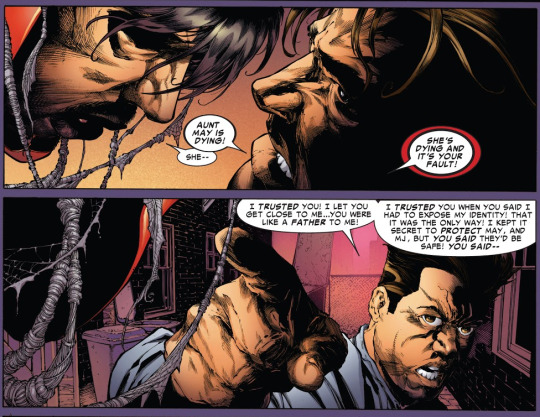
(Amazing Spider-Man #544) As you can see, it’s not a happy scene. I should note this is after Peter has broken into Tony’s home, punched Tony in the face, webbed him up, and forcibly wrenched his faceplate off, if we’re going to talk supposed filial piety. Personally I’ve never liked this line, in part because it doesn’t make sense – this is part of what I was saying about conflating different dynamics with a certain power dynamic at play and then labeling them all father/son. Peter certainly, in the events leading up to Civil War, trusted and respected Tony. He certainly let Tony lead him. There was definitely a mentor/protege thing happening, with Tony doing things like taking Peter to Washington DC with him. But to put it simply: in 616, Tony Stark is simply not old enough for Peter Parker to view him as a father figure. Like with how Peter Parker is often thought of as much younger than he is in fandom, Tony Stark seems to be thought of as older. (This is probably because of either the mustache or the MCU.) Realistically, there can’t be more than a decade between them. Older brother, if we’re going to go the familial feelings route, would be more appropriate than father. It’s also a bit ridiculous to think that Peter, who is a married adult who has lost his own child and has lived through events like his own father supposedly coming back from the dead, would be desperate for a father figure at this point in his life, especially when he wasn’t interested in having one from the superhero set in his teen years. That being said “you were like an older brother/very young uncle to me” doesn’t pack the emotional punch we’re conditioned to register with “you were like a father to me” and I suspect that’s why this line is here for the reader. Alternatively, from a characterization standpoint, if you are both very angry and very desperate and you need someone to do you a large favor even though they won’t be inclined to at that point in time, you might want to pull out the big emotional manipulation guns, and while it’s not stated as such that that’s what Peter’s doing deliberately on the page, if I wanted to reconcile the line with who Peter is in canon, I could buy it. As it is, it just kind of sits there allowing for people to claim that Peter honestly viewed Tony as like a father to him in comics by denying greater context. I’d say if the comics wanted me to buy that Peter honestly felt Tony was like a father to him, they should have done more work, but the problem is that this event happens with decades of characterization behind Peter, and looking at the big picture I just don’t see it happening even if they had put in more work.
(As a person concerned with the integrity of the overall Spider-Man character and narrative, I should say I’m very anti-father figures in Peter’s canon – not only does it erase Peter’s independence, a key component of the character, but it tends to gloss over May as Peter’s primary parental figure, and it warps the narrative around Norman’s twisted desire to have a Perfect Heir in the form of Peter. That being said, if we’re talking about father figures in Peter’s life: shortly before Peter joins the New Avengers, he encounters an older man named Ezekiel who also has spider powers and who tells Peter he can tell him much more about his own powers. Though he’s incredibly enigmatic, Peter develops a fondness for Ezekiel and grows to trust him. Then Ezekiel tries to sacrifice Peter to further fuel his own spider powers. So Peter shouldn’t have much of a taste for father figures at this point in time anyway.)
This got exceedingly long! More under the cut.
Let’s backtrack to the early days of Spider-Man. I’ve mentioned before that independence is very important to Peter, but that doesn’t mean he’s never tried to join a team. In Amazing Spider-Man #1, after all, he tried to join the Fantastic Four – until he learned they didn’t pay. Similarly, in Amazing Spider-Man Annual #3, some years later, the Avengers try to decide whether they should issue an invitation for Spider-Man to join their ranks, and ultimately decide to test him. Peter is unsure whether he really wants to join the Avengers, although he is tempted by the idea of financial security and the public’s respect. His temper’s still pretty hot at this point, and he doesn’t react all that well to the notion of being tested:
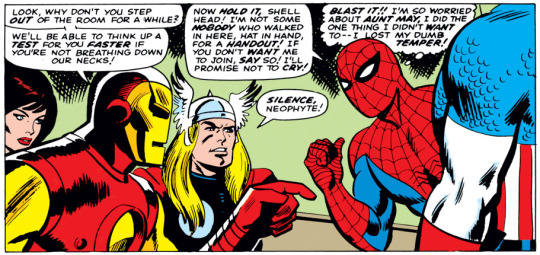
In the end he goes along with the test, passes it, but then decides to pretend like he didn’t because he didn’t care for the actual test. There’s not a whole lot of interaction between Peter and the Avengers for a while in general, beyond the occasional team-up – I’m partial to the one with Jan Van Dyne in Spectacular Spider-Man #105-106. Peter’s got a particularly vibrant supporting cast of his own, and they tend to outshine his hero teamups. I was trying to think of any Iron Man and Spider-Man content I could remember around this point and while they’re probably is some other stuff, what comes to mind is the fight from Amazing Spider-Man Annual #20:
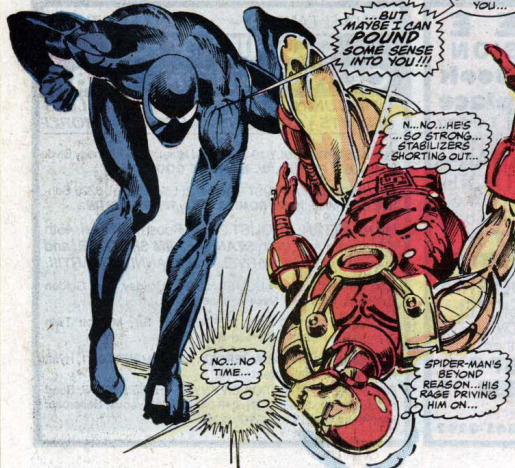
For the record, this isn’t Tony Stark, but Arno Stark, the Iron Man of the future. Peter, however, does not know that; he definitely thinks he’s punching his native Iron Man. (First law of Spider-Man’s aggression: is it an adult man? Peter is willing to punch him in the face. Captain America? Done it. His own clone? Tried to choke him out. It’s just how he is.) So nothing really is sticking out for me re: Peter and Tony specifically having any type of relationship at this point in time. Peter does at one point become a reserve Avenger, although he voices doubts about whether it’s really for him:
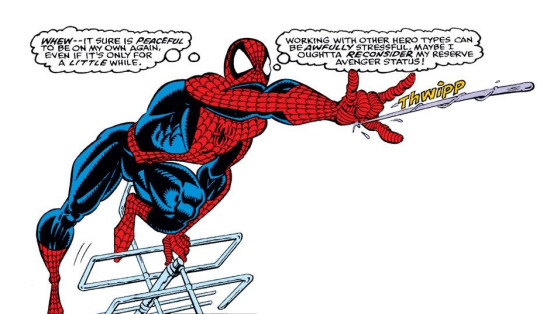
“Maybe I oughtta reconsider my reserve Avenger status!” (Amazing Spider-Man #357)
On the subject of Peter and other heroes, I like this panel from Marvel Knights Spider-Man #2, where Peter talks about how Mary Jane says he has a bad attitude around other superheroes:
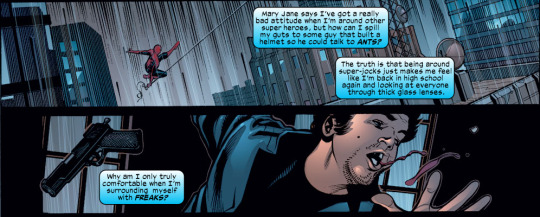
This is admittedly after he broke into Avengers Mansion ostensibly for help but just ended up fighting and arguing with them, so, she’s not wrong. (I pulled this up because I went to reread this scene because I couldn’t remember if Tony is in it, but he’s not.)
So here we are, north of the year 2000, and I would say Tony and Peter don’t really have much of a relationship. There have been times they’ve found themselves in the same battle, and I wouldn’t say either of them dislikes the other, but I don’t think they really think of each other much, either. Peter’s closest superhero connections are, at this point, as they traditionally have been, Daredevil and the Fantastic Four. So what happened?
The answer is simple. In two words: Event hell.
If you’ve spent any time in comic book fandom, you know people have Feelings about events – those big company wide storylines involving every other character and their butler that used to happen every so often and now are basically nonstop. Mostly negative feelings. Events disrupt the flow of individual books, can screw up already in progress storylines, and somebody’s always totally out of character. I’m actually not an event hater in theory; I think they can be done well. On the other hand, these ones I’m about to discuss really suck for Spider-Man, not even in terms of characterization at the time but in terms of getting the ball rolling on what I personally think led us here, to the worst Spider-Man characterization period I have ever seen reading comics. And it starts with Spider-Man becoming a real, full time Avenger.
During a story called Avengers: Disassembled, the Scarlet Witch has a breakdown and as a result kills several Avengers, including Hawkeye and Ant Man. The Avengers disband as a result. Six months later, a supervillain prison breakout brings together a collection of heroes including Captain America, Iron Man, and Spider-Man. Steve and Tony reform the Avengers, and this time invite Peter to join them. Thus, Peter becomes a headliner on the New Avengers title, along with Spider-Woman, Wolverine, and Luke Cage. I’ve said before that I don’t think Peter functions well on team books, and for one reason: he gets underused. With the New Avengers, you had your smart guy (Tony Stark) and you had your strong guys (Luke Cage and Wolverine – even though, in practice, Peter is much stronger than Luke, and has pummeled Wolverine before). He’s not even the only spider-person on the New Avengers lineup. Moreover, New Avengers was written by Bendis, and as much as it pains me to say this about the most vocal Marvel writer supporter of a canonically Jewish Peter Parker: I don’t think Bendis writes a good 616 Peter. The jokes take over. His dialogue lacks his particular 616-ish steel. In short, Bendis writes Peter with too much bark and far too little bite. It’s very noticeable during this period if you compare how Peter is written in New Avengers to how he is written in his own solo, Amazing Spider-Man, which at the time had JMS, who writes an absolutely incredible Peter, on it. Even the way JMS has Peter interact with the other Avengers in ASM is leagues ahead of Bendis on New Avengers:
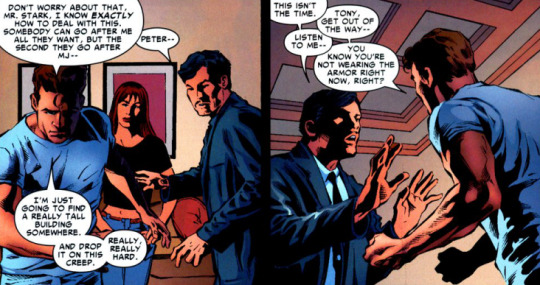
(Amazing Spider-Man #522)
A lot of stuff happens at this point that further binds Peter to the Avengers and, with the Avengers, Tony: an ex-classmate of Peter’s turns himself into a military science experiment gone wrong and burns down Peter’s apartment as well as Aunt May’s home in Queens. Tony then invites Peter, Mary Jane, and May to move into Avengers Tower, which they do. When Mary Jane is caught going into Avengers Tower late at night, a tabloid story starts circulating that she’s having an affair with Tony. Also around here Peter eats a psychic vampire, “dies”, molts, comes back, did I mention he ate a psychic vampire? But nobody ever mentions that part. And at this point, we hit the road to Civil War.
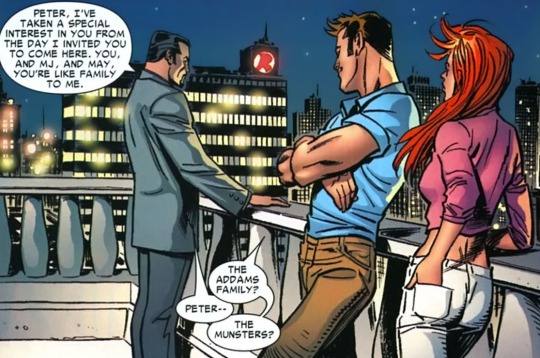
(Amazing Spider-Man #529) I mean, I think you could argue that the Avengers on the whole are like a family, but sure, whatever. I’ll be honest: I think the comic itself at this period in time uses words like “family” in order to foster a sense of a longer relationship history that doesn’t actually exist, although at this point in time Jarvis and May were dating, so I guess that could make things a little in-law-y. It’s also, in story, being used to get Peter to agree with what Tony is pitching him. Anyway, I probably don’t need to explain Civil War but the cliffnotes: big superhero-caused explosion kills a bunch of children, a law is proposed that would make superheroes register with the government the superhero community becomes divided between two sides. There’s the pro-registration side, headed by Iron Man and also by Reed Richards, which favors cooperation with the government. Then there’s the anti-registration side, headed by Captain America. Peter originally starts out on the pro-registration side, swayed by the opportunity Tony presents him to finally unmask to the public and buoyed by his claims that with this movement they can keep Peter’s family safe, which is the reason Peter has kept the mask on all these years – concern that, should he take it off, Mary Jane or May would pay the price. (Wait for it.) Through Tony’s directive, Peter unmasks himself and reveals his identity during a live television press conference. Tony had also made Peter a new, more high tech suit called the Iron Spider, which in addition to being in the Iron Man colors of red and gold also has several golden mechanical spider’s legs.
This alliance between Tony and Peter is shortlived. Peter becomes disillusioned with the pro-registration side and defects, but not before he and Tony have a showdown:
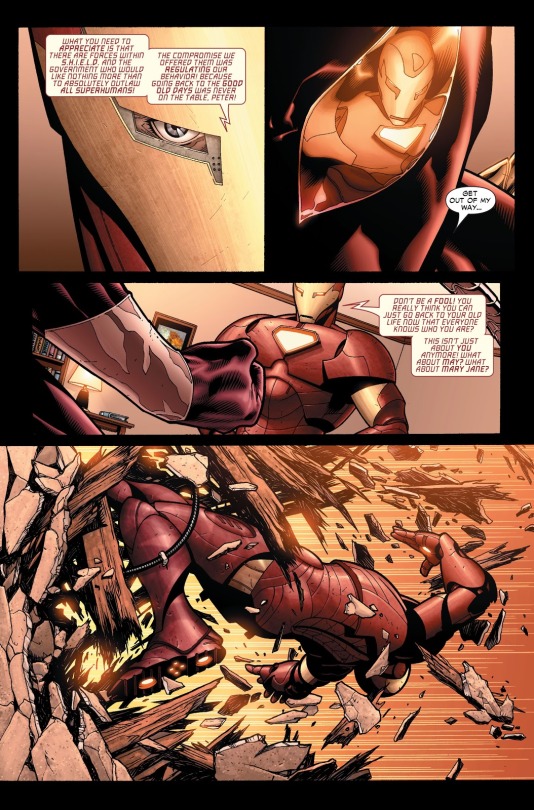
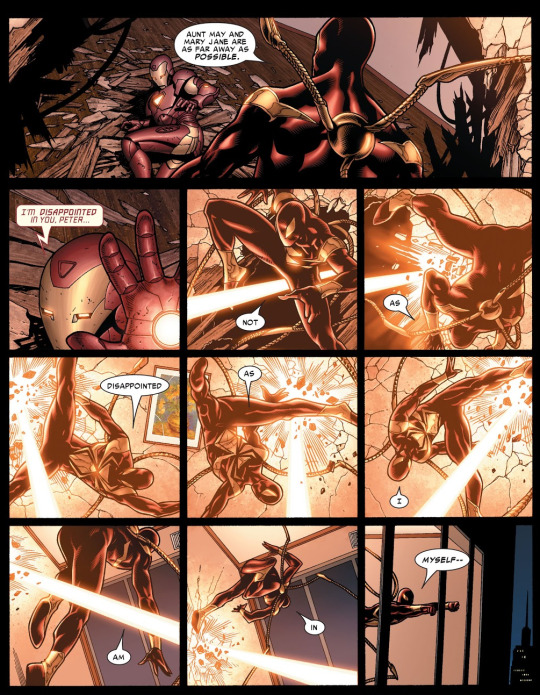
(Civil War #5) You can see how I might have issues with how the MCU has reworked this particular storyline for their movies in regards to Spider-Man’s part in it. It’s not that I think anyone, including Peter, was written to their best during Civil War, but I think it’s disingenuous to take this storyline and attempt to remake it into a father/son dynamic, not only because it severely undermines Peter’s independence, something that marked him as very original as a teenage hero.
So Peter joins the anti-registration side, there’s a big superhero fight, etc etc. Things come to a close when Captain America surrenders, and so the pro-registration side is, technically, victorious. This leaves Peter a fugitive, and Mary Jane and May, who had been hiding out in a motel, his accomplices. Their stint on the run is short; with their safety no longer protected by Peter’s secret identity, his enemies do go after his family. When an assassin targets them, Peter manages to cover Mary Jane before she’s shot – but the bullet hits May as a result. Which brings us back around to the first panel I posted, in the scene where Peter does say Tony was “like a father” to him. With May on life support in the hospital and Peter and Mary Jane unable to reveal her name, Peter goes on a rampage looking for killer. This is actually one of my favorite Spider-Man storylines, called Back in Black, and it takes place between Amazing Spider-Man #539-543, which some absolutely stunning Peter characterization. He’s also incredibly angry at both Tony and at himself during this period.
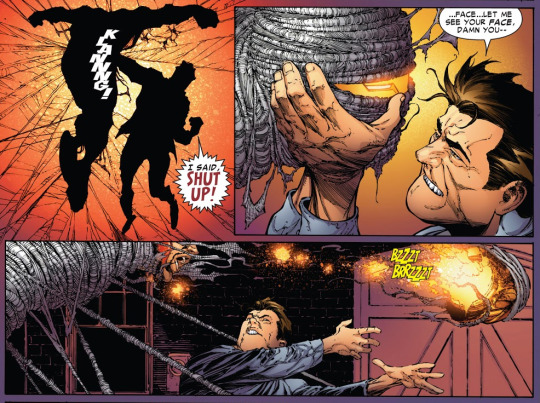
(Amazing Spider-Man #544)
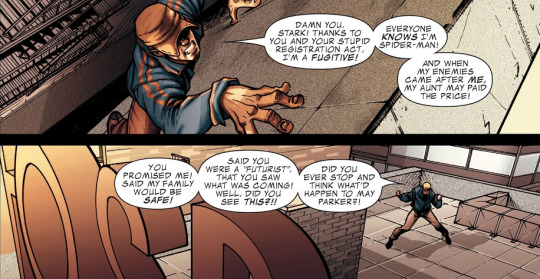

(Avengers: The Initiative #7)
At this point, Tony and Peter go separate ways. Peter sells his marriage to Mephisto for May’s life (comics), and with that deal his secret identity is restored among the general public and Peter continues with his daily life, becoming engrossed in his recently resurrected best friend Harry’s affairs and fighting crime. Tony, iirc, becomes Director of SHIELD, and later deletes his brain (comics) to keep the database containing the identities of other heroes from falling into Norman Osborn’s hands when Norman Osborn essentially takes over the government following his killing the Skrull queen during the Secret Invasion event (comics).
Since then, Peter and Tony have worked together and been on teams together (as much as I would like Peter’s Avengers status to never crop up again because the character simply wasn’t built to function on this kind of a team and nobody seems to know what to really do with him on it except have him crack jokes, with the MCU’s influence I don’t see that happening any time soon) and can get along.
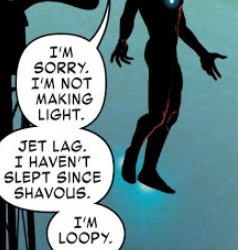
(I do not have the issue number for this panel! But it’s from a fairly recent Invincible Iron Man series.)
I wouldn’t call them close. They’re not going to be the first person either of them calls on in an emergency unless there’s something specific to one of them that the other needs. I definitely wouldn’t call them familial, or say that, in current comics canon, Peter considers Tony to be anything close to a father to him. They’ve been teammates, I’m sure they’ll be teammates again, and at best I think you could call them friends, albeit not especially close ones. And in my opinion, that’s fine; not every character has to be best friends with every other character, and sometimes superheroes are just so far apart in how they operate that they don’t mesh well together, even though they’re both smart guys. I did not mean for this post to get so long, but I hope it helped!
tl;dr: the idea that Peter Parker viewed Tony Stark as a father figure is the byproduct of a very brief period of canon that was necessary to maneuver the characters into the roles they were going to inhabit for the Civil War event – which ultimately went very badly for both of them. The dynamic – or any genuinely close relationship between them – didn’t exist before that, and did not continue to exist afterwards, and it’s my personal opinion that saying Peter looked up to Tony as a father rather than as a mentor is taking the words on the page slightly too literally.
110 notes
·
View notes
Photo
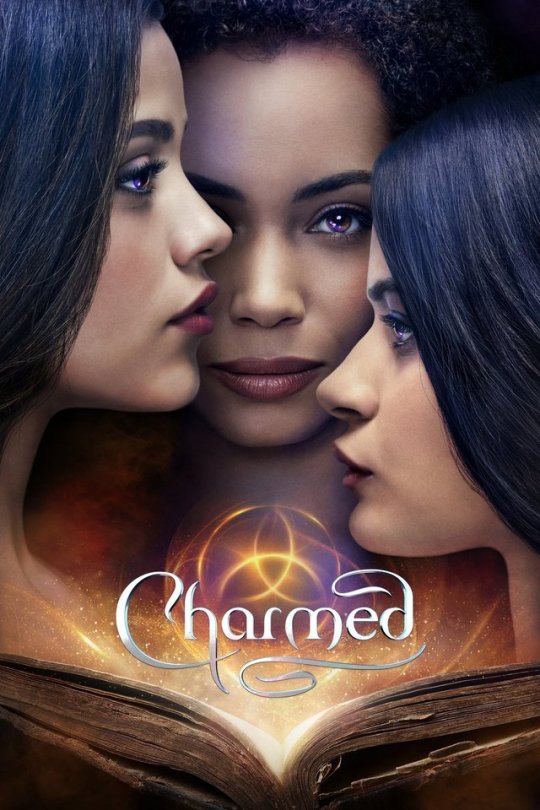
Chamrand’ded (2018-) Season 1
So, I’ve been familiar with the Charmed series, probably since the early 2000s. I’ve even read some of the comics which are set after the series finale of the TV show. It was a show that my mother enjoyed and I, and my younger sister wound up picking the fandom up, at least to a degree. I’ve probably watched the entirety of the original series’ eight season run at least six times, likely more. In terms of fandoms that I’m a part of, it’s among the earliest in my repertoire, alongside the likes of Pokemon and Yu-Gi-Oh!
Consequently, I was mildly skeptical of the reboot, but told myself that I’d watch it in its entirety out of respect for the original, no matter the quality. For the most part, I think the reboot is a mixed bag. There’s some things that it does that I like, and other choices that it makes that I really do not. The show tends to give off a feeling like the writing staff was constantly at war with itself for the duration of the season.
I’ll start off explaining the premise, and then I’ll dip into spoilers.
The show is set in 2010s US, specifically a college town in Michigan called Hilltowne. The show tends to utilize the local college as a hub for a lot of the episodes. This works decently well for the most part, but has a habit of tending to shrink the world instead of expanding it. Essentially the majority of stuff of import happens to revolve around this college.
This is a modern fantasy setting, with the main cast of three being revealed as the chosen “Charmed Ones” after their mother is killed under mysterious circumstances. They’re each granted magical powers and begin to study witchcraft, under the guidance of a guardian angel called a “whitelighter”.
The main characters are as follows:
Macy Vaughn- The oldest sister, an estranged half-sibling who is separated from the family and was raised by her father without knowledge of her mother. Upon learning of the death of the women she suspected to be her mother, she makes contact with her siblings. She’s a bit awkward, nerdy and headstrong. A lot of the time she stays more independent than her siblings. Her power is telekinesis. Of the cast, I think she’s one of the stronger performers and generally tends to have fairly strong plots.
Mel Vera- The middle sister, who despite living most of her life as the elder sibling, fits neatly into the role of the defiant middle child. An outspoken lesbian feminist with a tendency to make rash decisions. She’s the staunchest defender of personal lives away from magic in the group and tends to dislike authority. A lot of her personal plotlines tend to revolve around her romance interests with mixed effectiveness; despite this, I think her plots tend to have the most intrigue as a whole. She has the power to control time. I find her to be very derivative of Piper from the original series, without the same kind of character development that Piper had to reach the comparable mindset. She has a very genuine, close platonic relationship with the sister’s whitelighter, Harry, that develops quite organically over the course of the season, despite originally being openly hostile to him. I like this relationship a lot, despite Mel being my least favorite member of the main cast.
Maggie Vera- The youngest sister, an empath who tends to be the glue that holds the group together. She’s more bubbly and outgoing than her siblings and is a freshman in college, unsure about what she wants in life. She’s reminiscent of Phoebe from the original series, but isn’t nearly as derivative as Mel is in regards to Piper. She’s portrayed as generally capable and quite stable, yet naive. Her plots tend to revolve around a sorority at the college, and honestly they get old quite quickly as it’s quite apparent from the onset that she won’t officially join the Greek system. Her better plots tend to involve her “bad boy” significant other, Parker.
Harry Greenwood- The sister’s guardian angel, assigned by the powers that be to guide the sisters. A resurrected British man from the mid 1900s. He develops a genuine relationship with each of the sisters as a friend and confidant. He often plays the role of the comic relief and the all-knowing cast member. He winds up living in the sister’s house for the majority of the season. He’s honestly the most complicated member of the cast, despite being rather upstanding. He follows the rules, but personally isn’t infallible. He has baggage and relationships with characters in the world. Despite being sometimes played for comedy, he’s never portrayed as incompetent. I did a longer breakdown of the character in the middle of the season. His powers include, age resistance, teleportation, healing, memory manipulation, limited clairvoyance, limited illusions, limited telekinesis and self healing. My second favorite member of the cast.
Minor characters include:
Parker- Maggie’s half-demon “bad boy” boyfriend. Believed to be the host of the Source of All Evil. Actually does almost nothing wrong all season but is often discriminated against by much of the cast, both good and evil. Reminiscent of Cole from the original series.
Niko- One of Mel’s romance interests. A police officer who’s presence tends to cause a lot of issues tangential to magic. Reminiscent of Andy from the original series.
Jada- Another of Mel’s romance interests. The forbidden child of a witch and whitelighter pairing who’s affiliated with an organization called the Sarcana. A character who I quite like.
Galvin- Macy’s romance interest. A geneticist who works with her, has a family background associated with the occult.
Charity- An Elder with a history that includes Harry. Somewhat untrustworthy, but competent.
Alastair- A powerful demon who wants to bring about the apocalypse. Often portrayed as the main villain of the first season.
Spoilers from here on out.
Generally speaking the first season revolves around the sisters coming into their powers and forming a bond, particularly revolving around Macy’s relationship with her sisters. The main plot points revolve around the Sarcana coven and the assassination of Marisol Vera, the sister’s mother, Parker and the Source, and Harry and Charity’s involvement in the loss of Charity’s sister, Fiona, a powerful witch known as the Keeper of the Sacred Flame.
Generally speaking, the plot is at it’s most powerful, when pushing the third narrative, as it is the most distinctive and intriguing of the three main plots. It gets wrapped up in the second plot when Alastair needs the Sacred Flame as a pawn in order to evoke the Source of All Evil. The first plot is largely resolved in the first half of the season upon it being revealed that Charity was responsible for Marisol’s death. It begins to bleed into the third plot when the Sarcana saves Fiona from her banishment.
It is revealed that Maggie and Macy are full sisters, not half, and that Mel is the one with a different father. It is also revealed that Macy is the product of necromancy and has the potential to develop a demonic power called the evil sight at the cost of her humanity.
Parker’s full-demon brother, Hunter acts as a recurring villain over the course of the series. The brother’s father is Alastair, who also owns the lab that Macy works for.
The strengths:
The season really shines in its ability to keep things interconnected. Parker’s parents are affiliated with Macy’s work, Niko is investigating the Sarcana, the Sarcana save Fiona, Fiona is needed to summon the Source, etc.
Additionally the character interactions tend to be fairly strong. I really believe the interactions between the members of the main cast, particularly Harry and Macy’s.
The reality warping that changes the timeline in order to save Niko might not have been the easiest, or obvious solution, but it was the most interesting.
There’s an episode with Harry and Mel where they go to the UK that really cements their relationship. It’s incredibly sweet and really shows how much Harry means to the Veras and the degree to which they trust him. It ends strikingly bittersweet and is likely one of the most well-written episodes of the season.
The reveal that the Sacred Flame and the Source are ultimately the same force that seeks an ideal host is very well done.
The last two episodes of the season are extremely strong and subvert expectations, particularly the penultimate episode. Macy takes on the Source, kills Alastair, prevents the apocalypse and essentially becomes a god with the power to massively manipulate reality at will. Maggie and Mel have to rely on the bond they formed with Macy over the course of the entire season to get their sister out of the corrupting influence of absolute power.
The weaknesses:
The show has a bad habit of flip-flopping on character relationships. Harry and Charity are on and off, Mel and Niko and Jada have a back and forth relationship all season. Maggie’s pilot boyfriend is on and off. Maggie and Parker are on and off. Macy and Galvin are also on and off. I just kind of wish that the series would portray a stable relationship.
The powers of whitelighters are somewhat inconsistent. They manage to be stronger than their original series counterparts, but also weaker. Essentially it creates a situation where I wonder why the Elders don’t create an army of immortal whitelighters to support do-gooders. They make more righteous dead people every day after all.
The show has a bad habit of taking back decisions on an episode to episode basis. It’s bad enough where there are episodes where it feels like you miss an episode in-between despite watching episodes back to back. It really feels like writers conflicting over what they want on an episode-to-episode basis.
The sorority plot is stupid. I like Maggie well enough, but Lucy should have shown up consistently in the first half of the season and like twice afterward.
I feel like a lot of the “demon of the week” episodes were wasted airtime because of the pace that the series has been taking. The original series could do that in the first season because the build up to the source took almost two seasons and happened in the middle of the series. The reboot pushed the Source as the big narrative that the first season is trying to overcome. It needed every second of the airtime it had to properly build that up, and I feel like it squandered a lot of it. The finale could have been pretty incredible if they focused more on the lead up to that the entire season.
The Conclusion:
Charmed 2018 isn’t necessarily for fans of the original; it’s for people who watch the CW. There are some cute nods to the original series that you can tell were snuck in by clever writers.
Honestly, I find a lot of problems with it. The show is certainly a little more rough around the edges than the original series. Despite this, I enjoyed almost every episode. It nods to the original, but tries not to copy it and explore its own ideas that branch off from the concept.
I honestly think that if make an effort to take more risks in the second season and branch away from college setting, they can recapture some of the magic of the original.
It’s a seven out of ten from me, but it has potential, especially if they’re willing to commit in the same way that they did in the last few episodes. I’d be all too happy to see more.
#charmed#review#charmed 2018#charmed reboot#macy vaughn#mel vera#maggie vera#harry greenwood#the cw#chamrand'ded
39 notes
·
View notes
Text
So, I did a stupid thing and re-watched 9x09.
And, while I think I’ve said my peace on the mistreatment/use of one Paul Jesus Rovia (actually, no, I haven’t, I never will because my sweet badass boy is dead and it was all a waste and tragedy and I die on this hill, okay?) I do think there were a few things I wanted to make note of. Go no farther if negativity or Adaptation spoilers/content bother you.
So, here goes my long-ass post:
I said this when I first saw the opening minutes, but I’m so glad AMC took the time to show us Paul’s dead face and blood gushing out of his chest. Definitely not a sign that they’re recapping the last episode for the people that didn’t tune in to 9x08.
Also, thank you for exploiting the hell out of the “shock” of Paul’s dead body but giving the brain stab so little time it was hard to figure out what the hell he was doing. It’s really important to leave that in though or I wouldn’t have thought anyone was smart enough to do it. ‘Cause these people haven’t been doing this for ten years and you’re assuming your audience is too dumb to realize anything happens off screen.
Why would they not have a permanent guard on Negan? Like I get it, he’s been locked for years but they weren’t even doing it back when Rick was alive and I gotta tell you, that’s fucking insane. Like, we’ve literally seen that Maggie wasn’t the only one who wanted justice, what would stop someone from Oceanside agreeing with Maggie and going off to murder Negan??? (It also might have been nice to see a real situation in which Negan escapes with an act more direct than Father Gabriel being a dumbass but whatevs. (No, I don’t care if the comics did this. In comics, Maggie came after Negan after he escaped and assuming that one of the Saviors wouldn’t take the opportunity to bust him out or someone from one of the three communities he terrorized wouldn’t come to kill him is a kind of interesting dynamic - protecting everyone from Negan but also protecting Negan from everyone else. Just...more interesting.)
Negan walking around with a shovel in a house where he might meet Judith or Michonne makes me itchy. Unless he’s planting sunflowers, that shovel can stay the fuck away from my Grimes girls.
Still think you should’ve just shot him, Jude.
Okay, Negan’s speech about how Alexandria is a wonderland is fairly easy to follow. But part of what Rick was trying to teach everyone was that you need other communities, the saviors could be saved, ect. It’s definitely not like the comics in that Negan learns the lesson about civilization being “protecting the weak among us” but my biggest problem is that it’s all kind of moot in that TV!Rick was wrong? Like, the communities have nothing to do with each other, particularly Alexandria? And the Saviors are dead or gone? This is the problem when you try to shove too much into a ton of character exits and time jumps AND you try to follow comic storylines without applying the message/main character arc from it. You might think I’m over-exaggerating but it’s half the reason Negan contrasts with the Whisperers and ends up killing Alpha. He’s showing loyalty to Rick, yeah, but he also identifies the reason he is different from the Whisperers. They give no mercy to weakness and that’s what makes them animals - that’s the lesson Rick Grimes was trying to teach Negan by saving him.
(I’m just saying, Negan’s redemption arc is gonna be damn hard without Rick and Judith - who has no connection with who Negan was and is still not developed - is not a character that can show that narrative.)
I know that Eugene talking in riddles is a quirk but can someone tell the writers that some quirks are not necessary in every damn scene and are obnoxious and mood-breaking? Just let Eugene be silent and terrified please?
I should also note that I see no head wound on Paul and I am completely and utterly okay with that.
So, I have serious issues with the “Jesus chose to be out there”/ “It was bound to happen” lines. Like yes but also no? Paul might have been reckless in the past by going out but that had little to no bearing on why he was out now? He was rescuing Eugene. You were out there for the same reason, Aaron. He didn’t die on a picnic in the woods. An enemy snuck up on him. Period. And the alternative was either you or Daryl or someone else from your group dies because they get surprised by them. Or you leave Eugene to fend for himself in the barn. Which I’m all for if it meant Jesus would be around but. you know. I’m all for a grieving person thinking this way - a lesson learned in fear - but that better be resolved, if only for Aaron’s sake.
Ugh, I hate that no one’s crying over Paul but Tara putting her hand on Jesus makes me really fucking weepy. It’s almost like they could have developed this relationship to a point where it fucking mattered... -_-
10/10, Tammy is getting too much screentime and going to end up on a pike. Caling it now.
Can I ask what happened to the walkie-talkies? They were solar, right? There weren’t a limited number of them in the world, right? Why is this not still a thing? Did I miss something? That would make this Luke/Alden situation moot.
You know, if they wanted to give someone a romance with Rosita, I wouldn’t have complained if it was Tara. I never hardcore shipped it but it would’ve made more sense and this pregnancy thing wouldn’t be an issue. Or, if it was, I’d care more. lmao.
This writing is so stupidly on the nose. Gee, could Henry’s questions also be what’s going on inside Daryl’s head? ~~~The world may never know!!!!!!!~~~
Weird side note: I love The Dream Team/Jaaryl and all but I feel like the show kind of dismisses the fact that Aaron is (presumably?) a single dad? Like, I love seeing him out there and I’m all for the end of cooping up my precious gays but whats happens to Gracie if he dies? She has no other parental figure. He is the only person she has and I feel like “making it back to Gracie” is a fear no one considers, not even Aaron? Like, leaving an orphan in this world would be fucking awful, especially since her OG parents were already murdered. Just...this is why this cast of thousands doesn’t fucking work when you don’t explore the communities rather than just a couple characters.
Listen, I give Michonne her due but I firmly believe that Tara could run this place on her own. The show took all that time saying that Paul was a shitty leader that left all the time, the least you could do is point out that Tara has been handling it like a single leader this entire time. Tara handles her shit, man. TARA FOR HILLTOP 2019.
I choose to believe that Daryl going hard on Lydia is redirection of his grief and no one can stop me. Daryl Dixon repressing his feelings is pretty much a life motto for him and I both love him for it and want to hog tie him and drop him into therapy.
I’m deeply not into the Whisperers so far and am kind of glad to be out from TWD’s viewership (hopefully for good) but this reminds me of the odd hope I had watching Fear The Walking Dead. Once upon a blue moon, I’d hoped that FTWD was prequel-ing the Whisperers in TWD. Like, Madison and Alicia would end up being Alpha and “Lydia” and we’d get to really get a feel for the characters in TWD. Lame idea, I guess, but that’s what I wanted to happen. Not that FTWD has been a waste of a show that barely connects with TWD or anything. IDK, I just wanted to share that because this Whisperer storyline is going to be the worst and I honestly hope it all burns.
So, yeah, just a few notes for those who are bored enough to read them.
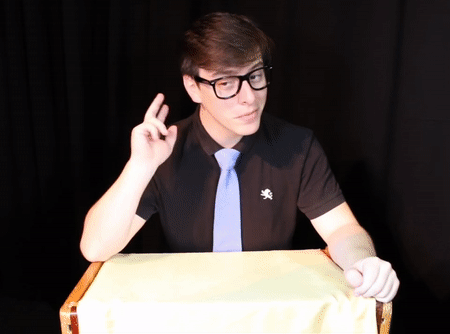
#TWD#anti-TWD#Jaaryl#Paul Rovia#Daryl Dixon#Aaron TWD#Tara Chambler#Rosita Espinosa#Rositara#Rick Grimes#Negan#The Walking Dead#Fear The Walking Dead#9x09#Adaptation#Amy rants about TWD#that could have been my url#TWD comics#The Walking Dead comics#anti-Negan
58 notes
·
View notes
Text
Amazing Spider-Man: Renew Your Vows #13-15 Thoughts
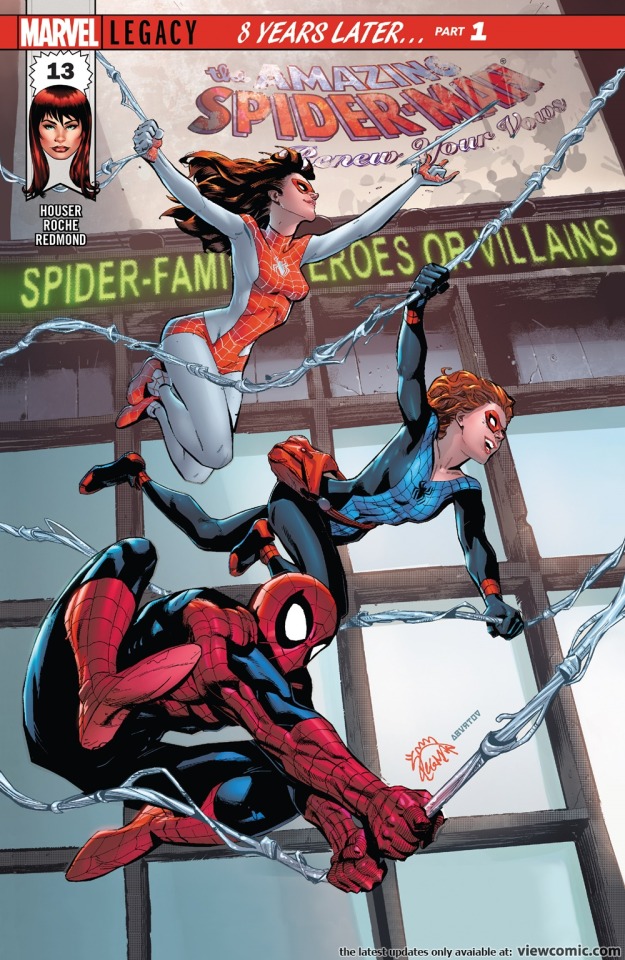
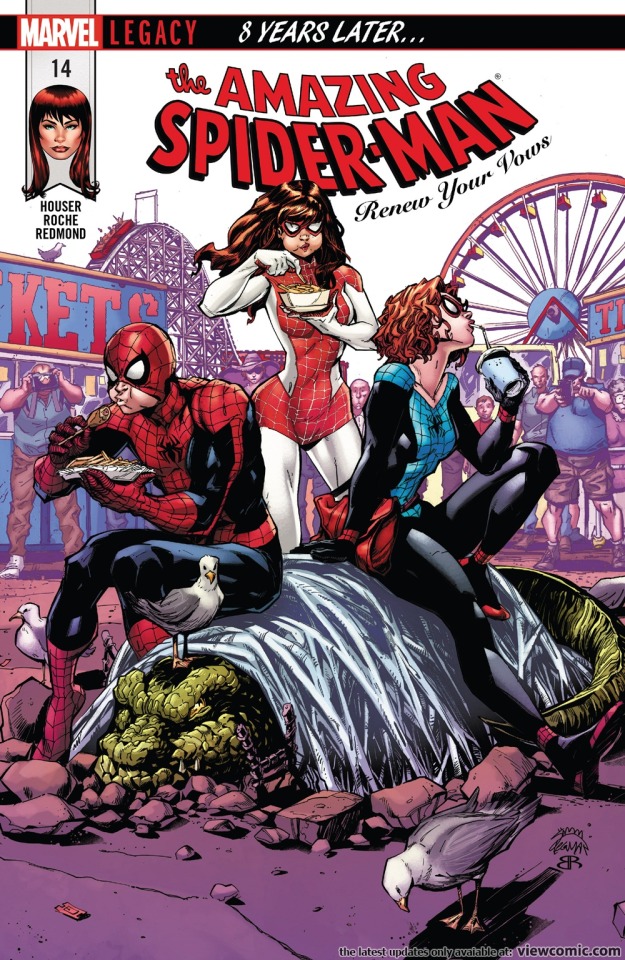
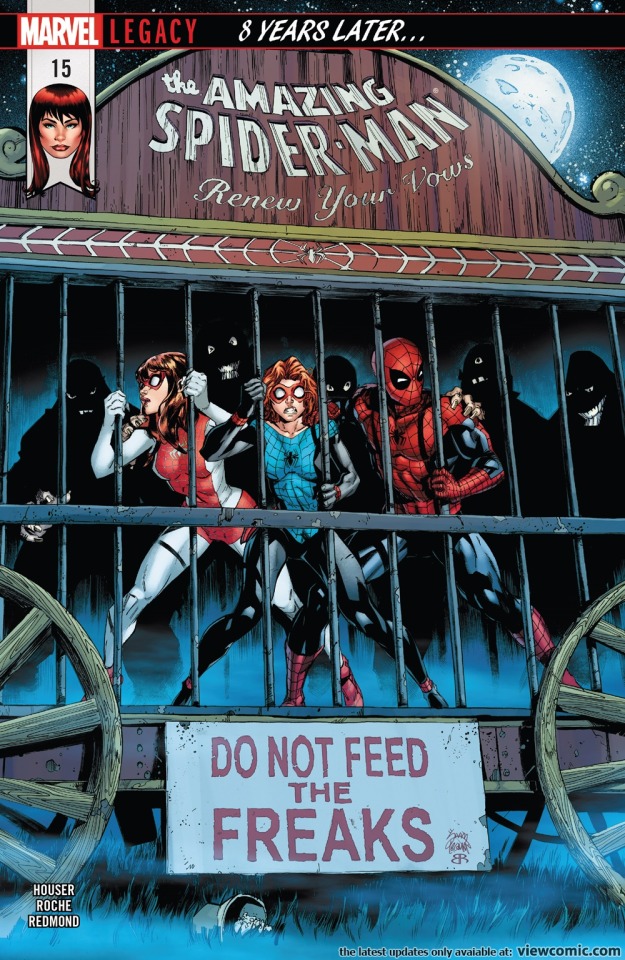
Previous thoughts here.
Yes I know I couldn’t be later to this party but I started this series so I’m going to finish giving my thoughts on it.
I tried very hard to finish Houser’s run on RYV in time to read Spider-Girls but it just didn’t happen, I only made it up until just before the penultimate arc and I didn’t write up a proper post of my thoughts back then. So I re-read her first arc today with ambitions of re-reading the next 2 stories before finally experiencing the final arc and then Spider-Girls as part of reading over most of Spider-Geddon. What you will read below are a mixture of some initial thoughts I jotted down during my first read through and my thoughts upon revisiting the story, mostly the latter.
Oh SPOILERS I guess
So let me immediately get some obvious business about Renew Your Vows’ direction from here on in. The book, sans its covers, desperately misses Stegman. It also misses Conway but that is not a condemnation of Houser at all.
Houser in this arc does a good job with the situation presented by the new direction. Whether that new direction was her idea or editorials is unknown, though likely the latter.
And really that is the absolute worst thing about this story, the new direction itself.
It isn’t so much that it is bad unto itself but it is reductive that after 12 issues building a certain status quo, the one also built by the RYV Secret Wars mini-series and was promoted by Marvel prior and during the book’s initial release that we are abruptly changing course in a big way.
The book is still unique, at least the Spider-Books on the stands (even now). But it is less unique for various reasons.
Firstly we simply have way more teen heroes than pre-teen ones. Secondly a book that pays much attention to Spider-Man’s super powered teen daughter is going to either tread upon familiar ground that Spider-Girl stood on or else it will evoke Spider-Girl in the memories of the readers. Annie unto herself innately did this anyway, but that was offset when she was much younger than Mayday.
It also throws away the world building and set up Conway enacted in his initial arc, not to mention it just fast forwards a lot of Annie’s potential character development.
Does this render Annie uninteresting or the premise less likable? No because Houser has a strong handle on both the characters and more specifically what RYV as a book is.
Perhaps this is nowhere more apparent in how she structures her opening arc. Each issue shifts the POV to one of the Parker family, starting with Peter, then handing off to MJ and concluding with Annie, exactly like Conway’s first three issues did. This is a pretty clever way of conveying to readers Houser ‘gets’ the book and reassure readers who might not be thrilled about the time skip that these are the same characters just at different points in their lives, and not even that different, sans Annie.
This is rather realistic because Peter and MJ being the adults are comparatively less likely to change all that much even within 8 years whereas Annie inevitably will drastically change going from a pre-teen to an out-and-out teenager. Fittingly Houser compensates for this by showcasing Annie’s new state of being throughout the issues that are about Peter and MJ.
On the one hand this does somewhat undermine the idea that this book is about the family collectively as opposed being about Annie or placing Annie as the ‘first among equals’ in the team dynamic of the book.
On the other hand since the book is about the Parker family it adds up that so much of Peter and MJ’s characterization will stem from their relation to Annie; your child is after all the most important thing in your life.
So we get Annie’s somewhat more salty and disconnected relationship with a Peter who is very much starting to feel his age. Which is GOOD, the obnoxious proliferation of teen Spider-Man renders almost any older portrayal interesting by default. With MJ though, Annie seems to have a much more conciliatory relationship, its more that she exhausts her mother and seems more comfortable going to her about stuff. Also as a nice way of distinguishing her from Mayday, Annie seems to share her mother’s passion for fashion which Mayday actively didn’t.
Speaking of fashion lets talk about Annie’s new costume. I’ll level you all..it looks better than her prior costume, but also less unique but neither is...all that great. I guess when you have Mayday Parker and Spider-Gwen and all the Spider-Women running around, coming up with something thing that fits the general Spider-Man motif, looks unique and also is really dynamic can be difficult. I can see where the designer was going though. Peter, MJ and Annie share the same outlines for where the chest areas of their suits turn into another colour. Peter’s is red and blue, MJ’s red and white and Annie’s is blue to black. So the ‘shape’ of the suit lends to the ‘unified family’ idea. The colours also make her stand out but maybe too much. If her parents had red chests and then she has blue it’s kinda weird. If the idea was she was trying to strike out on her own sure but I don’t get that impression at all. It is kinda cool she has MJ’s mask design but I preferred her old mask which was a compromise between her parents’ masks.
As for the main plot, I think Houser could’ve milked it much more than she did, we could’ve done with much more of the slice of life stuff and the Lizard was underutilized. There is a strong element of family defining the Lizard’s character because of his wife and child. In a book about family I presumed that was where we were going when he showed up. But...no he was just used as a monster amidst monsters.
I’m not saying Houser got the Lizard wrong just that there was an obvious and more compelling angle to exploited in the story.
The two big reveals surrounding the plot, that there is a zoo full of near-human people, and that it’s being run by Mister Sinister was also...underwhelming.
Spider-Man has the best supporting cast and rogue’s gallery within Marvel comics. Not only does this mean we don’t really need to see non-Spider-Man characters (like the X-Men) pop up, it’s frankly less interesting when we do because they have little-no history with Spider-Man or his family.
It was also just kind of a reveal that didn’t land for me, I could not care at all.
Mister Sinister was a little different because, I like Sinister as a bad guy I really do...but not in Spider-Man. I get including and referencing the X-Men in this arc because for some reason they were practically supporting cast members in Conway’s run, so paying that off makes sense. But why double down upon it with a major X-villain? Like the Jackal, even Doc Ock, either of them would be more fitting villains in this type of story or where the series implies it will be leading onto later.
It didn’t help that when we met Sinister initially in disguise there was just very little gravitas to him because he obviously looked like a no-name 18th century circus reject.
The ending let this arc down is what I guess I’m getting at. Issue #13 and #14 had pretty nice hooks for the next issues.
What was a letdown throughout though was the action sequences. They were pretty pedestrian along with the art overall. Like it wasn’t BAD per se (except Peter’s eyebrows...wtf?), it just was a major step down from Stegman and even Stockman, the latter of whom I think the artwork was chosen to be more like. It had this softer undefined element to it, and not in a Romita Senior way.
Returning to the character though, I do commend Houser for having a good grip on everyone and efficiently finding a way to distinguish them from one another across the three issues.
Peter dealing with being older and now decidedly less cool and engaging to his teen daughter is delightful..even if at points it feels like the narrative is kind of undermining him, especially in the Wolverine scene at the start of the story...still Dad Joke Spider-Man is awesome. Even more awesome is how together he over all is. This isn’t an angst ridden Peter Parker or one who is introspectively questioning himself. Throughout the story he gives off this air of relaxed experience, like he knows what he’s doing and can tell the situation allows for a few jokes and a bit of fun. Refrshingly he doesn’t angst about not pursuing the bad guy at all.
Moving on, Houser probably dissing MJ’s place in the Iron books at the time with her reprimanding and smack down of Tony was awesome (although I don’t get why she was so miffed at him). Her playing Spider-Mom, and more poignantly dejectedly owning it, was hilarious. Her sense of exhaustion is relatable whether you’ve been a parent or just been around them. It very much taps into Conway’s characterization of MJ as a juggler
Houser’s Annie also shines. She is believably an older version of the kid Annie we once knew but also stands firmly as her own person. She’s somewhat embarrassed by her Dad and wants greater independence. She loves being a superhero, but is (also in contrast to Mayday) a more of a punch first think later kind of gal with a dash of overconfidence.
She is untrustworthy of the Lizard and more gung ho, whilst MJ and especially Peter (to my delight) are both more reigned in and trusting.
This is nicely explored in the family’s single page descent underground where Houser gives Peter a really great speech about what it means for Annie to accept the great responsibility of the mask, that it might mean trusting those who are not trustworthy for the sake of others. This serves to nicely develop Annie as its her Dad treating her as more of an adult for the first time. the fact that it’s her Dad, the iconic hero Spider-Man conveying this wisedom onto her is very fitting and helps further legitimize Annie as a Spider-Hero to the readers of RYV and legitimize the new teen version to those jumping aboard at this point.
Not to be outdone, MJ an issue earlier got a wonderful piece of dialogue about how in spite of how their lives might be messed up by being heroes she and her family will still endeavour to make plans and live normal lives. Which is both a wonderfully inspiring heroic statement but also so very true to who she and Peter are as people.
Some other small points:
I saw Carrion amidst Sinister’s menagerie
The underground nature of the story’s conclusion nicely evokes the first arc by Conway
Overall Houser sells/sold you on the new dynamic with this arc as much as I preferred the older one and wish they hadn’t changed.
B+
#RYV Thoughts#Jody Houser#Nick Roche#Annie May Parker#Spiderling#spinneret#renew your vows#Amazing Spider-Man: Renew Your Vows#Spider-Man: Renew Your Vows#mary jane watson#Mary jane watson Parker#MJ Watson#mjwatsonedit#Spider-Man#Peter Parker
33 notes
·
View notes
Text
Marvel Cinematic Universe: Guardians of the Galaxy Vol. 2 (2017)

Does it pass the Bechdel Test?
Yes, six times.
How many female characters (with names and lines) are there?
Five (35.71% of cast).
How many male characters (with names and lines) are there?
Nine.
Positive Content Rating:
Three.
General Film Quality:
The pacing is a disaster, the story is weak, and if the style of comedy isn’t to your taste it can be very grating, but the central theme has at least some glimmers of genuine quality.
MORE INFO (and potential spoilers) UNDER THE CUT:
Passing the Bechdel:
Gamora passes with Ayesha. Nebula and Gamora conflict. Gamora asks Mantis about her empathic abilities. Gamora passes with Mantis. Gamora and Nebula fight. Gamora confronts Mantis.
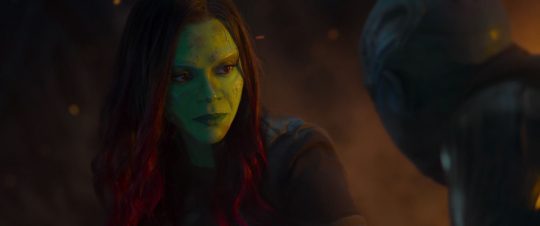
Female characters:
Meredith Quill.
Gamora.
Ayesha.
Nebula.
Mantis.
Male characters:
Ego.
Peter Quill.
Drax.
Rocket.
Groot.
Stakar Ogord.
Yondu Udonta.
Taserface.
Kraglin.
OTHER NOTES:
Nice of Ayesha to randomly exposition on the way her people are created, even though it is not relevant to the plot or anything else at all.
Gold Ben Browder is the highlight of this film. Because it’s Ben Browder. And he’s gold.
The immature escape-from-the-Sovereign-fleet bickering between Quill and Rocket (with chimes in from Drax) while Gamora is the Token Female and Wet Blanket is just...chafing a really tedious cliche.
Drax hanging out the back of the ship as they’re crashing is one of those things where the characters are so unrealistically indestructible it makes it hard to engage with the idea that they’re ever in real danger. That happens a lot in this movie.
Android prostitutes. Sigh.
Daddy issues. Never seen that done before. Thrilling.
First time I saw this movie I thought it was a weird choice to make the raccoon the main character of the B plot, but to be honest, Rocket is the best of the Guardian characters and front-lining him is one of the better choices of the film.

The whole idea that Quill was able to hold an Infinity Stone because he’s half god really fucks over the whole ‘the Guardians teamed up to withstand the power of the stone together’ thing. Like, nevermind, that whole climactic moment from the first film didn’t mean shit, Quill is a half-god.
Kraglin thinks that Nebula would be the type to buy a pretty necklace or a nice hat and this is just one of those weak, gender-stereotyped jokes that makes me annoyed at the lack of awareness in writing ALIEN CULTURES and also just, like, the basic ability to comprehend character personalities. I complained about this when I reviewed the first Guardians film, but honestly. Whether in throwaway lines or entire plot arcs, these movies are rife with gendered writing, more than any other films in the MCU so far, and that doesn’t make a lick of sense. ALIEN. CULTURES. GUYS.
He’s playing catch with his dad and MY GOD, glowy god power should not be this trite and boring.
This script has a bad habit of over-playing its jokes. You gotta know when to stop, y’all.
URRRGGH, the momentum of this movie straight-up dies every time the plot shifts back to Quill and his dull daddy issues. The imbalance between the A and B plots is staggering.
Gamora and Nebula’s conflict and eventual reconciliation is one of those few quality emotional beats in this movie; the recognition that the hate that has been engendered between them comes from the abuse they suffered at Thanos’ hands, and that they are both victims of him, not of one another. It’s a kind of insightfulness that is surprising, considering the cliches and under-developed arcs that populate the rest of the film.
Credit where it’s due for genuinely funny jokes that they don’t overplay: the Mary Poppins gag, Drax’s nipples, the giant Pac-Man.

Yondu deserved a better movie, man. I don’t know why the rest of this story is such a mess when the little slivers it gets right are so spot-on.
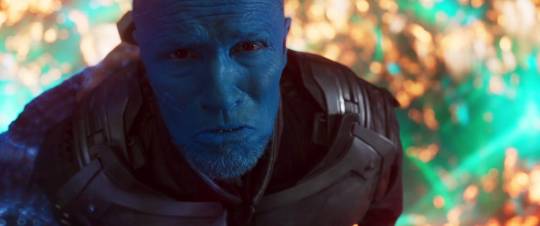
So, daddy issues. It’s one of the most overdone cliches in the history of storytelling, typically stemming from a very performative-masculine root (the father as the only/most important role model for his son, specifically in modelling manliness), and/or the old-fashioned patriarchal idea of the son as his father’s heir (and the idea that that makes the relationship between a father and son more profound than any other). Men love to write stories about their daddy issues, despite the fact that they’re rarely interesting or unusual or different to the billion other daddy issues stories that have already been told. As such, the fact that this movie is built around that same-old-same cliche is a fact distinctly to its detriment; that said, it’s also the one well from which it draws any spark of meaningful inspiration.
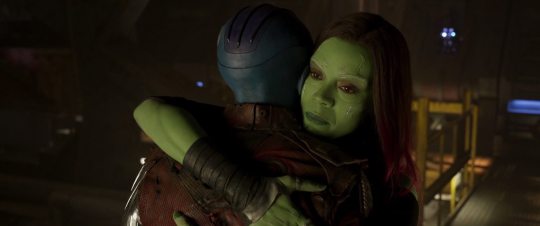
The dot points above have already made it clear to which sparks of inspiration I refer; the Daddy Issues threads with Gamora and Nebula and their abusive father Thanos, and Quill’s realisation of the way Yondu ended up filling the fatherhood role in his life. Gamora and Nebula’s Daddy Issues are automatically fresher than the average on account of them not being dudes (Ant-Man had the same thing going for it, though that movie made a much greater strength out of it); that said, the fact that Thanos’ terrible parenting forms the backbone of the two sisters’ conflict and eventual unification is not what makes that slice of the plot work: it’s the sibling bonding, not the Daddy Issues. The sibling bonding is where the fire’s really at (again, enriched by the fact that the characters are female; funny how the under-representation of women (or any group) in media can make even small amounts of representation seem impressive just for existing), but unfortunately, that bond is pared down to the absolute minimum number of scenes possible for functionality as a subplot, and therefore we never really get to enjoy what it offers so much as we kinda point and wave at it as it goes by. Yondu gets a bit more play, both through the character’s own ruminations on his life/personality/relationships while hanging in the B plot with Rocket, and through Quill’s Daddy Issues whining in the A plot to which Yondu’s relevance provides the only saving grace. Still, Yondu’s place in the plot and in Quill’s life only gains narrative weight in the final act, leading to a cathartic denouement for the character, but not for the film itself. The bloated emptiness of the A plot with Ego is something which Yondu’s meaningful sendoff cannot retroactively undo.
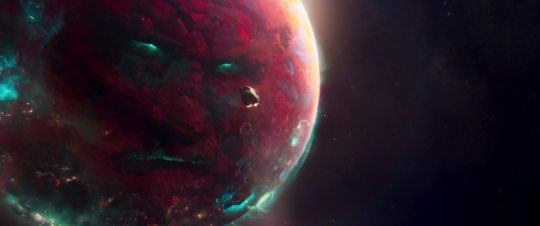
I’m...trying to figure out if I have anything nice to say at all regarding Ego and all that he entails, but I’m not coming up with anything. A godlike character who is also kinda-sorta a literal planet should not be so devoid of interesting factors, and yet, here we are. With every overdone boring Daddy Issues cliche in the book, played straight. We’ve got ‘I never knew my father!’ abandonment-resentment! We’ve got father-son bonding (heavy Americana edition)! We’ve got the heir-to-my-empire, follow-in-my-footsteps schtick! If it’s overdone and boring, we’ve got it! The fancy special effects visuals can’t make up for the total absence of compelling plot (the first movie in the franchise also made that mistake, though it at least faked it on the plot front a little better), and the shapelessness of the story on Ego prior to the reveal wreaks havoc on the pacing of the movie; where the B plot has trajectory from the jump, the A plot just kinda wanders around, having nothing new or interesting to do or say, nor even any thoughtful ways to bring itself around to that aforementioned reveal (as with the first film, things just kind of conveniently happen and characters go places and say things at the opportune times; nothing flows naturally from one event to the next, cause and effect style. I am baffled that people think James Gunn knows how to plot).
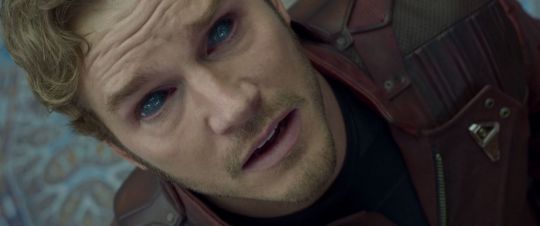
Speaking of characters going places and saying things, this film also does a very poor job of utilising its cast in a meaningful way, which makes it kinda embarrassing that it’s called Guardians of the Galaxy as if the whole team actually matters. Much like in the first film, Drax is just an extra without any real plot or purpose of his own, no narrative or character arc to speak of beyond being a total douche to the new female character on the block, Mantis (the fact that the movie uses Mantis as a punching bag and laughing stock for the so-called good guys is among its more tasteless sins). Groot, meanwhile, was already more of a gimmick than a character, but that’s up to eleven now, and like Drax he could pretty easily be excised from the story without lasting effect. Gamora’s interactions with Nebula are really her only good fodder; her tangential attachment to Quill is incidental and has no personal relevance for Gamora, she’s just providing someone for Quill to bounce his inane misogyny off, because how would we recognise him without it? Quill being the centre of this plot does at least make sense this time (sleeping pill that it is), unlike in the first film where he was frankly pointless to the story; nevertheless, the drudging Daddy Issues cliche of this movie fails to make anything insightful or impactful out of Quill’s experiences. As noted earlier, Rocket is, bizarrely, the only character who feels like his story matters, and it’s his and Yondu’s character exploration that wins the prize as the highlight of an overall weak, spectacle-laden film that thinks it’s much funnier than it really is.
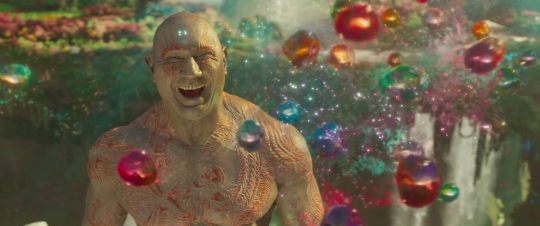
It’s no secret at this point that I don’t care for the Guardians franchise, but it isn’t complete absent glimmers of good promise and creative storytelling. Unfortunately, it’s also largely overrun with lazy plotting and vaguely-connected strings of shenanigans that prioritise rapidly-staling comedic beats over any semblance of narrative cohesion or character development. A rocking soundtrack and a smattering of toilet humour does not a worthy film make; it’s not like I’m going in looking for some high-brow drama, I just prefer my entertainment to hang together a little better than this does, and it surprises me a bit to hear people sing the praises of something so very, very messy. Whatever. It did its job for Marvel’s bottom line, so I don’t expect they’ll cook up any quality improvements for the third film of the franchise, when it comes. I sure would be glad to be wrong, though. There’s so much potential they’re wasting here.

#Guardians of the Galaxy Vol. 2#Marvel Cinematic Universe#MCU#Bechdel Test#female representation#Guardians of the Galaxy
3 notes
·
View notes
Photo

Black Bolt #6 Review
spoilers spoilers spoilers spoilers spoilers spoilers spoilers spoilers spoilers
The first arc of Saladin Ahmed and Christian Ward’s tremendous Black Bolt comes to its conclusion and it’s an absolute triumph. Full review following the jump.
The story up to this point has seen Black Bolt stranded in a mysterious space prison, lorded over by a cruel Jailer who seemed to posses the powers of a god. Black Bolt had made allies among his fellow inmates, including Crusher Creel, The Absorbing Man as well as a Skrull pirate queen named Ravva, Molyb the Metal Master and a telepathic alien child known only as ‘Blinky.’ Black Bolt had managed to escape this terrible prison with the aide of his teleporting dog, Lockjaw, and the one-time king of The Inhumans chose to return to the jail to free his friends and put an end to the Jailer’s sadistic reign.
As Black Bolt and his comrades ventured deeper into the prison, fending off its security drones, they came to learn that The Jailer was once an inmate himself. He is an ancient Inhuman who possesses terrible psychic powers that made him like a vampire needing to feed off of the emotional suffering of others. This being had been captured and incarcerated in the space prison, yet he was somehow able to free himself and destroy his jailers, taking their place as the new warden and using the prison as a veritable buffet wherein a constant stream of new inmates quenched his insatiable hunger for suffering.

This Jailer has long since lost his physical form and now exists as a physic energy bound only to the last remnants of his body dissected and incased in jars and tubes. It would appear that The Jailer is a master of psychic illusion and the various deaths and sufferings that Black Bolt and the others have endured may have all just been telepathic tricks meant to provoke anguish for the Jailer to feed on.
Black Bolt and the others are intent on ending the Jailer but this monster is not going down without a fight. He has manifested ghosts from the minds of his attackers, acting to cripple them with terrible feelings of guilt and sadness. Black Bolt has used his powers of molecular manipulation to project a protective shield around him and his comrades, neutralizing the power dampeners and offering others full use of their super powers.

Blinky’s telepathy allows her to see through the Jailer’s illusions and she encourages the others that these ghost are not real. Black Bolt, Creel and Ravva are able to see through the illusion, but Molyb is not. He has been in this jail much longer than the others, his guilt is too deeply seated and he cannot disabuse himself of the Jailer’s psychic manipulation. He begins to turn on the others and Ravva sees no other choice than to stop Molyb herself, stabbing him through the back with her sword.

The others are shocked by the Skrull’s gruesome resolve, but there isn’t time to pause nor grieve; they must move forward. They travel deeper into the heart of the prison where The Jailer lays in wait. They engage him and Jailer cuts loose with the full extent of his powers. This power creates an impenetrable shield and it take all that Black Bolt has to maintain his own shield and protect the others.

Creel comes up with a last ditch plan and instructs Black Bolt to direct his sonic powers onto him. Creel can absorb and take on the properties of anything he touches. He can take on the properties of metal or rubber and can also take on the properties of energy. Black Bolt screams, opening up the upper limits of his sonic powers and Creel absorbs the energy in full, become a being of pure molecular disruption.

He knows that he can only contain this energy for a moment, that it will result in his own destruction and he asks that Black Bolt seek out his wife and let her know that he never abandoned her and will always love her. And with this, Creel leaps headfirst into the Jailer’s being resulting in a terrible explosion. Black Bolt uses everything he has to protect himself and the others from the detonation.

He awakes some time later and knows that the terror has past. The Jailer has been killed and the prison destroyed; what is left of the inmates have all fled. It turns out that Molyb’s alien physiology allowed him to survive being stabbed and he, Blinky and Ravva help Black Bot to his feet. The happiness of their reunion marred by the sad truth that their freedom has come at the expense of Creel’s sacrifice.

Molyb and Ravva depart, returning to the lives they had prior to their incarceration, leaving Black Bolt and Blinky behind. The effort Black Bolt had exerted in the battle with The Jailer has taken a drastic tole on his powers. These powers have been halved, perhaps permanently, and Black Bolt can sense that his voice no longer possesses the highly destructive properties it once had. Before Black Bolt can despair in this realization however he is overjoyed by the sudden reappearance of his loyal fried, Lockjaw.

Lockjaw can take Black Bolt home and Blinky is ready to say goodbye, ladened that she has no where herself to go. She asks if Black Bolt might take her with him. It is a lot to ask and Black Bolt is taken aback by the request. He has been such a terrible father to his own son, Ahura, the prospect of taking on this duty for Blinky seems to fill him with apprehension. Yet he seems to no there is no choice to be made. Of course he will take Blinky with him.

Black Bolt is not the same man who first entered this prison; he has been changed by the experience. The old Black Bolt might have turned his back on Blinky, thinking only of the needs of his own people. But he is no longer that man and he pauses for only a moment before accepting Blinky into his care. And it is here on this warm and optimistic note that the first (hopefully the first of many) arc of Ahmed and Ward’s series comes to an end.

What a ride! This six issue arc embodies everything I love about comics in general and The Inhumans in particular. The ideas are huge and wild and fun, with the high concept weirdness ballasted in deep, fully fleshed out character studies. The story and art is synched up hand-in-glove with both sides of the comic lining up so seamlessly that the narrative and art finish each others sentences. One would think Ahmed and Ward had been working together for years.
Although Black Bolt was advertised as a solo book, the extended cast that Ahmed and Ward created played a pivotal role in the first arc. Black Bolt has felt more like a team book with the other cast members (especially Creel and Blinky) being just as important to the story as Black Bolt himself. And I feel that this was a very good decision. Black Bolt is a festinating character in the context of The Inhumans as a whole, but has been a bit shallow in terms of standing on his own. His inability to speak coupled with the cold, withholding fashion in which he comported himself has left Black Bolt as someone who is quite hard to relate to. Ahmed and Ward chose to reintroduce Black Bolt to us by way of his relationships to the extended cast. The juxtaposition has generated a new avenue for exploring who Black Bolt is and how his feelings and attitudes have been shaped by all that he has gone through. The interplay between Black Bolt and the rest of the cast allows us to get to know him in a fashion that hasn’t been done before and has made Black Bolt a much more fully realized and dimensional character.

That street has gone both ways in terms of both Blinky and Crusher Creel. Creel in particular was made into a wonderfully sympathetic character. It was sad to see him die in the end, although I doubt this ‘death’ will prove a permanent condition. Creel has survived similar such deaths in the past and it likely won’t be too long before The Absorbing Man reappears somewhere else. Still, it’s sad to see him die here just in that Ahmed does such a great job writing him and I’m left wanting more.
Blinky is someone we will likely get to learn more about in the next story. So far she is just great fun and absolutely adorable. Putting Black Bolt in a position where he is forth to act in a parental fashion was both an unexpected and hugely satisfying decision.

Alright! no more gushing! I loved this book and loved this arc. I’m psyched that the trade paperback will likely be released around the holidays; it’s going to be a gift I plan on giving to all my friends and family who enjoy comics and science fiction.
Five out of Five Lockjaws for the issue...

...and an impossible Six out of Five Lockjaws for the six-issue arc itself!

9 notes
·
View notes
Note
I sometimes wish GRRM didn't create this huge dichotomy/rivalry between the Stark sisters, bc really what was the point?? If Robb could overlook Jon's bastardy and be best friends with him, and Jon could push aside his insecurities and love Robb in return, you'd think surely the sisters could overcome their differences. Also, IMO it's quite baffling how in such a toxic patriarchal society, most of the men in Arya's life support her, yet the women do not...
Hey Anonny!
So, in all the time I have spent obsessing over the Stark sisters in general, and this issue specifically, here is the conclusion I finally came to: The sewing scene in AGoT Arya I prrrooobably should not have been the first big, up close and personal impression we got of Arya and Sansa, or of their interactions and relationship.
The chapter starts off with Sansa and Arya doing needlework with Septa Mordane, Myrcella, ect. ect. Right off the bat you can perceive the differences between Sansa and Arya, as well as Arya’s feelings of insecurity and how she’s been criticized and made to feel inferior:
Arya’s stitches were crooked again. She frowned down at them with dismay and glanced over to where her sister Sansa sat among the other girls. Sansa’s needlework was exquisite. Everyone said so. “Sansa’s work is as pretty as she is,” Septa Mordane told their lady mother once. “She has such fine, delicate hands.” When Lady Catelyn had asked about Arya, the septa had sniffed. “Arya has the hands of a blacksmith.”
First impressions are so powerful; I mean, they are basically pre-conditioning. I feel like when you look at the sewing scene objectively and out of context, its not really even that big of a deal. But then when you put the scene into its placement and context in the story, it was the FIRST THING we see about not only Arya’s POV but also of her relationship with and perception of Sansa. In that way I think it basically set the bar for both those characters.
I guess it’s ~possible~ that GRRM was trying to use that scene to set up a big dichotomy/rivalry between Sansa and Arya with the aim of making readers love Ary and hate Sansa, sure. Anythings ~possible~ in a world where dragons and ice zombies exist and one dude supposedly banged a bear. But honestly I feel like its highly unlikely. After thinking about it, here’s what I feel like might be more likely: he probably had no intention for it to be THIS big of a deal and would be mind blown at how much people focus on this. At this point I truly and firmly believe that we have analyzed, discussed, and discoursed over this topic forwards, backwards, and upside down to an extent that GRRM probably never intended or predicted.
I am pretty sure the perceived differences, and narrative tension, between Sansa and Arya early in the series was basically meant to be a contrasting highlight to how much they would change throughout the story and also how they would realize their differences weren’t really all that important once they were reunited. They would be older and more mature; they would be able to appreciate that they were stronger together, stronger united, stronger as a Pack. They would realize that their father was right about them: “You may be as different as the sun and the moon, but the same blood flows through both your hearts. You need her, as she needs you…” Both sisters are both put through so much in the series, both mentally and physically. They go through so many horrible things and so much trauma and are forced to grow up so quickly. There are so many causes of tensions and conflict and character development in both of their arcs. They form so many bonds and relationships with other characters, some of which are downright toxic and dangerous for the girls. And yet, here we are, continuing to fixate on this one relationship and beat this discourse to death with any blunt object we can find.
It’s interesting though, that you brought up the lack of this particular dynamic between Jon and Robb. Its definitely true that there isn’t a similar tension in Jon and Robb’s relationship, but I do see it play a hugely significant part in Jon’s relationship with Catelyn. In Jon’s very first POV, the first person impression we have from him, he brings up Cat and her perceived opinion and treatment of him:
Benjen Stark gave Jon a long look. “Don’t you usually eat at table with your brothers?”“Most times,” Jon answered in a flat voice. “But tonight Lady Stark thought it might give insult to the royal family to seat a bastard among them.”
This makes us sad for and sympathize with Jon of course, its meant to and who wouldn’t. Every time I read that part I want to wrap him up in a big hug of blankets and rainbows and happiness and tell him he is LOVED. But along with that, it also inherently makes us judge Cat and her treatment of Jon as well.
Arya and Jon are both such classically easy-to-love characters who fall into so many popular beloved tropes. We’re conditioned to like them and sympathize with them from the start, and to dislike anyone they don’t like or who they perceive to not like them or who hurt them. And as a result, the people they don’t like never have a fair chance with most readers. The other aspect of it in this particular though, is that being “odd ones out” is such an important part of Jon and Arya’s bond. But for people to be “outsiders” there always has to be an “in group” for them to be outside of; there have to be characters who are being exclusionary, there have to be characters who are acting hurtful. I think that Jon and Arya’s relationship is one of the most important ones in the series by far. It’s just really unfortunate a) that they were made to feel like outsiders in the first place, and b) that this one particular “outsiders” element seems to have come at the hands of characters like Sansa and Catelyn, who are NOT classically easy-to-love sort of characters and who, through these interactions, are additionally cast in a not-so-great light that can be hard for their characters to overcome in the minds and subconsciouses the audience.
As far as your comment on how the men in Arya’s life support her and the women don’t- I think its probably more that she’s only 9, she’s just a kid, and they don’t see the harm in letting her be a kid right now. Especially in regards to Ned, I don’t think any parent ever plans on running out of time to teach their children things or for their children to grow up. He probably counted on having all the time in the world for him and Cat to watch Arya grow up and guide her into womanhood… And now I’m going to go cry.
#thanks anon!#alys answers#got for ts#asoiaf for ts#sansa stark#arya stark#jon snow#catelyn stark#agot#Anonymous#alys meta
36 notes
·
View notes